No Cardio-Metabolic Benefits From Plant-Based Meat Analogs
|
04/16/2024 |
|
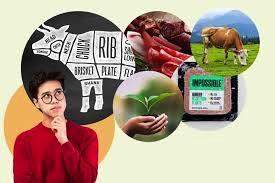 In an eight-week longitudinal study conducted in Singapore, no beneficial effect could be attributed to substitution of an omnivorous animal-based meat diet with plant-based meat analogues. The study was conducted over eight weeks, and involved 82 participants with an elevated risk of diabetes. In an eight-week longitudinal study conducted in Singapore, no beneficial effect could be attributed to substitution of an omnivorous animal-based meat diet with plant-based meat analogues. The study was conducted over eight weeks, and involved 82 participants with an elevated risk of diabetes.
The trial demonstrated a significant interaction (time x treatment) for dietary trans-fat that was increased with the animal-based diet. In contrast, fiber, sodium and potassium all increased with the plant-based meat analog diet. Glycemic homeostasis was better regulated in the subjects consuming the animal-based meat diet. Substitution of plant-based meat analogues in the diet had no effect on lipoprotein profile including low-density lipoproteins and cholesterol.
Health claims made by proponents of plant-based meat analogs will require careful review by health professionals, the FDA and health conscious consumers. This is especially important with respect to labels and advertising claims.
|
E.U. Broiler Production in 2024
|
04/13/2024 |
|
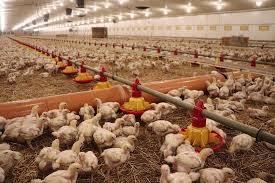 According to USDA-FAS GAIN Report E42024-06 released on February 27th, projected broiler production among E.U. nations will increase by 0.8 percent from calendar 2023 to 11.11 million metric tons. Imports will attain 750,000 metric tons representing 6.8 percent of production. Exports will rise to 1.67 million metric tons or 15 percent of production. Net exports will therefore represent 8.2 percent of production at 0.92 million metric tons. Given an E.U. population of 450 million, projected per capita consumption will amount to 22.6 kg (49.8 lb.) approximately half that of U.S. consumption. According to USDA-FAS GAIN Report E42024-06 released on February 27th, projected broiler production among E.U. nations will increase by 0.8 percent from calendar 2023 to 11.11 million metric tons. Imports will attain 750,000 metric tons representing 6.8 percent of production. Exports will rise to 1.67 million metric tons or 15 percent of production. Net exports will therefore represent 8.2 percent of production at 0.92 million metric tons. Given an E.U. population of 450 million, projected per capita consumption will amount to 22.6 kg (49.8 lb.) approximately half that of U.S. consumption.
Restraints to output include highly pathogenic avian influenza that has persisted since 2021. Other hindrances include environmental restraints with limits on nitrogen emissions in the Netherlands and Belgium. Although the price of ingredients has declined, production costs in France remain high and are limiting output. Economists forecast increase demand for chicken based on the competitive price and availability of pork and beef.

A major issue of contention is the importation of chicken from Ukraine without duty following E.U. regulation 2023/1077. Poland, the largest producer in the E.U. has requested limits on the importation of broiler products from their eastern neighbor.
Although the U.K. represents a strong market for E.U. chicken, supplied mainly from Poland and Germany, there is now increased supply from Brazil, Thailand and Ukraine. Competition from Brazil, the consistently low-cost supplier has eroded markets for the E.U. in Africa, the Middle East and especially South Africa.

|
Superior Farms Faces Denver Ballot Initiative
|
04/12/2024 |
|
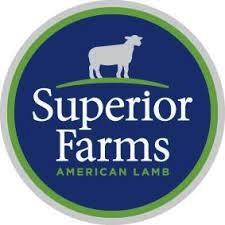 Superior Farms has operated within the city of Denver for decades. The company processes mutton and is the last remaining abattoir in the City that once was the terminal of cattle trails hosting extensive stockyards. A 2024 ballot initiative will determine the fate of the company in its present location. The proposed ordinance is intended to eliminate slaughtering operations in the City of Denver. The justification is not on the basis of nuisance, odor, pressure on effluent treatment as would be expected but is advanced by the deliberate misnomer of ‘welfare’. It is evident that the proponents of the ballot initiative are appealing to sentiment with the true agenda of veganism obscured by the concept of welfare. This is evidenced by the wording of the ballot that included “to promote community awareness of animal welfare, bolstering the City’s stance against animal cruelty and in turn to foster a more humane environment in Denver.” Superior Farms has operated within the city of Denver for decades. The company processes mutton and is the last remaining abattoir in the City that once was the terminal of cattle trails hosting extensive stockyards. A 2024 ballot initiative will determine the fate of the company in its present location. The proposed ordinance is intended to eliminate slaughtering operations in the City of Denver. The justification is not on the basis of nuisance, odor, pressure on effluent treatment as would be expected but is advanced by the deliberate misnomer of ‘welfare’. It is evident that the proponents of the ballot initiative are appealing to sentiment with the true agenda of veganism obscured by the concept of welfare. This is evidenced by the wording of the ballot that included “to promote community awareness of animal welfare, bolstering the City’s stance against animal cruelty and in turn to foster a more humane environment in Denver.”
Superior Farms slaughters lambs and processes carcasses through to case presentation. The plant employs 160, of whom 80 percent are Denver residents. Rick Stott, CEO maintains that despite polls showing even levels of either support or rejection “voters will resonate with a message of saying it’s not fair to target a particular business.” Superior Farms operates a facility in Dixon, CA. 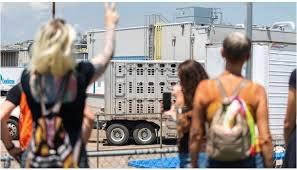
Forced closure of the plant in Denver would reduce the supply of domestic lamb to the U.S. market that will simply be substituted by imports from New Zealand and Australia. Even if the ballot initiative fails the proponents will be back in two years. They recognize the vulnerability of Superior Farms and the publicity associated with an eventual victory. Success in pro-vegan ballots generates funding for the organizers and reinforces a feeling of self-satisfaction through aggressively promoting a lifestyle that is opposed to intensive livestock production.

|
USPOULTRY Approve Research Projects
|
04/12/2024 |
|
 In an April 8th release, USPOULTRY and the USPOULTRY Foundation approved funding amounting to $363,000 for three research projects dealing with poultry meat production. These comprised: - In an April 8th release, USPOULTRY and the USPOULTRY Foundation approved funding amounting to $363,000 for three research projects dealing with poultry meat production. These comprised: -
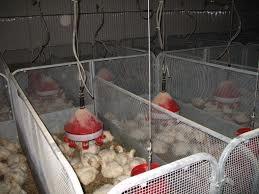
- Necrotic enteritis in chickens: understanding the immunological basis of host immunity North Carolina State University
- Cross-sectional and longitudinal epidemiologic investigations of Ornithobacterium in commercial turkeys. Iowa State University
- Technology for poultry hatcheries to simultaneously deliver vaccines and prebiotics. University of Delaware
|
Veterinary Welfare Association Supports Petition to FSIS
|
04/12/2024 |
|
 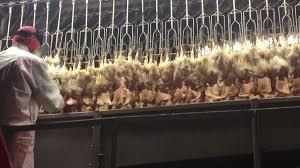 In September 2023, animal welfare association Animal Partisan filed a petition with FSIS urging local and state investigation and prosecution of overt abuse of livestock in abattoirs. The Veterinary Association of Farm Animal Welfare (VAFAW) supports the petition but deviates from Animal Partisan in maintaining that states do not have the right to supersede federal officials with respect to oversight of welfare. The VAFAW has requested the FSIS to interact with local and state agencies in the event of any deviations from the Federal Meat and Poultry Inspection Acts. In September 2023, animal welfare association Animal Partisan filed a petition with FSIS urging local and state investigation and prosecution of overt abuse of livestock in abattoirs. The Veterinary Association of Farm Animal Welfare (VAFAW) supports the petition but deviates from Animal Partisan in maintaining that states do not have the right to supersede federal officials with respect to oversight of welfare. The VAFAW has requested the FSIS to interact with local and state agencies in the event of any deviations from the Federal Meat and Poultry Inspection Acts.
USDA inspectors are empowered to close plants by suspending inspection in the 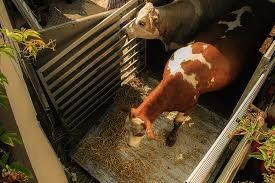 event of abuse. Referring cases to local or state officials is a reasonable action and could serve to strengthen welfare by focusing management attention on this aspect of plant operations. event of abuse. Referring cases to local or state officials is a reasonable action and could serve to strengthen welfare by focusing management attention on this aspect of plant operations.
|
Federal Agencies Issue MOU on Animal Welfare
|
04/12/2024 |
|
 The Environmental and Natural Resources Division of the Department of Justice (DOJ); the USDA Animal and Plant Health Inspection Service (APHIS) and the USDA Office of General Counsel have issued a Memorandum of Understanding (MOU) on civil and judicial implementation of the Animal Welfare Act. In the event of an overlap among federal agencies, MOUs designate the relative jurisdiction and responsibilities and coordination of activities including the sharing of information and enforcement. The Environmental and Natural Resources Division of the Department of Justice (DOJ); the USDA Animal and Plant Health Inspection Service (APHIS) and the USDA Office of General Counsel have issued a Memorandum of Understanding (MOU) on civil and judicial implementation of the Animal Welfare Act. In the event of an overlap among federal agencies, MOUs designate the relative jurisdiction and responsibilities and coordination of activities including the sharing of information and enforcement.
Following an infraction of the Animal Welfare Act the Federal government can implement civil action through the DOJ requiring federal district court action. In most cases, the APHIS can pursue administrati ve enforcement that can involve a warning with a settlement agreement with or without imposing a monetary penalty. APHIS has the authority to suspend or revoke licenses, issue cease-and-desist orders and impose civil penalties through the administrative law process. ve enforcement that can involve a warning with a settlement agreement with or without imposing a monetary penalty. APHIS has the authority to suspend or revoke licenses, issue cease-and-desist orders and impose civil penalties through the administrative law process.
The MOU establishes a priority for repeat offenders and egregious violators. Plants that will receive attention include facilities with a history of multiple citations or involving noncompliance. Licensees considered for suspension will have previously denied inspectors access or operate with defective records or exhibit a pattern of interference with inspectors. The MOU will facilitate coordinated action by the agencies involved.
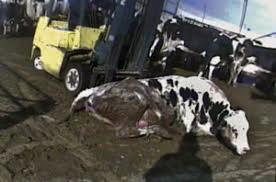 The MOU is probably a response to a petition by animal rights and welfare organizations to allow local law enforcement and judicial agencies to intervene in cases of alleged deviations from the Animal Welfare Act. The MOU is probably a response to a petition by animal rights and welfare organizations to allow local law enforcement and judicial agencies to intervene in cases of alleged deviations from the Animal Welfare Act.
Additional information can be obtained from the APHIS website www.aphis.usda.gov/awa/enforcement

|
Risk Assessment Recommends Concentration on Virulent Salmonella Serotypes
|
04/12/2024 |
|
 A recent study by Dr. Matthew Stasiewicz at the University of Illinois indicated that regulatory concentration on high levels of known virulent Salmonella serotypes would benefit public health. To date, Salmonella standards have been based on prevalence resulting in an evident reduction in recovery from processed poultry. Unfortunately there has not been a corresponding reduction in the incidence rate of chicken-related salmonellosis among consumers. A recent study by Dr. Matthew Stasiewicz at the University of Illinois indicated that regulatory concentration on high levels of known virulent Salmonella serotypes would benefit public health. To date, Salmonella standards have been based on prevalence resulting in an evident reduction in recovery from processed poultry. Unfortunately there has not been a corresponding reduction in the incidence rate of chicken-related salmonellosis among consumers.
 The risk assessment concluded that specific products with high levels of pathogenic serotypes should receive attention in order to develop appropriate control modalities. Dr. Stasiewicz suggested that programs focusing on generic prevalence of Salmonella may contribute to the emergence of more pathogenic serotypes such as Salmonella Kentucky. The risk assessment concluded that specific products with high levels of pathogenic serotypes should receive attention in order to develop appropriate control modalities. Dr. Stasiewicz suggested that programs focusing on generic prevalence of Salmonella may contribute to the emergence of more pathogenic serotypes such as Salmonella Kentucky.
The risk assessment was supported by a grant from the USPOULTRY Foundation.
|
Georgia Opposes U.S. EPA Effluent Guidelines
|
04/12/2024 |
|
 The Attorney General of Georgia, Chris Carr, has joined 26 other Attorneys General to oppose the Effluent Limitations Guidelines proposed by the U.S. Environmental Protection Agency. The Attorney General of Georgia, Chris Carr, has joined 26 other Attorneys General to oppose the Effluent Limitations Guidelines proposed by the U.S. Environmental Protection Agency.
Opposition to the proposed guidelines is based on the high cost of compliance that would increase the price of meat, poultry and egg products to consumers. It is estimated that with the more stringent guidelines, EPA jurisdiction over 150 processing plants would be increased to 3,000 facilities.
The letter submitted by the AGs noted “Evident escalation in the intensity of regulations issued by federal agencies, harms the integrity of our judicial system and this Administration should stop abusing the legal system to achieve results it otherwise cannot get”. Legality of the Effluent Limitations Guidelines is questioned since the proposed rule would extend the statutory authority of the Environmental Protection Agency under the Clean Water Act.
|
Hormel Foods Agrees to $11.7 Million Settlement
|
04/10/2024 |
|
 Hormel Foods has agreed to pay three classes of Plaintiffs in a suit alleging collusion on pork prices. Commercial indirect purchasers will receive $2.4 million, direct pork purchasers, $4.8 million and consumer indirect purchasers, $4.5 million. Hormel Foods has agreed to pay three classes of Plaintiffs in a suit alleging collusion on pork prices. Commercial indirect purchasers will receive $2.4 million, direct pork purchasers, $4.8 million and consumer indirect purchasers, $4.5 million.
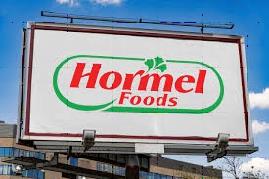
Collectively, there were 146 claimants in 27 cases that were consolidated during December 2022.
The settlement by Hormel Foods follows a June agreement by Seaboard Foods to pay the class of direct purchasers $9.8 million to settle the lawsuit.
|
Costco Changes Packaging for Rotisserie Chicken
|
04/09/2024 |
|
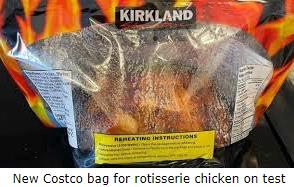 Costco is undertaking a five-year action plan to reduce the use of plastic packaging. The company markets close to 150 million rotisserie chickens annually, currently presented in two-part PET containers. Following test in Canada, the Company has introduced a flexible plastic bag with insulating capability for their chickens. The change will reduce plastic use for this application by 75 percent, representing a saving of 17 billion pounds of resin annually and a reduction of 4,000 metric tons of carbon dioxide released. This, according to a Company claim will be equivalent to the output of 1,000 trucks annually when fully implemented across 850 warehouses globally. Costco is undertaking a five-year action plan to reduce the use of plastic packaging. The company markets close to 150 million rotisserie chickens annually, currently presented in two-part PET containers. Following test in Canada, the Company has introduced a flexible plastic bag with insulating capability for their chickens. The change will reduce plastic use for this application by 75 percent, representing a saving of 17 billion pounds of resin annually and a reduction of 4,000 metric tons of carbon dioxide released. This, according to a Company claim will be equivalent to the output of 1,000 trucks annually when fully implemented across 850 warehouses globally.
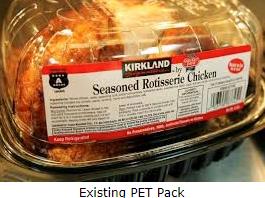
Tim Wahlquist responsible for Costco packaging stated, “The goal is to reduce packaging waste while still protecting products, ensuring food safety and complying with laws and regulations. As a corporate policy, Costco will replace plastic packaging with potentially recyclable content as feasible alternatives become available.

|
Department of Labor Aggressively Investigating Child Labor
|
04/09/2024 |
|
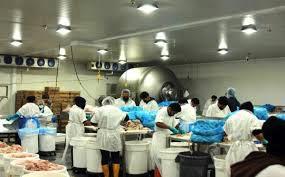 The Department of Labor has filed lawsuits against three California poultry processors alleging violations of child labor law. The Wages and Hours Division has been reviewing plant employment records and conducting inspections uncovering “oppressive child labor at poultry processing facilities.” According to the submissions by the Department of Labor the three companies concerned employed children under the age of 18 to debone poultry in contravention of child labor laws. The Department of Labor has filed lawsuits against three California poultry processors alleging violations of child labor law. The Wages and Hours Division has been reviewing plant employment records and conducting inspections uncovering “oppressive child labor at poultry processing facilities.” According to the submissions by the Department of Labor the three companies concerned employed children under the age of 18 to debone poultry in contravention of child labor laws.
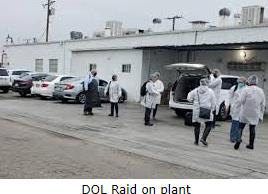
Defendants include L&Y Food Inc., Moon Poultry Inc. and JCR Culinary Group Inc. and their three respective managers in their personal capacities.

The Department of Labor was granted an injunction embargoing products from the plants although there was evidence that the restraining order was defied. The Agency alleged that the defendants obstructed investigations including review of employment data.
|
Proposed California Ban on Locomotive Emissions Opposed
|
04/08/2024 |
|
 The California Air Resources Board (CARB) has requested the EPA to allow California to issue regulations to limit emissions by locomotives. The proposed requirements would include:- The California Air Resources Board (CARB) has requested the EPA to allow California to issue regulations to limit emissions by locomotives. The proposed requirements would include:-
- Decommissioning of locomotives older than 23 years at the beginning of 2030,
- Impose reporting requirements and administrative fees
- Require railroads to shut down other than zero-emission locomotives when transiting in certain areas.
The proposal has resulted in considerable opposition including the National Chicken Council and ninety federal and state agencies and infrastructure associations. A joint letter to the Director of the EPA stated, “If the CARB regulations are authorized by EPA, we believe freight rail carriers and their customers would be significantly hindered financially and operationally”. Clearly the proposed requirements presume technology that is currently unavailable or will be impractical to implement.
The proposed CARB restrictions appear to be preempted by federal law that allows the Surface Transportation Board to exercise jurisdiction over the operation and activities of freight railroads in interstate commerce.

Subscribers will recall the difficulties encountered by Foster Farms in obtaining adequate quantities of corn due to reduced rail transport during COVID and 2023 labor action against railroad operators, resulting in litigation and appeals to the Surface Transportation Board.

|
Integrators Settle Over Wage Claims
|
04/08/2024 |
|
 Case Foods and Mountaire Farms have agreed to pay $8.5 million and $13.5 million respectively to the class of workers alleging collusion in setting wage rates. Case Foods and Mountaire Farms have agreed to pay $8.5 million and $13.5 million respectively to the class of workers alleging collusion in setting wage rates.
The lawsuit was filed in 2019 and claimed interaction among employers to agree on wage rates and to indirectly share information through AgriStats®.
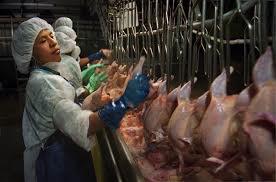
Recently Perdue Farms settled for $60 million, but there are eighteen integrators still named as defendants.
|
Tyson Foods Responds to Questionable Claim by Cody Easterday
|
04/08/2024 |
|
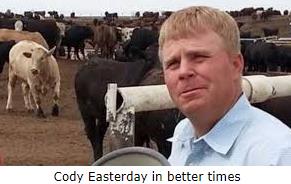 Cody Easterday currently serving an 11-year prison sentence for defrauding Tyson Foods of $144 million has filed suit against the Company. At issue, is a claim that Easterday was offered a share of the profits from sales of meat products designated “Cody’s Beef” marketed in Japan. Cody Easterday currently serving an 11-year prison sentence for defrauding Tyson Foods of $144 million has filed suit against the Company. At issue, is a claim that Easterday was offered a share of the profits from sales of meat products designated “Cody’s Beef” marketed in Japan.
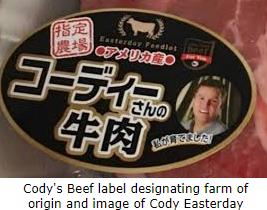
Cody claimed $100 million for using his name and image on product labels. His original filing with the U.S. Court of Appeals for the Ninth Circuit was dismissed but Easterday is persisting in his litigation. Tyson Foods categorically rejects the claim based on the absence of any proof relating to any obligation by Tyson Foods to share in profits.
|
KFC Introducing Saucy Nuggets
|
04/02/2024 |
|
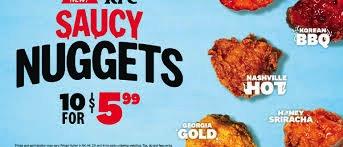  KFC has introduced five new sauces for their white-meat chicken nuggets. Priced at $5.99 for ten, Saucy Nuggets are available with one of three new flavors and two held over by demand. They include honey sriracha, Korean BBQ, sweet and sour, natural hot and Georgia gold honey mustard. KFC has introduced five new sauces for their white-meat chicken nuggets. Priced at $5.99 for ten, Saucy Nuggets are available with one of three new flavors and two held over by demand. They include honey sriracha, Korean BBQ, sweet and sour, natural hot and Georgia gold honey mustard.
|
India to Allow Importation of Duck Meat
|
04/02/2024 |
|
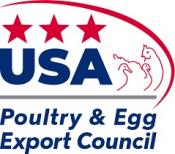 According to USDA-FAS GAIN report IN2024-0015 released on March 25th India will allow importation of duck meat. During early March, the Ministry of Commerce and Industry authorized imports of premium frozen duck meat in accordance with a harmonized tariff system. According to USDA-FAS GAIN report IN2024-0015 released on March 25th India will allow importation of duck meat. During early March, the Ministry of Commerce and Industry authorized imports of premium frozen duck meat in accordance with a harmonized tariff system.
 Import duties for duck meat have been reduced with expectations of shipments to the Nation from the U.S albeit it in competition from producers in the E.U. and Asian nations including Thailand and China. Import duties for duck meat have been reduced with expectations of shipments to the Nation from the U.S albeit it in competition from producers in the E.U. and Asian nations including Thailand and China.
|
Vegan Promoters Ambivalent over Florida Cultured Meat
|
04/01/2024 |
|

Legislation banning the sale of cell-cultured meat in Florida, will take effect on July 1st, 2024. This legislation is essentially a “feel-good” measure in response to political pressure since there will not be any commercially available cell-cultured meat on July 1st, 2024, or for that matter, in the foreseeable future.
Vegan advocates consider that cell-cultured meat would be an improvement over conventional beef, pork and chicken based on welfare and environmental criteria. Organizations opposing 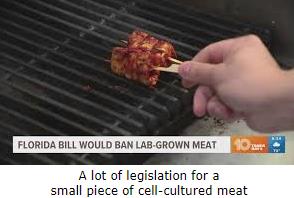 animal agriculture are also pushing the health aspects of non-meat diets citing an unproven scientific relationship between intake of dietary cholesterol and cardiovascular disease in otherwise healthy consumers. animal agriculture are also pushing the health aspects of non-meat diets citing an unproven scientific relationship between intake of dietary cholesterol and cardiovascular disease in otherwise healthy consumers.
|
Delmarva Producers to Improve Environmental Management Practices
|
03/31/2024 |
|
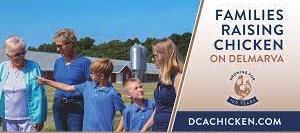
The Delmarva Chicken Association and the Alliance for the Chesapeake Bay will fund a $2 million program over three years to promote best management practices for producers on the Delmarva Peninsula.
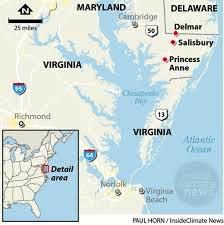
Funds will be used to improve riparian buffers and apply enhanced conservation, drainage and litter management. The intent is to reduce the release of nitrogen and phosphorous into Chesapeake Bay.
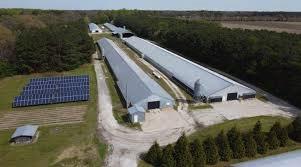 Participating farmers will be eligible for cost-share conservation initiatives including planting of trees, establishing pollinator areas between houses and around retention ponds. Participating farmers will be eligible for cost-share conservation initiatives including planting of trees, establishing pollinator areas between houses and around retention ponds.
|
Missouri Plant Protein Labeling Statute Upheld
|
03/31/2024 |
|
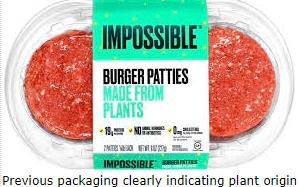 The U.S. District Court for the Western district of Missouri ruled as constitutional the 2018 statute relating to potential misrepresentation of vegetable-based products as meat. The U.S. District Court for the Western district of Missouri ruled as constitutional the 2018 statute relating to potential misrepresentation of vegetable-based products as meat.
The Missouri statute, according to the court, did not prohibit commercial speech and was in accordance with the First Amendment. Turtle Island Foods, manufacturer of Tofurky, clearly labels its product as being ‘plant-origin’.
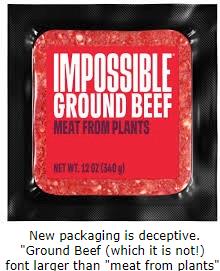 Missouri Attorney General, Andrew Bailey, stated, “Ensuring that the truth of products sold within the state of Missouri is of importance to both consumers and the farmers and ranchers that produce food.” The Missouri Cattlemen’s Association welcomed the judgment, noting “The legislation in no way prohibited the sale of consumption of these imitation products but it did require truthful and accurate labeling. Misleading consumers is unacceptable.” Missouri Attorney General, Andrew Bailey, stated, “Ensuring that the truth of products sold within the state of Missouri is of importance to both consumers and the farmers and ranchers that produce food.” The Missouri Cattlemen’s Association welcomed the judgment, noting “The legislation in no way prohibited the sale of consumption of these imitation products but it did require truthful and accurate labeling. Misleading consumers is unacceptable.”
Opponents of restricted legislation maintain that consumers are not confused by meat substitutes with labels that clearly indicate plant-based origin. These products are usually placed in display areas separate from animal-derived meat and with clear labeling of packages.

|
Chick-fil-A Antibiotic Transition from NAE to NAIHM
|
03/29/2024 |
|
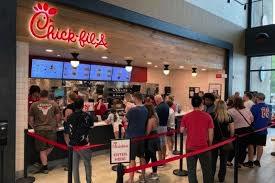 Chick-fil-A has dropped the strict No Antibiotics Ever (NAE) to a modified No Antibiotics Important to Human Medicine (NAIHM). The Company has not specified the compounds that will be allowed but if this includes ionophore anticoccidial there will be a benefit to producers with no adverse effect for consumers. Ionophores are not regarded as “antibiotics” in the E.U. but because the compound suppresses some intestinal bacteria they were unjustifiably included as “antibiotics”, with respect to the FDA classification. If the Chick-fil-A standard allows the use of feed additive bacitracin, there will be no deleterious effect since this compound is not used for human medicine other than as a topical application and does not contribute to the emergence of antibiotic resistance. Inclusion of bacitracin in broiler diets will suppress Clostridium spp. responsible for necrotic enteritis and gangrenous dermatitis. Chick-fil-A has dropped the strict No Antibiotics Ever (NAE) to a modified No Antibiotics Important to Human Medicine (NAIHM). The Company has not specified the compounds that will be allowed but if this includes ionophore anticoccidial there will be a benefit to producers with no adverse effect for consumers. Ionophores are not regarded as “antibiotics” in the E.U. but because the compound suppresses some intestinal bacteria they were unjustifiably included as “antibiotics”, with respect to the FDA classification. If the Chick-fil-A standard allows the use of feed additive bacitracin, there will be no deleterious effect since this compound is not used for human medicine other than as a topical application and does not contribute to the emergence of antibiotic resistance. Inclusion of bacitracin in broiler diets will suppress Clostridium spp. responsible for necrotic enteritis and gangrenous dermatitis.
It 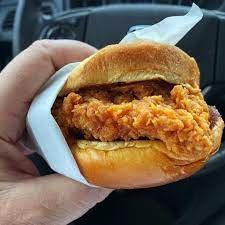 will be interesting to observe consumer response to the change in policy that will probably rise to the level of a large yawn. This will hold providing the chain maintains quality and value and can assure customers of ongoing welfare in production that conforms to the NCC standards. will be interesting to observe consumer response to the change in policy that will probably rise to the level of a large yawn. This will hold providing the chain maintains quality and value and can assure customers of ongoing welfare in production that conforms to the NCC standards.
The action by Chick-fil-A parallels the earlier announcement by Panera Bread and could initiate a trend among QSRs and mid-priced supermarket chains to adopt a more realistic policy on antibiotics consistent with scientific and financial realities.

|
HPAI Continues in Taiwan
|
03/29/2024 |
|
A ProMed report confirmed a recent outbreak of H5N1 avian influenza in Chang Hua County involving 20,000 hens that were depleted. Previous outbreaks have occurred in Ping Tang and Tainan in February. Since January “tens of thousands of hens” have been culled in Yunlin County resulting from exposure to H5N1 presumably from wild birds.
With numerous small and intermediate-sized duck and egg farms in close proximity and a live bird market system for broilers, Taiwan is candidate for vaccination against avian influenza H5N1. This is based on the location of the island nation on migratory bird routes and a history of recurring avian influenza suggesting a seasonal endemic status justifying protection.
|
Brazil to Expand Production and Exports in 2024
|
03/29/2024 |
|
 According to USDA-FAS GAIN Report BR2024-0002, Brazil will increase broiler production to 15.10 million metric tons (33.22 million lbs.) of RTC, an increase of 1.3 percent over 2023. Of this total, 33.0 percent will be exported amounting to 4.975 million metric tons (10.94 million lbs.) or an increase of 4.3 percent over 2023. Assuming a population of 220 million, domestic per capita consumption will be 46.0 kg (101.3 lb.). According to USDA-FAS GAIN Report BR2024-0002, Brazil will increase broiler production to 15.10 million metric tons (33.22 million lbs.) of RTC, an increase of 1.3 percent over 2023. Of this total, 33.0 percent will be exported amounting to 4.975 million metric tons (10.94 million lbs.) or an increase of 4.3 percent over 2023. Assuming a population of 220 million, domestic per capita consumption will be 46.0 kg (101.3 lb.).
The GAIN Report noted that in 2023, feed cost representing 68 percent of live-bird cost declined by 22 percent with a corresponding 14 percent drop in chick cost representing 15 percent of live bird cost. The major increase was a 13 percent rise in the cost of electrical power that represented 2.5 percent of live bird cost.
With regard to exports, Brazil introduced electronic certification for the E.U. that will expedite approval of shipments and reduce cost. The Brazilian Association of Animal Protein (ABPA) noted expansion into new markets including Israel, the Pacific Islands and Algeria. In the case of this nation, Brazil donated 10,000 metric tons of chicken meat as a humanitarian gesture and to gain a foothold in the market.

For 2023, the top importers of chicken from Brazil comprised China (14 %); UAE (9%); Japan (9%); Saudi Arabia (8%) and South Africa (7%).
Brazil has apparently benefited from its status as “free of avian influenza in commercial farms”.
This situation is questioned since the nation reported 158 cases of H5N1 HPAI in backyard flocks and wild birds but miraculously none in commercial flocks. Eight states reported HPAI including all the major broiler producing areas.

|
Contractor Lawsuit Dismissed
|
03/28/2024 |
|
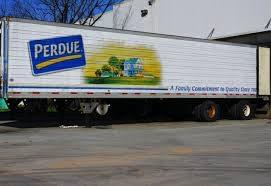 A July 2022 lawsuit filed in Federal court in Georgia against Perdue Farms was recently dismissed. Roger Parker the Plaintiff, claimed misclassification as an “independent contractor” and that the Company retaliated by terminating his contract for registering complaints under the Packers’ and Stockyards Act. The Plaintiff, also claimed improper compensation due to under-weighing of broilers delivered. A July 2022 lawsuit filed in Federal court in Georgia against Perdue Farms was recently dismissed. Roger Parker the Plaintiff, claimed misclassification as an “independent contractor” and that the Company retaliated by terminating his contract for registering complaints under the Packers’ and Stockyards Act. The Plaintiff, also claimed improper compensation due to under-weighing of broilers delivered.
Parker held that since contractors are “treated like employees” they should receive employee benefits including overtime. This is a somewhat fallacious characterization given the nature of the relationship between the contractor who supplies housing, labor and utilities and the integrator providing chicks and feed and extending service as defined in the contract.
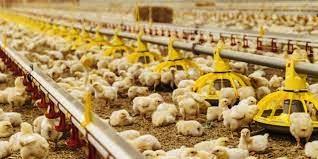
Parker was unable to establish a Class for the lawsuit as he faced understandable lack of interest among contractors willing to participate in the litigation.
|
Freirich Foods Files for Bankruptcy Protection
|
03/28/2024 |
|
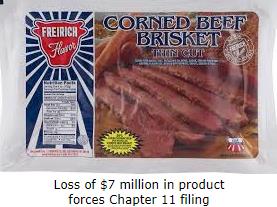 Freirich Foods, a family-owned enterprise established in 1921, recently filed for Chapter 11 bankruptcy protection. This action was taken following a $7 million loss arising from 1.2 million pounds of product that was mishandled by a third-party cold storage company. Freirich Foods, a family-owned enterprise established in 1921, recently filed for Chapter 11 bankruptcy protection. This action was taken following a $7 million loss arising from 1.2 million pounds of product that was mishandled by a third-party cold storage company.
The filing will allow the company to restructure finances, maintain solvency and to restore profitability for the benefit of the owners, creditors and indirectly, 100 workers.
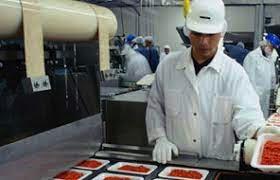 In a statement, the CEO noted, “Bankruptcy protection will enable our company to safeguard our business, employees, customers, and partners while we seek to recover our financial loss and propose a plan to restructure debt and renegotiate contracts. We will emerge from this process with a stronger balance sheet”. In a statement, the CEO noted, “Bankruptcy protection will enable our company to safeguard our business, employees, customers, and partners while we seek to recover our financial loss and propose a plan to restructure debt and renegotiate contracts. We will emerge from this process with a stronger balance sheet”.
It is questioned whether the company can recover the loss through insurance or a lawsuit alleging negligence.
|
Chicken Walnut Salad Recalled
|
03/28/2024 |
|
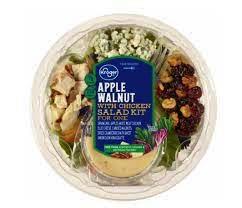 Taylor Farms has recalled ten tons of ready-to-eat apple walnut chicken salad due to non-label disclosure of wheat. Affected product was manufactured between February 28th and March 9th and marketed in Kroger stores in twelve western states. Taylor Farms has recalled ten tons of ready-to-eat apple walnut chicken salad due to non-label disclosure of wheat. Affected product was manufactured between February 28th and March 9th and marketed in Kroger stores in twelve western states.
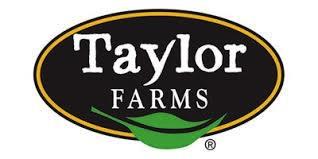 Product recalls are usually attributed to contamination with pathogens, the presence of foreign material or improper labeling. Misbranding involving the inclusion of a non-declared allergens is a self-inflicted wound and can be avoided by appropriate quality control and coordination within a company. Product recalls are usually attributed to contamination with pathogens, the presence of foreign material or improper labeling. Misbranding involving the inclusion of a non-declared allergens is a self-inflicted wound and can be avoided by appropriate quality control and coordination within a company.
|
Welcome to Vencomatic Group
|
03/26/2024 |
|

CHICK-NEWS welcomes the Vencomatic Group as a sponsor. The Company was founded in 1983 by the van de Ven family in their Eersel, location in the Netherlands. The Group has expanded to include major operating segments comprising Agro Supply, Prinzen, Van Gent and Vencomatic. Vencosteel is a dedicated supplier of metal components including stainless and specialty steel with an output of 6,500 tons annually. The Vencomatic Group operates subsidiaries in the U.S. (Adel, IA), in Sao Paulo State (Brazil) and in France, Spain, the U.K., China and Malaysia.
The company posted revenue of $175 million worldwide in 2023 and has 500 employees interacting with 100 suppliers and strategic partners worldwide. The Headquarters Complex in Eersel is uniquely shaped to resemble an egg, recognizing the focus of the company.
For the meat industry, the Vencomatic Group designs and manufactures an extensive line of nest systems, Vencoslat plastic units with oval or rectangular openings, lighting systems and egg-conveyors. The Prinzen line includes automation for hatching eggs, including the Ovo-Set automated transfer system to setter trays and the Ovo-Grader to process eggs. The Vencomatic Group also manufactures specialty products for the turkey and duck industries including nests and slats that contribute to optimum poult and duckling production.
The Vencomatic Group maintains close contact with research institutions and customers and maintains a library of resources available to the industry. Technical specialists are available to advise on selection and operation of equipment to optimize production of hatching eggs, broilers, turkeys and ducks.
|
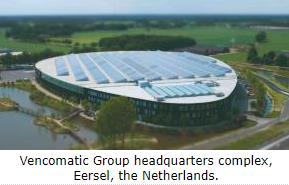
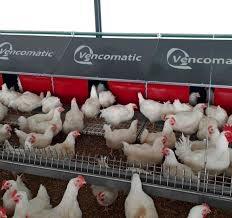
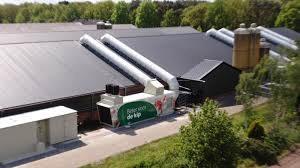
|

|
STOP PRESS
|
03/26/2024 |
|
 HPAI Infects Dairy Herds in Three States HPAI Infects Dairy Herds in Three States
According to an APHIS release on March 25th and postings on ProMED, Federal and state authorities are responding to outbreaks of highly pathogenic avian influenza in dairy herds in Texas, Kansas and New Mexico. The serotype has not been revealed but is presumably H5N1. The source of infection is most possibly wild birds apparently found dead in the vicinity of premises in Texas. Affected animals demonstrated clinical depression and lowered milk production. Avian infectious virus was isolated from udder milk samples and oropharyngeal swabs.
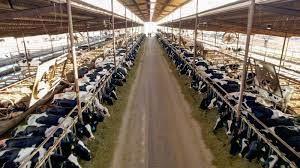
Affected herds have been quarantined and milk has been destroyed. A more detailed report will be posted in the Friday edition of EGG-NEWS
|
Broiler Month
|
03/25/2024 |
|
Monthly Broiler Production and Prices, February 25th 2024.
Broiler Chick Placements.
According to the March 20th 2024 USDA Broiler Hatchery Reports, 974.75 million eggs were set over four weeks extending from the week ending February 24th 2024 through March 16th 2024 inclusive. This quantity was higher by slightly less than two percent compared to the corresponding period in 2023.
Total chick placements for the U.S. over the four-week period amounted to 748.76 million chicks. Claimed hatchability for the period averaged 79.1 percent for eggs set three weeks earlier, down from 79.5 percent for the preceding four-week period. Each 1.0 percent change in hatchability represents approximately 1.86 million chicks placed per week and 1.77 million broilers processed, assuming five percent culls and mortality with the current range of weekly settings.
Cumulative chick placements for the period January 7th through December 30th 2023 amounted to 9.67 billion chicks. For January 6th through March 16th 2024 chick placements attained 2.05 billion
According to the March 22nd 2024 edition of the USDA Chickens and Eggs pullet breeder chicks hatched and intended for U.S. placement during February 2024 amounted to 8.20 million, up 6.4 percent (491,000 pullet chicks) from February 2023 and 10.2 percent (761,000 pullet chicks) more than the previous month of January 2024. Broiler breeder hen complement attained 62.3 million on March 1st 2024, 1.5 percent less (953,000 hens) than on March 1st 2023.
Broiler Production
As documented in the March 22nd 2024 USDA Broiler Market News Reports for the processing week ending March 16th 2024, 160.6 million broilers were processed at 6.41 lbs. live. This was 2.2 percent less than the 164.2 million broilers processed during the corresponding week in the previous month of February 2024 and 2.3 percent less than the 164.3 million processed during the corresponding week in March 2023. Broilers processed in 2024 to date amounted to 1,774 million, 3.0 percent lower than for the corresponding period in 2023.
Ready to cook (RTC) weight for the most recent week was 782.3 million lbs. (355,58` metric tons). This was 3.0 percent less than the 806.1 million lbs. processed during the corresponding week in February 2024 and 1.3 percent less than the 792.9 million lbs. during the corresponding week in March 2023. Dressing percentage was a nominal 76.0 percent. For 2024 to date RTC broiler production attained 8,730 million lbs. (3.97 million metric tons). This quantity was 1.8 percent less than the corresponding period in 2023.
 
|
Turkey Month
|
03/25/2024 |
|
Monthly Turkey Production and Prices, March 25th 2024
Poult Production and Placement:
The March 12th 2024 edition of the USDA Turkey Hatchery Report, issued monthly, documented 25.05 million eggs in incubators on March 1st 2024 compared to 26.76 million eggs on March 1st 2023* The March 2024 set was down 1.71 million eggs (6.4 percent) from March 2023 and 0.38 million eggs (1.5 percent) less than the previous month of February 2024.
A total of 20.18 million poults were hatched during February 2024 down 1.53 million poults (7.0 percent) compared to 21.70 million in February 2023*. The February 2024 hatch was down 1.35 million poults (6.3 percent) from the previous month of January.
A total of 18.54 million poults were placed on farms in the U.S. in February 2024, compared to 19.87 million in February 2023*. The February 2024 placement was 1.32 million poults (6.7 percent) less than in February 2023* 2023. This data confirms disposal of 1.63 million poults during the month. Approximately 8.1 percent of the February 2024 hatch was not placed.
For the twelve-month period March 2023 February 2024 inclusive, 267.64 million poults were hatched and 249.92 million were placed. This confirms disposal of 17.72 million poults over the 12-month period, corresponding to 6.6 percent of all poults hatched.
* USDA revision from previous monthly report.
Turkey Production:
The March 22nd 2024 edition of the Turkey Market News Reports documented the following provisional data for turkeys slaughtered under Federal inspection:-
- For the processing week ending March 16th 2024, 1.653 million hens were processed at 16.6 lbs. live. This was 2.7 percent more than the 1.609 million hens processed during the corresponding week in February 2024 and 3.8 percent less than the 1.718 million processed during the corresponding week in March 2023. Hen slaughter year-to-date has attained 17.5 million, 4.9 percent less than for the corresponding period in 2023.
Ready to cook (RTC) weight for hens over the most recent week was 22.14 million lbs. (10,065 metric tons). This quantity was 3.3 percent more than the 21.44 million lbs. for corresponding week in February 2024 and 9.9 percent less than the 24.6 million lbs. during the corresponding week in March 2023. Dressing percentage was a nominal 80.5 percent. For 2024 to date RTC hen production attained 235.1 million lbs. (106,844 metric tons). This quantity is 11.5 percent less than for the corresponding period in 2023.
- For the processing week ending March 16th 2024, 2.025 million toms were processed at 44.6 lbs. live. This was 1.5 percent more than the 1.995 million toms processed during the corresponding week in February 2024 and 13.8 percent more than the 1.780 million during the corresponding week in March 2023. Year-to-date 21.62 million toms have been processed, 0.8 percent more than for the corresponding period in 2023.
Ready to cook (RTC) weight for toms during the most recent week was 72.7 million lbs. (33,040 metric tons). This quantity was 1.0 percent more than the 72.0 million lbs. processed during the corresponding week in March 2024 and 14.1 percent more than the 63.8 million lbs. during the corresponding week in February 2023. Dressing percentage was a nominal 80.5 percent. For 2024 to date RTC tom production attained 782.5 million lbs. (355,697 metric tons). This quantity is 1.8 percent more than the corresponding period in 2022.
 
|
NTF Appoints Leslee Oden as CEO
|
03/25/2024 |
|
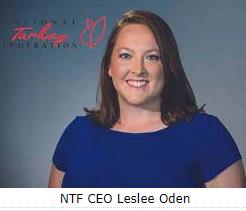 The National Turkey Federation has announced that Leslee Oden has been appointed as the president and CEO of the producer association. This action follows the retirement of Joel Brandenberger after a 17-year tenure. The National Turkey Federation has announced that Leslee Oden has been appointed as the president and CEO of the producer association. This action follows the retirement of Joel Brandenberger after a 17-year tenure.
Ms. Oden has worked at the NTF for 15 years and was named Senior Vice President of Legislative Affairs in 2018. Leslee earned baccalaureate and master’s degrees in poultry science from Texas A&M.
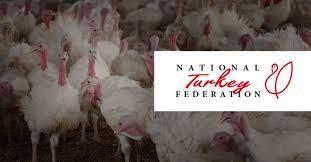
John Zimmerman, Chairman of the NTF stated “It was clear that Leslee was the candidate with in-depth knowledge needed to help navigate our industry through challenging issues.” He added, “Her tenure at NTF brings a wealth of knowledge, key industry relationships and an understanding of legislative and regulatory priorities that will continue to lead the turkey industry into the future.”
|
Impossible Foods Introduces New Packaging Image
|
03/24/2024 |
|
 Peter McGuinness, president and CEO of Impossible Foods recently announced the introduction of new packaging at the National Products Expo West. McGuinness stated, “We want packaging that lived up to and reflected the deliciousness of our products while really popping on the shelf.” He added, “What we want to do is educate consumers that they can still enjoy meat by incorporating into their diet a version that’s made from plants instead of animals.” Peter McGuinness, president and CEO of Impossible Foods recently announced the introduction of new packaging at the National Products Expo West. McGuinness stated, “We want packaging that lived up to and reflected the deliciousness of our products while really popping on the shelf.” He added, “What we want to do is educate consumers that they can still enjoy meat by incorporating into their diet a version that’s made from plants instead of animals.”
 McGuinness is clearly a marketing expert but appears to be insensitive to both accounting realities and the organoleptic properties of his products. Plant based meat alternatives are clearly inferior with respect to appearance, texture and taste. Shelf prices are higher than the product they purport to replace. Although Impossible Foods is not a publicly quoted company and therefore does not release financial reports, competitors Beyond Meat and the plant-based division of Maple Leaf Foods confirm non-profitability. McGuinness is clearly a marketing expert but appears to be insensitive to both accounting realities and the organoleptic properties of his products. Plant based meat alternatives are clearly inferior with respect to appearance, texture and taste. Shelf prices are higher than the product they purport to replace. Although Impossible Foods is not a publicly quoted company and therefore does not release financial reports, competitors Beyond Meat and the plant-based division of Maple Leaf Foods confirm non-profitability.
Impossible Foods should concentrate more on improving the quality of the product since the packaging is discarded and not eaten. The fact that the Bezos Earth Fund is making available grants to food science departments of universities to improve organoleptic qualities of plant-based foods confirms the reality of inferiority despite the Impossible Foods hype.

|
Ongoing Outbreaks of Salmonella Mbandaka in Europe
|
03/23/2024 |
|
 An ongoing outbreak of Salmonella Mbandaka infection commencing in 2021 has resulted in 300 diagnosed and confirmed cases through March 2024. Outbreaks have been recorded in the U.K., Finland, France, Germany and the Netherlands. Extensive, epidemiologic investigations including whole genome sequencing have identified the source as steam-cooked chicken breast and other products from Ukraine. An ongoing outbreak of Salmonella Mbandaka infection commencing in 2021 has resulted in 300 diagnosed and confirmed cases through March 2024. Outbreaks have been recorded in the U.K., Finland, France, Germany and the Netherlands. Extensive, epidemiologic investigations including whole genome sequencing have identified the source as steam-cooked chicken breast and other products from Ukraine.
According to the European Commission, corrective measures have been implemented in the implicated plant with enhanced surveillance and upgrading of food safety.
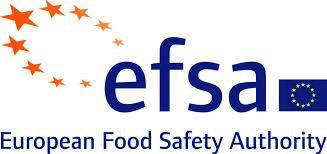 The persistence of one strain for over four years suggests vertical transmission that should be evaluated. It would be interesting to learn whether producers in Ukraine and specifically the single largest integrator and exporter have implemented preventive vaccination at either or both the breeder and grow-out levels. The persistence of one strain for over four years suggests vertical transmission that should be evaluated. It would be interesting to learn whether producers in Ukraine and specifically the single largest integrator and exporter have implemented preventive vaccination at either or both the breeder and grow-out levels.
|
Tyson Foods Comments on Employment of Legal Asylum Seekers
|
03/23/2024 |
|
 Tyson Foods has come under criticism for offering employment to legal asylum seekers for open positions. The company is a participant in the Tent Partnership for Refugees that has as its goal, placing in employment 181,000 migrants sent to New York City. Tyson has pledged to hire 2,500 refugees over a three-year period. Tyson Foods has come under criticism for offering employment to legal asylum seekers for open positions. The company is a participant in the Tent Partnership for Refugees that has as its goal, placing in employment 181,000 migrants sent to New York City. Tyson has pledged to hire 2,500 refugees over a three-year period.
The Tyson workforce of 120,000 currently includes 35 percent non-native born legal workers. Tyson Foods along with other packers and integrators encounters a 40 percent turnover of line workers each year necessitating recruitment and hiring of about 50,000 people to fill vacancies.
Garrett Dolan, Associate Director of Human Resources, for Tyson Foods pointed to the need to employ migrant labor despite the search for qualified domestic candidates.
The company offers a $1,000 initial relocation bonus, six days of temporary housing and a $4,000 payment after permanent housing is obtained, Spanish-speaking community liaison, assistance with enrolling children at school and other needs are provided. Tyson Foods has committed $1.5 million for legal and citizenship service to immigrant workers.
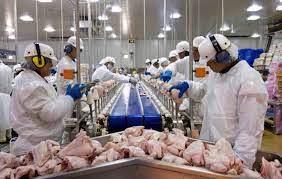
Criticism of Tyson Foods and other companies participating in the Tent Partnership for Refugees is based on xenophobia. The U.S. needs immigrants to fill available positions. More important will be the second generation who will benefit from U.S. acculturation, schooling and universities to become productive members of society. Our nation is aging and requires a large and active young workforce to sustain social security programs.
It must be remembered that irrespective of our heritage, we all have immigrant antecedents, even those who walked across the land bridge over the Bering Strait millennia ago.

|
Beyond Meat Reports on Q4 and FY 2023
|
03/21/2024 |
|
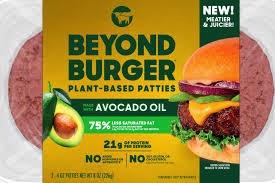 In a press release dated February 27th Beyond Meat Inc. (BYND) announced results for the 4th Quarter ending December 31st 2023. In a press release dated February 27th Beyond Meat Inc. (BYND) announced results for the 4th Quarter ending December 31st 2023.
The following table summarizes the results for the period compared with the values for the corresponding quarter of the previous fiscal year (Values expressed as US$ x 1,000 except EPS)
|
4th Quarter Ending December 31st
|
2023
|
2022
|
Difference (%)
|
|
Sales:
|
$75,679
|
$79,938
|
-5.3
|
|
Gross profit /(loss):
|
$(83,859)
|
$(2,931)
|
-2,761
|
|
Operating income/ (loss):
|
$(160,803)
|
$(65,721)
|
-144.7
|
|
Pre-tax Income/ (loss)
Net Income/ (loss)
|
$(155,072)
$(155,110)
|
$(58,757)
$(66,867)
|
-163.9
-132.0
|
|
Diluted earnings per share:
|
$(2.40)
|
$(1.05)
|
-128.6
|
|
Gross Margin (%)
|
-110.8
|
-3.7
|
-2,895
|
|
Operating Margin (%)
|
-212.5
|
-82.2
|
-159.5
|
|
Profit Margin (%)
|
-205.0
|
-83.6
|
-145.2
|
|
Long-term Debt: Dec. 31st
|
$1,213,464
|
$1,189,931
|
+2.0
|
|
12 Months Trailing:
|
|
|
|
|
Return on Assets (%)
|
-17.3
|
|
|
|
Return on Equity (%)
|
N/A
|
|
|
|
Operating Margin (%)
|
-97.6
|
|
|
|
Profit Margin (%)
|
-98.5
|
|
|
|
Total Assets: Dec. 31st
|
$774,450
|
$1,062,224
|
-27.2
|
|
Market Capitalization March 12th.
|
$574,410
|
$784,670
|
-26.8
|
NOTES:
R&D expenditure declined 29.0 percent from Q4 2022 to $9.2 million or 12.5 percent of revenue
S&G expenditure increased 44.5 percent from Q4 2022 to $67.7 million or 91.7 percent of revenue
For FY 2023 net loss was $(338.14) million on sales of $334.38 million with a diluted EPS of $(5.26). Comparative values for FY 2022 were a net loss of $(342.77) million on sales of $418.93 million with a diluted EPS of $(5.75).
For FY 2023:-
52-Week Range in Share Price: $16.13 to $8.31 50-day Moving average $7.59
Forward P/E: Neg. Beta 2.5
Insiders hold 8.7 percent of equity, Institutions 38.7 percent.
Comments:-
For the 4th Quarter of 2023:
U.S. sales represented 58.0 percent and International 42.8 percent
Of U.S sales 75.0 percent were through retail channels, up from 70.8 percent in
Q4 2022. The remainder of sales was to the food service sector.
Of International sales 42.9 percent were through retail channels, down from
45.1 percent in Q4 2022. The remainder of sales was to the food service sector
Average unit revenue in Q4 2023 for all sales attained $4.23/lb. compared to $4.96/lb.
during the corresponding quarter of 2022.
Guidance for FY 2023 included:
Net revenue of between $315 and $345 million, approximately 2.5 percent below
FY2022
Gross margin mid to high teens
Operating expenses $180 million
Capital expenditure $20 million
Continued negative cash flow
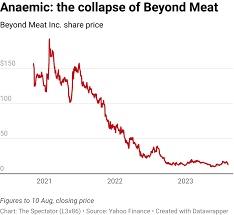
In commenting on results Ethan Brown president and CEO stated:- “Though we are encouraged by pockets of growth, particularly in the EU where we saw double digit gains in net revenues on a year-over-year basis, we are disappointed by our overall results as we continue to experience worsening sector-specific and broader consumer headwinds. As we shared last week, we are conducting a review of our global operations for purposes of further and significantly reducing our operating expense base as we seek to accelerate our transition to a sustainable and, ultimately, profitable business. And while we expect current headwinds to persist in the coming quarters, we have confidence in the long-term trajectory of our business, its central relevance to the intensifying health, climate and natural resource challenges facing our global community, and our ability to emerge as a stronger, leaner organization as a result of the decisive measures we are undertaking to fit the current macroeconomic reality and business environment.”
Despite this optimistic commentary the reality includes:-
- An accumulated deficit of $1,081 million.
- Trailing 12-month negative operating cash flow of $108 million
- Inventory valued at $130,336 representing 1.8 times Q4 sales
- Effective February 29th 38.1 percent of float was short
- Share price off 47.9 percent over past 12 months
- Institutional holdings declined from 63 percent to 39 percent over past year.

|
Foster Farms Appoints new CEO and CFO
|
03/21/2024 |
|
 Foster Farms has announced that Jayson Penn will serve as CEO effective March 18th. He succeeds Donnie Smith, previously CEO of Tyson Foods after retiring in 2016. Smith was appointed as CEO, presumably as a caretaker in 2022, following the acquisition of the family-owned company by Atlas Holdings. Foster Farms has announced that Jayson Penn will serve as CEO effective March 18th. He succeeds Donnie Smith, previously CEO of Tyson Foods after retiring in 2016. Smith was appointed as CEO, presumably as a caretaker in 2022, following the acquisition of the family-owned company by Atlas Holdings.
Penn was most recently President of John Soules Food having served previously as CEO of Pilgrim’s Pride Corp. and gaining experience at Case Foods, Marshall Durbin Company and Sanderson Farms.
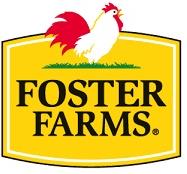 James Richards was named CFO. His experience includes two decades at General Electric Company in senior financial positions and, most recently, participating in turnaround of businesses including Kodi Collective. James Richards was named CFO. His experience includes two decades at General Electric Company in senior financial positions and, most recently, participating in turnaround of businesses including Kodi Collective.
A spokesperson for Atlas Partners, Sam Astor, Ed Fletcher and Mike Sher, stated, “We are excited to have Jason on board to lead the transformation journey now underway. He brings immediate strength to the leadership team from his industry experience and commitment to operational excellence.”
|
Retirement of USAPEEC China Representative Ms. Sarah Li
|
03/19/2024 |
|
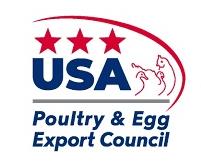  The March 18th edition of USAPEEC MondayLine includes a tribute to Sarah Li who has retired after 38 years representing our poultry export promotion organization in China and Taiwan. Appointed as the Director for Market Development for the region in 1989, Sarah opened the first USAPEEC office in China in the city of Shanghai in the early 1990s followed by the Beijing office in the early 2000s. The March 18th edition of USAPEEC MondayLine includes a tribute to Sarah Li who has retired after 38 years representing our poultry export promotion organization in China and Taiwan. Appointed as the Director for Market Development for the region in 1989, Sarah opened the first USAPEEC office in China in the city of Shanghai in the early 1990s followed by the Beijing office in the early 2000s.
She notes as significant career achievements the opening of both the China and Taiwan markets over a 20-year period following her appointment. This required representation and negotiation with officials in China including the General Administration of Quality Supervision, Inspection and Quarantine and also Customs Agency over the years. Apart from long-term market development, Sarah has been instrumental in firefighting when consignments were embargoed or situations required urgent resolution through her abilities and contacts.
|
Bezos Earth Fund to Invest $60 Million on Improving Plant-Based Meats
|
03/19/2024 |
|

The Bezos Earth Fund will distribute grants to the value of $60 million to various research institutions including universities to improve the texture and taste of plant-based meat. This allocation will be part of a $1 billion fund intended to “transform the food industry”.
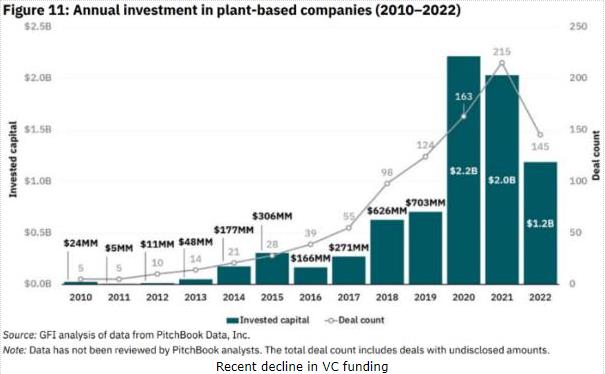
Proponents of plant-based meat alternatives now recognize the lack of consumer acceptance of the category characterized by declining sales. Producers of faux meat that publish financial reports confirm losses.
Andy Jarvis, Director of the Future of Food, at the Bezos Earth Fund, quoted in Bloomberg, observed that plant-based substitutes for meat “need to cost less and need to be more flavorful”. This is a tacit admission of the inferiority of current plant-based products and lack of variety despite higher prices.
|
Product of USA Label Evokes Protests from Mexico
|
03/19/2024 |
|
The Department of Agriculture and Rural Development of the Republic of Mexico has expressed opposition to the recent announcement of the USDA Voluntary Product of USA Label Rule.
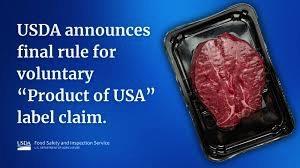
Mexico, our partner in the USMCA believes that the Rule does not recognize the extent of integration of livestock and meat industries within North America and represents an unnecessary trade barrier inconsistent with the World Trade Organization. The Voluntary Product of USA Rule could be regarded as a successor to the Country of Origin Label (COOL) that was the subject of a WTO dispute panel leading to an adverse ruling against the U.S.
The Product of USA Rule is a domestic matter and responds to consumer demands for a clear, concise and certainly non-ambiguous label descriptor confirming that beef, pork, 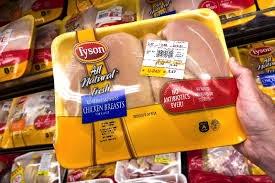 chicken and turkey products were derived from herds or flocks born or hatched and then grown, processed and packed entirely in the U.S. Previously, cattle or hogs were imported into the U.S., slaughtered, packed and distributed with a Made in the U.S. label. chicken and turkey products were derived from herds or flocks born or hatched and then grown, processed and packed entirely in the U.S. Previously, cattle or hogs were imported into the U.S., slaughtered, packed and distributed with a Made in the U.S. label.
It is anticipated that Canada will raise objections to the Product of USA Rule on the basis of discrimination in trade, contrary to USAMC and WTO regulations.

|
USPOULTRY 2024 Poultry Processor Workshop
|
03/18/2024 |
|
 The annual Poultry Processor Workshop for 2024 will be held May 15-16 at the Embassy Suites by Hilton Downtown, in Nashville, TN. The annual Poultry Processor Workshop for 2024 will be held May 15-16 at the Embassy Suites by Hilton Downtown, in Nashville, TN.
Featured speaker will be Dr. Jose Emilio Esteban, Undersecretary of the USDA for the Food Safety and Inspection Service. Other speakers will include Clint Rivers, CEO of Wayne- Sanderson Farms, with his perspectives on leadership. Topics will comprise animal welfare, reduction of Salmonella contamination, adapting to a changing workforce, process safety, automation and a series of case studies in plant management.
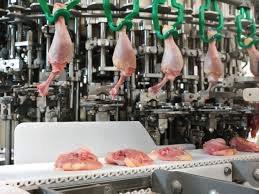
For additional information including the agenda, registration and booking access <www.uspoultry.org>.
|
House of Raeford Planning New Plant in Aiken, SC.
|
03/15/2024 |
|
 The City Council of Aiken, SC. voted 6-1 to approve a procesOing plant to be built by House of Raeford. There was general acceptance of the project, but with some concern over the volume of water required and the treatment of effluent. Final approval will depend on passage of a water ordinance and approval of a tax agreement with Aiken County. The City Council of Aiken, SC. voted 6-1 to approve a procesOing plant to be built by House of Raeford. There was general acceptance of the project, but with some concern over the volume of water required and the treatment of effluent. Final approval will depend on passage of a water ordinance and approval of a tax agreement with Aiken County.

Predictably, the project has the support of the State of South Carolina since it will create employment opportunities for contractors and potential sales for farmers producing corn and soybeans.
|
FSIS to Exclude Vaccine Strains of Salmonella from Performance Standards
|
03/12/2024 |
|
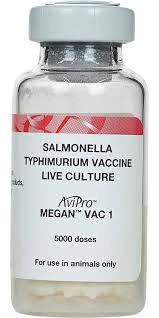 The Food Safety and Inspection Service (FSIS) of the USDA has announced that vaccine strains of Salmonella administered to flocks would be excluded from calculations applied to establish the status of plants under the Raw Poultry Performance Standards. The Food Safety and Inspection Service (FSIS) of the USDA has announced that vaccine strains of Salmonella administered to flocks would be excluded from calculations applied to establish the status of plants under the Raw Poultry Performance Standards.
It is recognized that vaccine strains are innocuous given multiple gene deletion and with their biological activity confined to stimulating an antibody response. The decision by the FSIS was based on an analysis of data from eleven pilot projects evaluating pre-harvest strategies.
Dr. Ashley Peterson, NCC Senior Vice President of Scientific and Regulatory Affairs, stated, “Companies will no longer be penalized for using a Salmonella vaccine should the strain be detected in the processing facility by FSIS.”
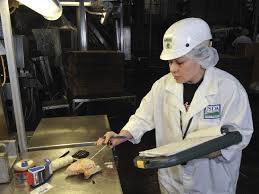
Before the change in FSIS policy that will be effective on April 1st, any vaccine strain Salmonella isolated counted against the participating establishment and effectively served as a deterrent to vaccination as a viable intervention measure. The change in policy will be beneficial to producers and ultimately, consumers given the efficacy of vaccination.

|
USDA Awarding Grants for Local Meat Production
|
03/12/2024 |
|
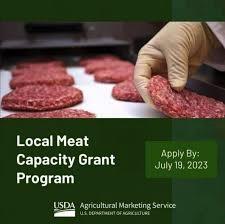 On March 11th, USDA announced grants totaling $9.5 million to 42 projects under the Local Meat Capacity Grant Program. This tranche is part of the $75 million available as announced in April 2023. The intent is to “build resilience in the meat and poultry supply chain by providing producers with more local processing options and strengthening their market potential”. On March 11th, USDA announced grants totaling $9.5 million to 42 projects under the Local Meat Capacity Grant Program. This tranche is part of the $75 million available as announced in April 2023. The intent is to “build resilience in the meat and poultry supply chain by providing producers with more local processing options and strengthening their market potential”.
The USDA Agricultural Marketing Services administering the program has entered into an agreement with the New Hampshire Community Loan Fund to process grant awards. These will range from $10,000 to $250,000 to purchase processing equipment including mixers, smokers and packaging installations.
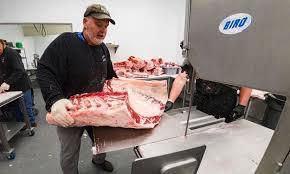
It is questioned whether awards with an average of $226,000 will make any impact on national production although most individual recipients in various localities will benefit. As with all “giveaway” programs implemented under the present Administration it is questioned how the USDA AMS will evaluate increased productivity and improved financial performance given that taxpayer funds are involved. Do we anticipate an accounting in four years’ time? Naah!

|
Olymel Transitions to Profit
|
03/12/2024 |
|
Following restructuring and radical reduction in operating costs, Canadian Cooperative, Olymel LB posted a profit of $101 million for Fiscal 2023 compared to a loss of $329 million in FY2022.
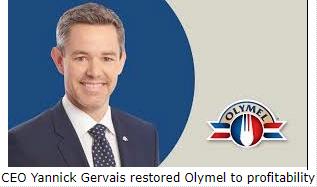
According to Pascal Houle, CEO of the holding company, Sollio Cooperative Group, by closing unproductive plants, reducing headcount and adjusting production to balance sales contributed to the turnaround.
Houle commented, “The pork industry is in a major crisis around the world.” He added, “We all want a strong, dynamic pork sector that is a goal of the robust recovery plan we implemented.”
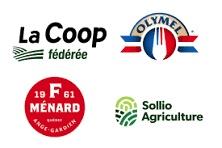
The improved profitability attained by Olymel is a model for companies producing livestock that are obliged to trim expenses and unprofitable facilities in accordance with market realities. It is apparent that the major broiler integrators are evaluating efficiency and productivity as evidenced by Tyson Foods closing broiler plants in Missouri and Arkansas and a large hog plant in Iowa. Smithfield Foods has closed sow operations and plants. Companies are consolidating production to achieve cost efficiency.

|
Tyson Foods and JBS USA Settle Wage Lawsuit
|
03/12/2024 |
|
 Tyson Foods has agreed to pay $72 million and JBS $55 million to the worker class alleging wage fixing. Settlements have already been negotiated Tyson Foods has agreed to pay $72 million and JBS $55 million to the worker class alleging wage fixing. Settlements have already been negotiated 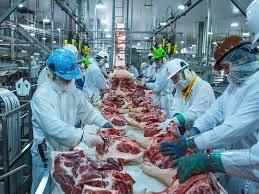 by Perdue Farms and Seaboard Foods and others amounting to $139 million. The Plaintiffs claimed collusion in establishing wage rates in areas where the packers operated and agreed to ‘no-poach’ agreements restricting employment options for potential hires. by Perdue Farms and Seaboard Foods and others amounting to $139 million. The Plaintiffs claimed collusion in establishing wage rates in areas where the packers operated and agreed to ‘no-poach’ agreements restricting employment options for potential hires.
|
USDA-AMS Purchases
|
03/10/2024 |
|
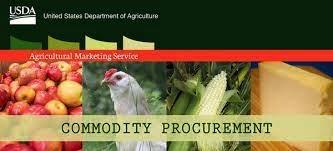 On March 5th, the USDA Agricultural Marketing Service announced purchase of chicken products for child nutrition and related food assistance programs to be delivered over the second quarter of 2024. On March 5th, the USDA Agricultural Marketing Service announced purchase of chicken products for child nutrition and related food assistance programs to be delivered over the second quarter of 2024.
Purchases to be delivered July through December 2024 included:
- 1,215,000 cases of boned chicken in cans at an average price of $2.17 per lb.
- 44,800 cases of boned chicken in pouches at an average price of $43.40 per case.
The total value of the purchase was $4,565,333
On March 6th the USDA Agricultural Marketing Service announced purchase of 860,000 cases of chicken to be delivered July through December 2024 comprising:
- 480,000 cases of boned chicken in pouches at an average price of $42.31 per case
- 190,000 cases of frozen leg quarters at an average price of $30.20 per case
- 190,000 cases of frozen drumsticks at an average price of $31.48 per case

The total value of the purchase was $32,294,194
The two purchases amounted to $36,294,194 million.
|
Ministry of Agriculture in China to Regulate Sow Numbers
|
03/07/2024 |
|
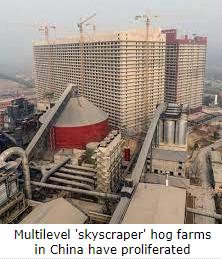 To prevent overproduction and to limit the importation of feed grains and soybeans, the Agricultural Ministry of China will place a cap on the number of sows in the national herd and the expansion of farms producing pork. Overproduction has reduced prices resulting in a sharp decline in imports. To prevent overproduction and to limit the importation of feed grains and soybeans, the Agricultural Ministry of China will place a cap on the number of sows in the national herd and the expansion of farms producing pork. Overproduction has reduced prices resulting in a sharp decline in imports.
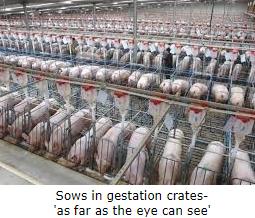 The Ministry statement included, “the normal retention and fluctuation in the range of fertile sows in production, capacity reduction and other measures set in the previous regulatory plan are no longer well adapted to ensure stable feed production under the new situation.” The national target for breeding sows will be reduced from 41 million to 39 million. The Ministry statement included, “the normal retention and fluctuation in the range of fertile sows in production, capacity reduction and other measures set in the previous regulatory plan are no longer well adapted to ensure stable feed production under the new situation.” The national target for breeding sows will be reduced from 41 million to 39 million.
Overproduction of pork, the preferred animal protein in China, with correspondingly low prices is deleterious to domestic broiler production and imports. Rationalizing production should level the playing field to the benefit of processors and exporters.
|
Transition of JBS From PSSI Proceeding
|
03/07/2024 |
|
Packers Sanitation Services Inc. (PSSI) has issued a warning notice to the state of Colorado that employees would be laid off following termination of the contract to clean plants for JBS including Greeley Co. JBS established an internal company cleaning service following the PSSI debacle over employment of under-aged workers. It is understood that the displaced PSSI workers will be engaged by JBS subject to eligibility.
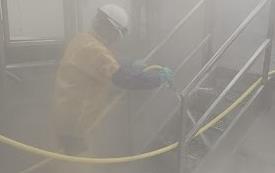
PSSI paid a fine of $1.5 million and entered into a consent agreement with the Department of Justice. The CEO was replaced and the company appointed a qualified Compliance Officer. Notwithstanding these changes PSSI has lost revenue and it will take years to rebuild image and credibility in the industry.
|
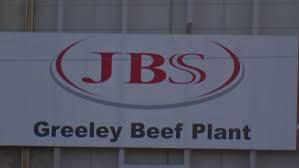
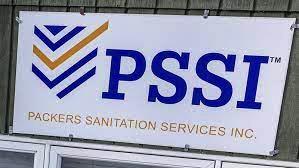
|
|
Six Integrators Settle with Direct Purchasers
|
03/07/2024 |
|
 Six integrators and Agri-Stats recently reached a settlement with plaintiffs in the broiler chicken antitrust lawsuit before the U.S. District Court for the Northern District of Illinois. Companies that recently settled comprise: Six integrators and Agri-Stats recently reached a settlement with plaintiffs in the broiler chicken antitrust lawsuit before the U.S. District Court for the Northern District of Illinois. Companies that recently settled comprise:
The plaintiffs alleged collusion among integrators based on electronic communications and conservations at association gatherings and also indirectly by subscription to Agri-Stats an industry cost benchmarking system. Settlements attained $284 million prior to the latest agreements.
|
USDA Finalizes Inclusive Competition and Market Integrity Rule
|
03/06/2024 |
|
 In a March 5th announcement, the USDA detailed the Inclusive Competition and Market Integrity Rule under the Packers and Stockyards Act. The purpose is to “establish clearer, more effective standards under the Packers and Stockyards Act for prohibited practices in contracting”. In a March 5th announcement, the USDA detailed the Inclusive Competition and Market Integrity Rule under the Packers and Stockyards Act. The purpose is to “establish clearer, more effective standards under the Packers and Stockyards Act for prohibited practices in contracting”.
The Final Rule is one of a series initiated through an Executive Order on promoting competition in the U.S. economy.
The Rule is intended to: -
- Prohibit adverse treatment of livestock producers and poultry growers based on race, religion, national origin, gender, disability or age. The rule includes protection for cooperatives.
- Prohibit retaliation against producers and growers engaging in lawful communications, participation in associations and cooperatives or evaluating business relationships with competing packers or integrators.
- Prohibit false or misleading statements or omission of material information in contracts.
- Support monitoring, evaluation and enforcement of compliance by the USDA through records.

The Final Rule will become effective 60 days after publication in the Federal Register.
Predictably and justifiably Industry trade associations have commented negatively on the Rule.
It was characterized by the NCC as a manifestation of the Administration’s “anti-business regulatory agenda driven by far-left activists” The Council also noted the cost of compliance through additional record keeping.
The NAMI was skeptical that the Rule would increase competition and would have the undesirable effect of encouraging lawsuits over contracts.

|
Trader Joe’s Recalls 30 Tons of Dumplings
|
03/06/2024 |
|
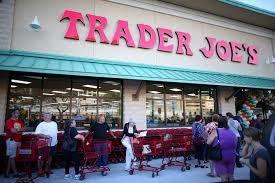 According to a March 4th announcement, Trader Joe’s has recalled close to 30 tons of steamed chicken soup dumplings. The product, contaminated with plastic particles was manufactured on December 7, 2023, and has been distributed nationwide. The dumplings were produced by CJ Foods Manufacturing Beaumont Corp. in California. Since the source of the plastic was apparently a permanent marker, at least 59 tons of product will have been wasted if not already consumed. This suggests imperfect documentation relating to specific batches produced. According to a March 4th announcement, Trader Joe’s has recalled close to 30 tons of steamed chicken soup dumplings. The product, contaminated with plastic particles was manufactured on December 7, 2023, and has been distributed nationwide. The dumplings were produced by CJ Foods Manufacturing Beaumont Corp. in California. Since the source of the plastic was apparently a permanent marker, at least 59 tons of product will have been wasted if not already consumed. This suggests imperfect documentation relating to specific batches produced.
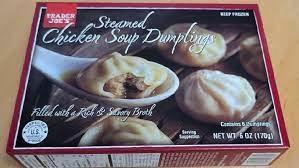
This incident is the latest in a series of recalls by Trader Joe’s that suggest that their suppliers are deficient in quality control. The Company should exert pressure to attain and maintain acceptable standards of manufacture and inspection. This might require paying more for the product.
|
Mineral Oil Contamination Leads to Recall
|
03/05/2024 |
|
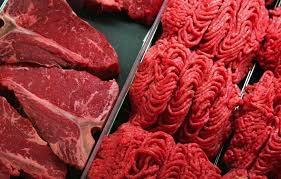 MF Meats located in Falconer NY. has recalled 46 tons of raw meat products contaminated with mineral oil disallowed by FSIS. Over the period November 26, 2023, through February 16, 2024, the Company used a nonapproved mineral oil in the place of food-grade lubricant due to an error made by a supplier. MF Meats located in Falconer NY. has recalled 46 tons of raw meat products contaminated with mineral oil disallowed by FSIS. Over the period November 26, 2023, through February 16, 2024, the Company used a nonapproved mineral oil in the place of food-grade lubricant due to an error made by a supplier.
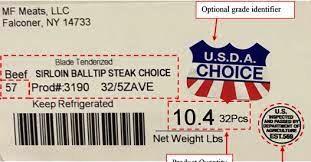
The problem was recognized following complaints of abnormal taste leading to an investigation that disclosed the misapplication of mineral oil. It is evident that a proportion of the recalled meat has been consumed although there have been no reports of adverse reaction. As with all major recalls, FSIS will verify procedures relating to notification of customers and removal of affected the product from the market.
|
NTF Announces 2024 Officers
|
03/04/2024 |
|
 Officers for the 2024 term were elected by the Board of Directors of the National Turkey Federation at the annual convention held in Austin, TX. John Zimmerman was elected Chairman, Jay Jandrain as Vice-chairman, Thierry Murad as Secretary-Treasurer. Steven Lykken will serve as Immediate Past |Chairman. Officers for the 2024 term were elected by the Board of Directors of the National Turkey Federation at the annual convention held in Austin, TX. John Zimmerman was elected Chairman, Jay Jandrain as Vice-chairman, Thierry Murad as Secretary-Treasurer. Steven Lykken will serve as Immediate Past |Chairman.
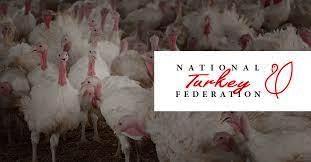
In his inaugural comments Zimmerman noted challenges in the coming year including HPAI, food safety policies and expanding international trade.
|
Columbia to Resume Importing U.S. Poultry Products
|
03/04/2024 |
|
 Following intensive negotiations motivated by USAPEEC, authorities in Columbia have lifted the ban on importation of poultry and egg products from the U.S. Trade ceased in August 2023 as a result of outbreaks of HPAI in various states. Following intensive negotiations motivated by USAPEEC, authorities in Columbia have lifted the ban on importation of poultry and egg products from the U.S. Trade ceased in August 2023 as a result of outbreaks of HPAI in various states.
Critical to the restoration of trade was the facilitation by USAPEEC for a visit by representatives of Columbia to verify surveillance and control measures.
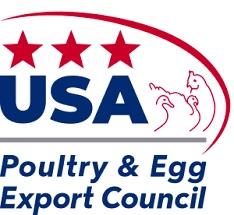
In 2023, Columbia imported 44,164 metric tons of broiler products from the U.S. before the embargo, valued at $53.8 million. Prior to termination of shipments in September 2023 Columbia imported 36 percent less product compared to the corresponding months in 2022 with value down 46 percent.
|
Hormel Foods Reports on Q1 FY 2024
|
03/03/2024 |
|
In a February 29th release, Hormel Foods Corporation (HRL) reported the results for the first quarter of FY 2024 ending January 28, 2024.
Hormel Foods no longer identifies Jennie-O Turkey Store as an operating segment. Turkey products are now incorporated into the financial results for the Retail, Food Service and International segments.
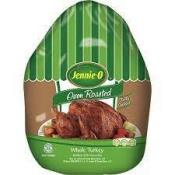
For the quarter, Hormel Foods Corporation earned $218.86 million on net sales of $2,997 million with a diluted EPS of $0.40. These figures compared to the corresponding first quarter of FY 2023 ending January 29th. Net earnings amounted to $217.72 million on net sales of $2,971 million with a diluted EPS of $0.40.
For fiscal 2024 Hormel projects diluted EPS in the range of $1.43 to $1.57.
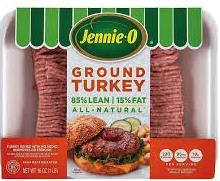
The only reference to Jennie-O for the quarter was a note that “retail volume and sales of Jennie-O turkey items increased including above-category performance in the fresh ground turkey category. Jennie-O branded items in food service delivered double-digit volume and net sales growth.”

|
USDA-AMS Purchases
|
03/03/2024 |
|
 On February 23rd, the USDA Agricultural Marketing Service announced purchase of of chicken products for child nutrition and related food assistance programs to be delivered over the second quarter of 2024. On February 23rd, the USDA Agricultural Marketing Service announced purchase of of chicken products for child nutrition and related food assistance programs to be delivered over the second quarter of 2024.
Purchases included:
- 20,800 cases of boneless breasts at an average of $72 per case
- 133 tons of frozen cut-up chicken at $1.91 per lb.
- 21,850 cases of frozen drumsticks at $29.82 per case
- 1,861 tons of whole frozen chicken at $0.99 per lb.
The total value of the purchase was $6,295,329

On February 28th the USDA Agricultural Marketing Service announced purchase of 6,984 tons of chilled large chicken in bulk, also for child nutrition and related food assistance programs. Product was purchased at an average of $1.58 per pound with deliveries during April 2024.
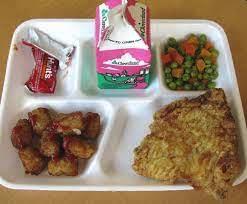
The two purchases amounted to $26,656,018 million.
|
Missouri Beef Packing Plant to Close Over Defective Discharge Treatment
|
03/01/2024 |
|
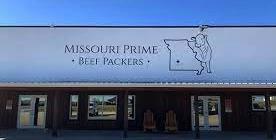 Missouri Prime Beef will close the Pleasant Hope facility in April. This will impact 335 workers. At issue was the treatment of effluent to be discharged into the Pomme de Terre River. The Department of Natural Resources for the state of Missouri denied the company a water discharge petition. The application elicited over 1,000 negative comments from citizens of the state. Missouri Missouri Prime Beef will close the Pleasant Hope facility in April. This will impact 335 workers. At issue was the treatment of effluent to be discharged into the Pomme de Terre River. The Department of Natural Resources for the state of Missouri denied the company a water discharge petition. The application elicited over 1,000 negative comments from citizens of the state. Missouri  Prime had a capacity of 750 head of cattle per day and was acquired in 2023 by SDX Beef Company based in Texas. According to press reports the new owners are now reviewing alternative treatment solutions to allow the plant to reopen and restore production and jobs. Prime had a capacity of 750 head of cattle per day and was acquired in 2023 by SDX Beef Company based in Texas. According to press reports the new owners are now reviewing alternative treatment solutions to allow the plant to reopen and restore production and jobs.
|
Courts Rule Against HSUS in Line Speed Lawsuit
|
03/01/2024 |
|
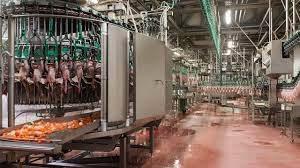 The U.S. District Court for the Northern District of California has ruled against the Humane Society of the U.S. and co-petitioners concerning line speeds in poultry processing plants. At issue is the USDA New Poultry Inspection System allowing up to 175 birds per minute. The U.S. District Court for the Northern District of California has ruled against the Humane Society of the U.S. and co-petitioners concerning line speeds in poultry processing plants. At issue is the USDA New Poultry Inspection System allowing up to 175 birds per minute.
The Court ruled that the animal rights groups lacked standing on the issue dismissing the case without prejudice. This will allow the petitioners to return with an amended complaint.
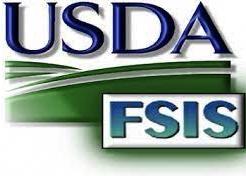 The lawsuit filed in 2020 has little to do with welfare of either birds or workers. Progressively higher line speeds are now possible due to advances in equipment design. Lawsuits verging on the frivolous are filed purely on the basis of opposition to all forms of intensive livestock production. Innovation that increase efficiency and hence the prospect of enhanced profitability inevitably becomes a targets for legal challenge. The lawsuit filed in 2020 has little to do with welfare of either birds or workers. Progressively higher line speeds are now possible due to advances in equipment design. Lawsuits verging on the frivolous are filed purely on the basis of opposition to all forms of intensive livestock production. Innovation that increase efficiency and hence the prospect of enhanced profitability inevitably becomes a targets for legal challenge.
|
R-CALF Requesting Exemption from EPA Environmental Reporting Regulations
|
03/01/2024 |
|
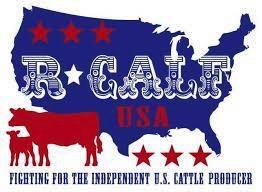 In 2021, the White House issued a Presidential Executive Order directing the EPA among other federal agencies to intensify action to mitigate climate change. Accordingly, all concentrated animal feeding operations (CAFOs) were required to determine and report on emissions, a demand considered both impractical and burdensome. In 2021, the White House issued a Presidential Executive Order directing the EPA among other federal agencies to intensify action to mitigate climate change. Accordingly, all concentrated animal feeding operations (CAFOs) were required to determine and report on emissions, a demand considered both impractical and burdensome.
R-CALF (Ranchers-Cattlemen Action Legal Fund-United Stockgrowers’ of America) has requested the EPA to define and classify feedlots according to capacity ranging from family farms to CAFOs with up to 50,000 head. R-CALF has requested exemption for family farms and operations using grazing, irrespective of the presence of corrals or other structures required for handling livestock.
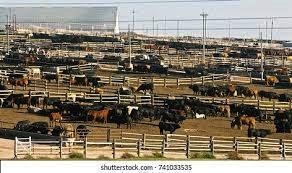 R-CALF called on EPA to “refrain from imposing any additional regulatory burdens on America’s family farmers and ranchers.” The organization makes a valid case that if small family farms are driven out of production by onerous regulations, their capacity would inevitably be replaced by even larger feedlots. R-CALF called on EPA to “refrain from imposing any additional regulatory burdens on America’s family farmers and ranchers.” The organization makes a valid case that if small family farms are driven out of production by onerous regulations, their capacity would inevitably be replaced by even larger feedlots.
Environmental reporting requirements for CAFOs are an important consideration for poultry production complexes with the potential to impose expense and require time to provide data that will ultimately be applied to the disadvantage of the industry

|
Ukraine Chicken Industry Resilient During War
|
02/27/2024 |
|
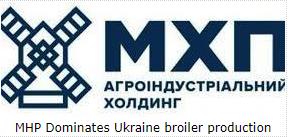 According to USDA-FAS GAIN Report, UP2024-0004, released February 22nd, chicken production in 2024 will expand by 3.1 percent to 1.340 million metric tons. Total imports will attain 52,000 metric tons and exports 440,000 metric tons with net exports representing 29 percent of production. Of the 952,000 metric tons for domestic use, per capita, will attain 26kg (57 lbs.) assuming a population of 37 million. According to USDA-FAS GAIN Report, UP2024-0004, released February 22nd, chicken production in 2024 will expand by 3.1 percent to 1.340 million metric tons. Total imports will attain 52,000 metric tons and exports 440,000 metric tons with net exports representing 29 percent of production. Of the 952,000 metric tons for domestic use, per capita, will attain 26kg (57 lbs.) assuming a population of 37 million.
Despite the invasion of Ukraine by the Russian Federation in 2022, the chicken industry has survived and expanded. This, in part, is due to the location of facilities in the central and western regions of the Nation together with the availability of grains at relatively low cost.
Production in Ukraine is dominated by MHP SE, responsible for 70 percent of output. This public-traded company has received loans through recent critical periods and enjoys the benefits of full integration from cultivation of feed ingredients, oil seed crushing, live production, processing and distribution. In addition to MHP, medium-sized producers include Agrooven, Dniprovskyi, Volldymyr-volynsk, PTA Hofabryka, Hubyn and Ular. Collectively, MHP and these companies are responsible for 90 percent of production.
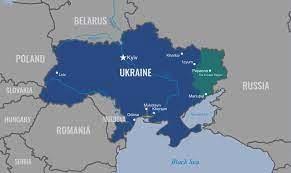
Following the 2022 invasion, supply chains were disrupted and the Black Sea export route was closed. Labor availability was impacted by workers who volunteered for military service and as a result of conscription. During late 2022 and through 2023, infrastructure was repaired and the front line in the east of the nation was stabilized. Following the collapse of the Black Sea Grain Initiative, Ukraine established export capability through the coast-hugging Humanitarian Corridor and by rail transport. Currently exports are restrained by a shortage of refrigerated containers.
The E.U. is the main importer of chicken from Ukraine based on tariff-free and quota-free market access granted by the European Commission. Other factors favoring Ukraine include proximity to E.U. markets and a favorable production cost relative to Eastern Europe.

Europe intends to impose tariffs above a level of 160,000 metric tons although below exports to the E.U. in 2023. In the event that Ukraine becomes non-competitive above the free-trade level as a result of tariffs, the nation will explore export opportunities for exports to the Middle East.

|
Ruling on Massachusetts Question Three
|
02/27/2024 |
|
 Judge Willian Young of the U.S. District Court for the District of Massachusetts determined that exemptions to the Prevent Cruelty to Farm Animals Act (Question 3) were unconstitutional. Judge Willian Young of the U.S. District Court for the District of Massachusetts determined that exemptions to the Prevent Cruelty to Farm Animals Act (Question 3) were unconstitutional.
The case arose from a lawsuit filed by Triumph Foods and other packers challenging the constitutionality of the Massachusetts law enacted by ballot.
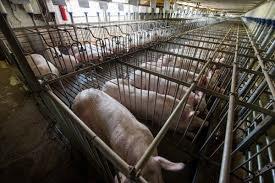
Judge Young ruled that the exemption to the state law was in violation of the dormant Commerce Clause. His ruling is at variance with the May SCOTUS decision upholding California Proposition 12 that ignored the concept of interference in interstate commerce. Currently, the three existing packers in Massachusetts enjoy an advantage with respect to housing of sows over out-of-state pork processers.
|
Child Labor Persists in Contract Cleaning Sector
|
02/26/2024 |
|
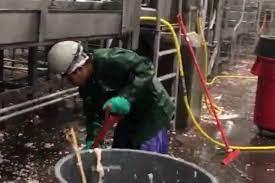 The U.S. Department of Labor has filed for a temporary restraining order on Fayette Janitorial Services, LLC to prevent employment of minors in plant-cleaning operations. According to documents submitted to the U.S. District Court for the northern district of Iowa, the company has employed minors in sanitation activities at plants in Iowa and Virginia. The U.S. Department of Labor has filed for a temporary restraining order on Fayette Janitorial Services, LLC to prevent employment of minors in plant-cleaning operations. According to documents submitted to the U.S. District Court for the northern district of Iowa, the company has employed minors in sanitation activities at plants in Iowa and Virginia.
A spokesperson for Perdue Farms that terminated the contract with Fayette prior to the Department of Labor action, stated, “Underage labor has no place in our business or in our industry. Perdue has strong safeguards in place to ensure that all associates are legally eligible to work in our facilities and we expect the same of our vendors.”

The Department of Labor is intent on enforcing federal law relating to employment of children in dangerous occupations and generally safeguarding workers.
Fayette Janitorial Services, LLC, based in Somerville, TN, operates in 30 states with 600 employees.
In addition to contravention of child labor laws, the investigation will also include possible trafficking and exploitation. If documented, cases will be referred to the Department of Justice.

|
USDA Informational Webinar on Contracting
|
02/26/2024 |
|
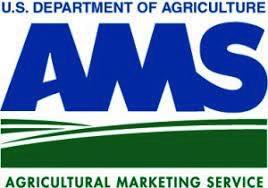 The following notice was posted by the USDA –AMS regarding a webinar to inform Contractors of the obligations of Integrators with regard to transparency. The following notice was posted by the USDA –AMS regarding a webinar to inform Contractors of the obligations of Integrators with regard to transparency.
“The U.S. Department of Agriculture (USDA) Agricultural Marketing Service (AMS) will host a webinar Mar. 7, 2024, at noon ET, for poultry growers to share information regarding the Transparency in Poultry Grower Contracting and Tournaments Final Rule.
Registration is required: https://www.zoomgov.com/meeting/register/vJItde-qqz4iHka5SbLDXxJupqPctYz01qg
Attendees may submit questions in advance to AMS-AskPSD@usda.gov. Questions will also be accepted during the webinar.
USDA published the final rule in the Federal Register Nov. 28, 2023, and it became effective Feb. 12, 2024. The rule requires Live Poultry Dealers – typically large processing companies – to provide poultry growers with whom they contract to raise birds key information about terms of their agreements.

The rule requires additional disclosures by live poultry dealers engaged in the production of broilers who use poultry grower ranking systems to determine settlement payments for broiler growers.
The rule also requires live poultry dealers to disclose projections of average annual gross payments to broiler growers under contract with the complex with the same housing specifications for the term of the broiler growing arrangement.
Additional information on the rule can be found on the AMS website”.

|
STOP PRESS
|
02/26/2024 |
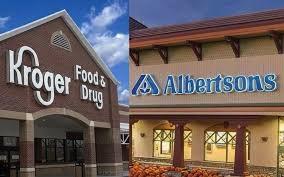
 |
 FTC Blocks Kroger-Albertsons Merger FTC Blocks Kroger-Albertsons Merger
In a belated but expected action on Monday 26th February, the Federal Trade Commission (FTC) initiated action to block the proposed merger (acquisition?) between The Kroger Company and Albertsons Corp. The Agency issued an Administrative Complaint to be heard by an Administrative Law Judge in addition to filing a lawsuit in the U.S. District Court in Oregon to block the transaction. The FTC was joined in the action by Attorneys General representing eight states.
|
|
Pilgrim’s Pride Corp. Reports on Q4 and FY 2023
|
02/26/2024 |
|
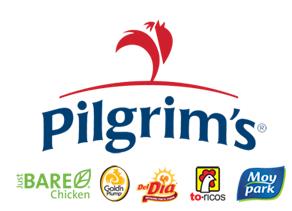 In a press release dated February 26th Pilgrim’s Pride Corp. (PPC) announced results for the 4th Quarter and FY 2023 ending December 31st 2023. The quarterly figures showed positive earnings for all three segments with higher revenue and operating profit across all three geographic areas. Earnings were appreciably above Q4 2022 and exceeded consensus estimates on the top and bottom lines. In a press release dated February 26th Pilgrim’s Pride Corp. (PPC) announced results for the 4th Quarter and FY 2023 ending December 31st 2023. The quarterly figures showed positive earnings for all three segments with higher revenue and operating profit across all three geographic areas. Earnings were appreciably above Q4 2022 and exceeded consensus estimates on the top and bottom lines.
The following table summarizes the results for Q4 2023 derived from the SEC 10-Q form and the Company release. Values are compared with the corresponding Q3 FY 2022 (Values expressed as US$ x 103 except EPS)
|
4th Quarters 2023 and 2022, Ending
|
December 31st 2023
|
December 25th
2022
|
Difference (%)
|
|
Sales:
|
$4,528,302
|
$4,127,365
|
+9.7
|
|
Gross profit:
|
$321,047
|
$95,782
|
+342.4
|
|
Operating income:
|
$184,299
|
$(77,524)
|
+337.7
|
|
Pre-tax Income
Net Income*
|
$156,628
$134,211
|
$(129,786)
$(154,976)
|
+220.7
+186.6
|
|
Diluted earnings per share:
|
$0.57
|
$(0.66)
|
+186.4
|
|
Gross Margin (%)
|
7.1
|
2.3
|
+208.7
|
|
Operating Margin (%)
|
4.1
|
-3.8
|
+315.8
|
|
Profit Margin (%)
|
3.0
|
-1.9
|
+257.9
|
|
Long-term Debt and other liabilities:
|
$3,584,369
|
$3,468,140
|
+3.4
|
|
12 Months Trailing:
|
|
|
|
|
Return on Assets (%)
|
2.3
|
|
|
|
Return on Equity (%)
|
1.1
|
|
|
|
Operating Margin (%)
|
4.7
|
|
|
|
Profit Margin (%)
|
0.2
|
|
|
|
Total Assets (approximately 21% intangibles)
|
$9,810,361
|
$9,255,769
|
+6.0
|
|
Intraday Market Capitalization July 28th
|
$6,840,000
|
|
|
- Q4 2023, $12.3 million interest income (Q4 2022, $1.5 million)
- Q4 2023 $3.9 million miscellaneous income (Q4 2022, $1.5 million)
- Q4 2023 $22.9 million gain in foreign currency transactions (Q4 2022 $16.5 million loss)

For FY 2023 Pilgrim’s Pride earned $351.57 million on net revenue of $17.36 million with a diluted EPS of $1.36. For FY 2022 the Company earned $745.54 million on net revenue of $17.47 million with a diluted EPS of $3.11.
Operating income and sales posted by the three business segments during Q4 2023 were:-
U.S. 69.6 percent of company operating income on 58.8 percent of sales
E.U and U.K. 31.2 percent of company operating income on 27.2 percent of sales
Mexico (0.8) percent of company operating income on 11.6 percent of sales
52-Week Range in Share Price of PPC: $19.96 to $31.15. 50-day Moving average, $27.67
Market Close: Friday 23rd February, pre-release $28.67.
Open Monday 26th February, post-release $30.60 up 6.7 percent.
Current Forward P/E 13
Equity held by insiders and holding Company: 82.7 percent, Institutions, 17.1 percent
In commenting on Q4 results Fabio Sandri, CEO stated “While our business faced a unique set of challenging conditions in 2023, we persevered as our team members maintained a leadership mindset and elevated their focus and execution of our strategy.
In the 4th quarter, the U.S. portfolio continued to profitably grow as Case Ready and Small Bird realized benefits from additional promotional activity with Key Customers, more distribution, and increased retail pricing spreads from competing proteins. Prepared Foods also gained further momentum as branded offerings expanded throughout retail and distribution improved in foodservice. As for Big Bird, operating costs continued to improve from increased production efficiencies and better market conditions”.
“Given the actual market conditions, the affordability and availability of chicken resonated with consumers. As such, we worked closely with our Key Customers in both retail and food service to drive increased traffic through promotions and broaden their lineup of chicken offerings across fresh and prepared items,”
In relation to Mexico Sandri stated, “Supply and demand fundamentals were challenging in October but gained strength in the 4thquarte. We further diversified our portfolio as our brands continue to gain strong traction with consumers and retailers alike. Our investments to increase capacity and reduce production risk through operational excellence are proceeding as planned. Key Customer relationships continue to strengthen as volumes ended up nearly double digits compared to full year 2022,”
For the operations in the U.K. and the E.U. Sandri stated,“ We demonstrated progress again in profitability improvement in the 4th quarter through Key Customer partnerships, branded innovation, and operational excellence. The efforts were accelerated by recent actions to further streamline our production networks and support activities.
Sandri concluded, “While we had challenging market conditions during the year, our commitment to sustainability remained firm. Our team identified ways to embed innovative practices in our business to simultaneously drive sustainability and enhance profitable growth”.

|
Continued Opposition to Carbon Dioxide Pipelines
|
02/26/2024 |
|
The Stanton County, NE. Commission recently denied a conditional use permit to Summit Carbon Solutions to build a pipeline that would ultimately link fifty ethanol plants with a disposal site in North Dakota.

The 3-0 vote was based on the need for more information on “health risks” and foreign investment in the project.
Apparently 90 percent of landowners in Stanton County have signed easement agreements based on an understanding of the issues and actually support the project.
Based on opposition in states other than Nebraska, Summit has postponed implementation of the project until 2026. The $5.5 billion, 2,000-mile pipeline would transit areas of Iowa, Minnesota, Nebraska and both Dakotas.
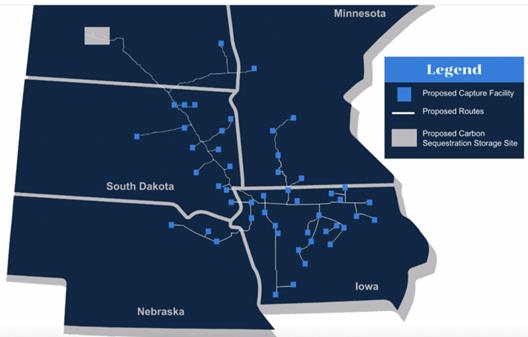
It is ironic that farmers in these corn-producing states who benefit directly from ethanol and support the questionable claims of environmental benefits, are unwilling to allow the pipeline project that would reduce the considerable quantity of carbon dioxide vented to the atmosphere by ethanol plants.

|
Protection for Producers Under the Packers and Stockyards Act
|
02/26/2024 |
|
 Senators Jon Tester (D-MT) and Chuck Grassley (R-IA) are urging the relevant House and Senate committees to oppose policy riders and to resist lobbying pressure in the FY 2024 Agriculture Appropriations Bill that might restrain the USDA from protecting suppliers. Senators Jon Tester (D-MT) and Chuck Grassley (R-IA) are urging the relevant House and Senate committees to oppose policy riders and to resist lobbying pressure in the FY 2024 Agriculture Appropriations Bill that might restrain the USDA from protecting suppliers.
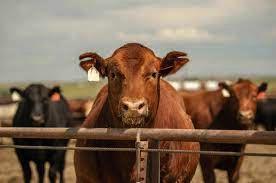
The Senators point to the 85 percent control of the domestic beef packing segment by four companies and the domination of hog packing with four companies controlling approximately 75 percent of capacity. The top four broiler integrators represent 55 percent of production but contracts and the unique relationship between the parties mitigates against exploitation.
|
Rising Prospect of Government Shutdown
|
02/26/2024 |
|
 According to press reports, Republican members of the House are becoming reconciled to the prospect of a government shutdown in March. According to press reports, Republican members of the House are becoming reconciled to the prospect of a government shutdown in March.
House Speaker Mike Johnson (R-LA) recently stated, “We think we going to meet the deadlines.” He is faced with the invidious choice of accepting support from Democratic members of the House or a possible revolt from his right flank that doomed his predecessor.
If an agreement is not reached before April 30th, across-the-board spending cuts will be imposed. Democrats have indicated that they will not support a further extension, given recent failure to achieve consensus within the majority party.

There are a number of issues impeding passage of appropriations bills most of which involve social considerations important to conservatives especially in an election year but representing a distraction from the governance of the Nation.
|
USAPEEC Establishes Mandarin Website
|
02/25/2024 |
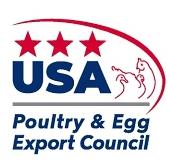 |
USAPEEC has officially launched www.usapeec.cn to promote the image of the U.S. broiler industry in the Mandarin language. The website will include items on the U.S. poultry industry, HACCP management, a buyer’s guide for chicken, turkey and eggs and will include relevant information from the existing website.
In a related matter USAPEEC will replace the weekly MondayLine with a web-based Export Report this will be continually updated with news and information replacing the weekly Friday version. The export report will also contain MemberAlerts relating to embargoes and issues impacting shipments.
|
|
UFCWU Supports Kroger-Albertsons Merger
|
02/25/2024 |
|
Breaking with the national United Food and Commercial Workers Union, Local 555 representing workers in Oregon, Washington, Idaho and Wyoming has endorsed the proposed merger between Kroger and Albertsons.
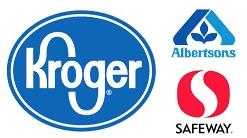 To date the National Union has expressed extreme opposition to the transaction. The action by Local 555 is based on concern over job security. The president of this Union and a Safeway worker, believes that divestment of Albertsons by Cerberus is inevitable, employees would rather the group be acquired by Kroger than by another entity. Ann Poff stated, “It’s foolish to think that stopping this merger means everything will stay the same.” She added, “Forcing Cerberus to continue to own Albertsons is not an option if they don’t sell to Kroger it will be to someone else.” Given profits generated by Albertsons this eventuality is not ordained. To date the National Union has expressed extreme opposition to the transaction. The action by Local 555 is based on concern over job security. The president of this Union and a Safeway worker, believes that divestment of Albertsons by Cerberus is inevitable, employees would rather the group be acquired by Kroger than by another entity. Ann Poff stated, “It’s foolish to think that stopping this merger means everything will stay the same.” She added, “Forcing Cerberus to continue to own Albertsons is not an option if they don’t sell to Kroger it will be to someone else.” Given profits generated by Albertsons this eventuality is not ordained.
The local Union may have been heartened by the commitment by C&S Wholesale Grocers to honor union agreements with respect to the 413 stores that will be acquired, many located in the states represented by UFCWU Local 555.
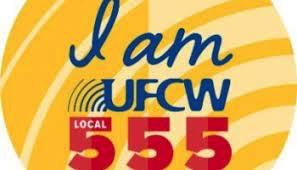
The position of the national UFCWU is that divestiture of stores to C&S Wholesale Grocers will be a replay of the Haggen debacle in 2015 when these locations were repurchased by Albertsons at a considerable discount resulting in subsequent closures and termination of employment. Local 555 are enigmatically seeking job security through the C&S Wholesale acquisition but this may well be wishful thinking.
The endorsement may well be moot given the decision of the FTC on February 26th to disallow the transaction.

|
JBS S.A. Delays NYSE Listing
|
02/24/2024 |
|
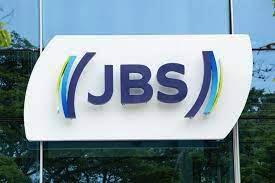 Following a previous announcement of a delay in listing during November 2023, JBS S.A. has indicated that it will file a registration statement with the Securities and Exchange Commission after the March 26 financial results are released. Following a previous announcement of a delay in listing during November 2023, JBS S.A. has indicated that it will file a registration statement with the Securities and Exchange Commission after the March 26 financial results are released.

JBS faces opposition from environmental activist groups and from Congress urging the NYSE to deny the listing.
|
Maple Leaf Foods Reports on Q4 and FY 2023
|
02/24/2024 |
|
 In a press release dated February 22nd Maple Leaf Foods Inc. (MFI-TO) announced results for Q4 and FY 2023 ended December 31st 2023. In a press release dated February 22nd Maple Leaf Foods Inc. (MFI-TO) announced results for Q4 and FY 2023 ended December 31st 2023.
The following table summarizes the results for the period compared with the values for the corresponding quarter of the previous fiscal year (Values expressed as US$ x 1,000 except EPS (conversion of CAN$1=US$0.74)
|
4th Quarter Ending December 31st.
|
2023
|
2022
|
Difference (%)
|
|
Sales:
|
$882,634
|
$877,286
|
+0.6
|
|
Gross profit:
|
$100,252
|
$74,425
|
+34.7
|
|
Operating income:
|
$24,663
|
$(608)
|
+4,156
|
|
Pre-tax Income
Net Income/ (Loss)1
|
$(6,451)
$(6,897)
|
$(21,875)
$(30,704)
|
+70.5
+77.5
|
|
Diluted earnings per share:
|
$(0.06)
|
$(0.25)
|
+76.0
|
|
Gross Margin (%)
|
11.3
|
8.5
|
+32.9
|
|
Operating Margin (%)
|
2.8
|
-0.1
|
+2,900
|
|
Profit Margin (%)
|
-0.8
|
-3.5
|
+122.9
|
|
Long-term Debt and lease obligations2:
|
$1,253,183
|
$1,373,368
|
-8.8
|
|
12 Months Trailing:
|
|
|
|
|
Return on Assets (%)
|
0.5
|
|
|
|
Return on Equity (%)
|
-7.9
|
|
|
|
Operating Margin (%)
|
2.8
|
|
|
|
Profit Margin (%)
|
-2.6
|
|
|
|
Total Assets
Intangibles and goodwill as % of assets
|
$3,406,310
17.8
|
$3,287,717
18.9
|
+3.6
|
|
Market Capitalization February 22nd.
|
$2,820,000
|
|
|
- Restructuring charge Q4 2023 $6.1 million; Q4 2022 $4.2 million
- December 31st. 2022/2021
For FY 2023 Maple Leaf Foods lost $(92.48) million on revenue of $3,602 million with a negative diluted EPS of $(0.76). Comparable values for FY 2023 were a net loss of $(230.80) million on revenue of $3,507 million with a negative diluted EPS of $(1.86)
Q4 2022 Meat Protein Segment:
Sales, $858 million, down 2.8% from Q2 2022.
Adjusted operating earnings $45.0 million down 33.8% from Q2 2022.
Q4 2022 Plant Protein Segment:
Sales, $27.0 million, down 8.8% from Q4 2022.
Adjusted operating loss $(3.5) million 81.7% improvement from Q4 2022.
52-Week Range in Share Price: $15.92 to $23.41 50-day Moving average $18.99
Forward P/E 15.2 Beta 0.5
Market Close pre-release February 21st $19.11
Market Open post-release February 22nd $17.03
Insider shareholding 40.0%. Institutional shareholding 25.8%
In commenting on Q4 results Curtis Frank president and CEO stated “In 2023 we made great progress in advancing our strategic Blueprint, delivering top-line growth of 2.7 percent, recording an increase of US$115 million in Adjusted EBITDA to US$317 million for the year, and meeting our commitment to achieve Adjusted EBITDA neutral or better in our Plant Protein business as we exited the year.” He added “While these are important achievements, and we are pleased with our relative performance in challenging market conditions, we acknowledge that we still have work to do to realize our full potential.”
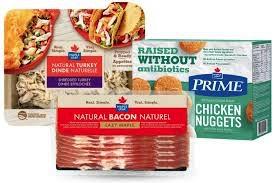 In addressing the two operating segments Frank noted “In the fourth quarter, our Meat Protein results fell below our expectations, as a result of global pork market dislocations that have persisted longer and deeper than we anticipated, and a challenging consumer demand environment, plus we still have a short distance to go to bring home the full benefits from our London Poultry and Bacon Centre of Excellence projects.” He concluded “With our refreshed strategic Blueprint announced today, we are sharpening our execution focus, bringing together our Meat Protein and Plant Protein businesses to build a powerful platform from which to grow in the U.S. market, and aligning the talents of our team to leverage the strength of our portfolio of leading brands, leadership in sustainability and world-class assets." In addressing the two operating segments Frank noted “In the fourth quarter, our Meat Protein results fell below our expectations, as a result of global pork market dislocations that have persisted longer and deeper than we anticipated, and a challenging consumer demand environment, plus we still have a short distance to go to bring home the full benefits from our London Poultry and Bacon Centre of Excellence projects.” He concluded “With our refreshed strategic Blueprint announced today, we are sharpening our execution focus, bringing together our Meat Protein and Plant Protein businesses to build a powerful platform from which to grow in the U.S. market, and aligning the talents of our team to leverage the strength of our portfolio of leading brands, leadership in sustainability and world-class assets."
The Company provided the following comments on strategy and guidance:-
- Meat Protein: The Meat Protein Group is comprised of prepared meats, ready-to-cook and ready-to-serve meals, snack kits, value-added fresh pork and poultry products that are sold to retail, foodservice and industrial channels, and agricultural operations in pork and poultry. The Meat Protein Group includes leading brands such as Maple Leaf®, Maple Leaf Prime®, Maple Leaf Natural Selections®, Schneiders®, Schneiders® Country Naturals®, Mina®, Greenfield Natural Meat Co.®, and other leading regional brands.
Sales for the fourth quarter increased 0.8% to $1,159.0 million compared to $1,149.6 million last year. Sales growth was driven by volume growth, pricing action implemented in prior quarters to mitigate the impact of inflation, and favourable mix shift. Prior year sales volumes were also impacted by the cybersecurity incident.
- Plant Protein: “The Plant Protein Group is comprised of refrigerated plant protein products, premium grain-based protein, and vegan cheese products sold to retail, foodservice and industrial channels. The Plant Protein Group includes the leading brands Lightlife® and Field RoastTM.
Sales for the fourth quarter were US$27 million compared to US$29.6 million last year, representing a decline of 8.9 percent. Sales decline was driven by lower retail volumes, partially offset by pricing action implemented in prior quarters to mitigate inflation”.
In late 2021, the Company announced that it was re-evaluating its outlook for the Plant Protein Group and launching a comprehensive review of the overall plant protein category. This decision was driven by a pronounced slowdown in growth rates in the category, Estimates at the time suggested that the category would grow at an average annual rate of 10 to 15 percent, making it an US$8 billion market by 2030”. This prediction has not been realized and the market has contracted in both volume and value.
- The Company statement noted, “In the near term, the Company is realigning its organizational structure to align with the refresh of its strategic blueprint by bringing together its Meat and Plant Protein businesses. This shift supports a clear and consistent focus on driving profitable growth in Canada, the U.S. and internationally across its entire protein and prepared foods portfolio”.

|
Kemin KemTRACE® for Turkeys
|
02/22/2024 |
|
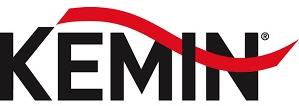 Kemin Industries has received approval for the use of KemTRACE® Chromium in growing turkey diets. The product supplies 0.2 ppm chromium to feed at an addition rate of one pound per ton of the 0.4 percent commercial product. Kemin Industries has received approval for the use of KemTRACE® Chromium in growing turkey diets. The product supplies 0.2 ppm chromium to feed at an addition rate of one pound per ton of the 0.4 percent commercial product.
In a trial conducted at North Carolina State University, KemTRACE® Cr was evaluated in turkeys grown through 84 days of age in replicate floor pens. Treatments comprised a non-supplemented control and 0.2 ppm chromium propionate supplement. Average daily gain was numerically higher in turkeys receiving the KemTRACE® Cr supplement at 0.2ppm attaining 106.7g per day. Turkeys receiving the control diet, that analyzed over 2.0ppm of chromium, gained 101.9g per day. Feed conversion efficiency was significantly improved compared to the controls at 2.18 to 2.11 for the supplemented treatment. Given the duration of the trial and daily weight gain, live weights of the control and treatment were respectively 8.62kg and 9.03kg. Effectively, chromium supplementation provided 410g of additional live weight or 320g of RTC mass but required the consumption of an incremental 168g of feed.
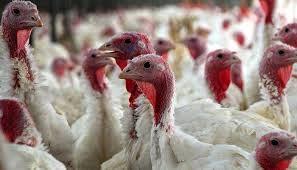
Concurrently, it was demonstrated that a supplementation rate of five times the approved level attaining 1.0 ppm chromium had no deleterious effect on live performance or hematologic or blood chemistry parameters in turkeys through 84 days of age.
Human food safety of chromium supplementation was demonstrated by assays of liver, muscle, kidney and skin with adherent fat and demonstrated only small increases in chromium concentrations in edible tissues. It was concluded that supplemental KemTRACE® Chromium at five times the approved level (1.0ppm) would have minimal effect on total chromium intake by humans.
Spears, J.W. et al. Chromium Propionate in Turkeys: Effect on Performance and Animal Safety, Poultry Science doi.org/10.1016/j.psj.2023.103195
Spears, J.W. et al. Chromium Propionate in Turkeys: Effects on Incident Sensitivity, Poultry Science doi.org/10.1016/j.psj.2023.103215
Spears, J.W. et al. Chromium Propionate for Turkeys: Effects on Tissue Chromium Concentrations in Human Food Safety, Poultry Science doi.org/10.1016/j.psj.2023.103196

|
Seaboard Corporation Reports on Butterball Subsidiary
|
02/22/2024 |
|
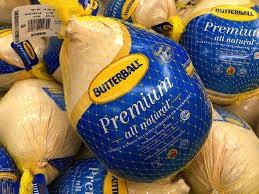 Seaboard Corporation is the majority shareholder in Butterball LLC with 52.5 percent of equity Their subsidiary is ranked as the second largest turkey producer in the U.S. Seaboard Corporation is the majority shareholder in Butterball LLC with 52.5 percent of equity Their subsidiary is ranked as the second largest turkey producer in the U.S.
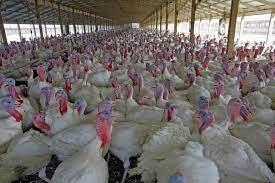 For fiscal 2023, the turkey segment posted sales of $2,025 million with an operating profit of $182 million. Net profit was $166 million. Butterball LLC posted assets of $1,120 million, with $172 million represented by goodwill and intangibles. Given total liabilities of $408 million the shareholders’ equity is $702 of which $365 million accrues to the majority shareholder. For fiscal 2023, the turkey segment posted sales of $2,025 million with an operating profit of $182 million. Net profit was $166 million. Butterball LLC posted assets of $1,120 million, with $172 million represented by goodwill and intangibles. Given total liabilities of $408 million the shareholders’ equity is $702 of which $365 million accrues to the majority shareholder.
|
Department of Labor Interviewing Workers in Mississippi Chicken Plants
|
02/22/2024 |
|
J ulie Su, Acting Secretary of the Department of Labor (DOL), recently met with workers employed in chicken plants and their organizers in Mississippi. The objective was to review alleged ongoing abuses and worker complaints. ulie Su, Acting Secretary of the Department of Labor (DOL), recently met with workers employed in chicken plants and their organizers in Mississippi. The objective was to review alleged ongoing abuses and worker complaints.
A roundtable was organized by Immigrant Lands for Justice and Equity and addressed the concerns mainly of Latino workers. These included hazardous plant conditions, wage theft and coercion. According  to a DOL release it is the mission of the Department to investigate allegations and to “explore ways for enhanced federal protection”. to a DOL release it is the mission of the Department to investigate allegations and to “explore ways for enhanced federal protection”.
|
West Liberty Foods Eliminating Production Positions in Iowa
|
02/22/2024 |
|
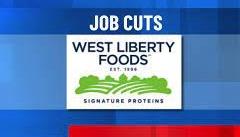 West Liberty Foods will cease ready-to-eat production at their West Liberty IA. plant, resulting in the loss of 260 line production positions. Layoffs will commence during April and continue through November. West Liberty Foods will move the slicing operations to Bolingbrook, IL. to respond to market demand. Turkey harvesting and first-shift operation at West Liberty will continue. West Liberty Foods will cease ready-to-eat production at their West Liberty IA. plant, resulting in the loss of 260 line production positions. Layoffs will commence during April and continue through November. West Liberty Foods will move the slicing operations to Bolingbrook, IL. to respond to market demand. Turkey harvesting and first-shift operation at West Liberty will continue.

Brandon Achen, President and CEO stated, “As a resident of this community the decision to reduce production capacity in West Liberty was difficult and painful”. He added, “We are committed to connecting each affected person with new employment opportunities and support and we will offer reassignment opportunities, provide on-site reemployment and support services”.
|
Japan Reports H5N6 in Broiler Breeder Flock
|
02/22/2024 |
|
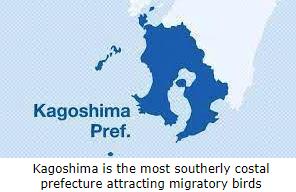 According to a report submitted to the World Organization of Animal Health on February 14th, an outbreak of H5N6 highly pathogenic avian influenza was diagnosed in a flock of 14,000 broiler breeders in Minamisatsuma City in Kagoshima Province, Japan. The affected flock was depopulated, and restrictions imposed on movement of poultry and products within a radius of 1.9 miles with appropriate surveillance of farms within a six-mile radius. According to a report submitted to the World Organization of Animal Health on February 14th, an outbreak of H5N6 highly pathogenic avian influenza was diagnosed in a flock of 14,000 broiler breeders in Minamisatsuma City in Kagoshima Province, Japan. The affected flock was depopulated, and restrictions imposed on movement of poultry and products within a radius of 1.9 miles with appropriate surveillance of farms within a six-mile radius.
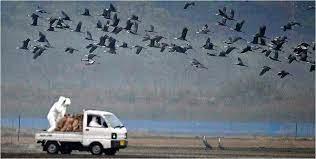
From October 2023 onwards during the Fall seasonal epornitic, Japan recorded 84 outbreaks of highly pathogenic avian influenza in 26 of 47 prefectures with depopulation of 17.7 million birds comprising broilers and commercial egg production flocks.
|
Update on Production of Broilers in Mexico
|
02/22/2024 |
|
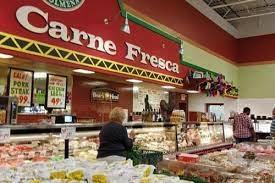 According to USDA-FAS GAIN Report MX2024-0011 released on February 12th, domestic production in Mexico during 2024 will increase by 2.5 percent over 2023 to 3.950 metric tons. This quantity will represent 79.4 percent of the domestic requirement of 4.975 million metric tons. The remaining 1.025 million metric tons or 20.6 percent of requirement will be supplied by imports. Exports from Mexico are inconsequential amounting to 5,000 metric tons. According to USDA-FAS GAIN Report MX2024-0011 released on February 12th, domestic production in Mexico during 2024 will increase by 2.5 percent over 2023 to 3.950 metric tons. This quantity will represent 79.4 percent of the domestic requirement of 4.975 million metric tons. The remaining 1.025 million metric tons or 20.6 percent of requirement will be supplied by imports. Exports from Mexico are inconsequential amounting to 5,000 metric tons.
Chicken meat represents 60 percent of livestock production and is expanding at a faster rate than cattle and hogs. Domestic consumption per capita will attain 84 pounds in 2024.
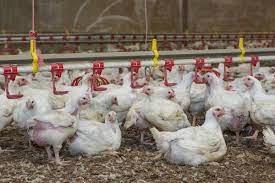 In February 2023, the Administration published a Presidential Decree directing a phase-out of GM corn. Amid considerable confusion over interpretation, the Administration has persisted with their intention jeopardizing both the domestic industry and the export of corn from the U.S. amounting to $5 billion in annual value. On August 17, 2023, the United States Trade Representative announced the establishment of a dispute settlement panel under the USMCA Agreement contending that the decree is arbitrary and lacks scientific merit. In February 2023, the Administration published a Presidential Decree directing a phase-out of GM corn. Amid considerable confusion over interpretation, the Administration has persisted with their intention jeopardizing both the domestic industry and the export of corn from the U.S. amounting to $5 billion in annual value. On August 17, 2023, the United States Trade Representative announced the establishment of a dispute settlement panel under the USMCA Agreement contending that the decree is arbitrary and lacks scientific merit.
Trade with the U.S. is subject to an ongoing claim established by the Unit of Foreign Trade Practices that the U.S. is “dumping” leg quarters. The issue has been under review for twelve years without resolution. The Government of Mexico Presidential Decree to extend an exemption on tariffs to facilitate importation of food including chicken will continue through the current year. This decree allows chicken to be imported without a tariff from nations not currently enjoying free trade agreements. This concession has created competition from Brazil and Argentina.
During 2023, the U.S. exported 721,342 metric tons of chicken products to Mexico valued at $811 with a unit price of $1,124. Exports to Mexico represented 19.8 percent of total exports and 17.1 percent of value. Exports of broiler products to Mexico in 2023 were up 9 percent in volume and 6 percent in value compared to the previous year.

|
TARGAN Develops First Automated Gender Sorter for Broiler Hatcheries
|
02/20/2024 |
|
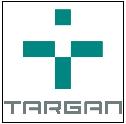 TARGAN Inc., based in Raleigh, NC, has developed the WingScan™ feather-sexing system for broiler chicks. The WingScan system comprises a multilevel conveyer system to channel chicks into a single file for passage through a machine-vision detector that can differentiate between fast and slow feathering wing plumage. The system is engineered to integrate with existing hatchery automation equipment, and will incorporate TARGAN’s individual chick vaccine delivery system in the future. TARGAN Inc., based in Raleigh, NC, has developed the WingScan™ feather-sexing system for broiler chicks. The WingScan system comprises a multilevel conveyer system to channel chicks into a single file for passage through a machine-vision detector that can differentiate between fast and slow feathering wing plumage. The system is engineered to integrate with existing hatchery automation equipment, and will incorporate TARGAN’s individual chick vaccine delivery system in the future.
TARGAN has combined chick-handling technology developed during the 1990s with contemporary machine vision and AI. Under the direction of Ramin Karimpour, a team of engineers and bio-scientists has applied modern detection systems and electronics to produce a multi-patented commercial and practical installation to separate male and female broiler chicks.
The WingScan system is modular with each unit capable of processing up to 50,000 chicks per hour with up to 98 percent accuracy. Chicks are loaded onto the system and are successively separated into a single track by gently transiting a cascade over three conveyor levels. The system is designed to minimize chick stress and physical handling, contributing to optimum growth and livability during the first week after placement. By placing multiple 8-lane WingScan units in parallel, it is possible to increase throughput by increments of 100,000 chicks per hour to accommodate required hatchery capacity.
Click image to watch video
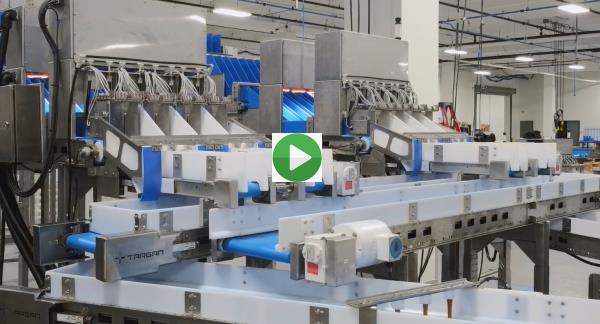 |
The business model applied by TARGAN is based on an equipment-and-service royalty payment paralleling the situation with in ovo vaccinators. This is considered essential for an emerging technology since it absolves integrators from making large, initial capital investment before long-term confirmation of functionality and benefits.
It is possible to manually differentiate chick gender using feather-sexing strains. This requires a team of trained workers to handle and inspect each chick before allocation to either male or female chutes on a carousel conveyer. Although this approach was used by a small proportion of the U.S. broiler industry during the 1980s and 1990s, use was limited by the availability of workers and the incidence rate of ergonomically induced carpal tunnel syndrome.
The WingScan system completely automates sorting by gender at a cost equivalent to manual processing. WingScan has a far smaller footprint than carousels and is suitable for retrofitting to existing hatcheries. The rate of processing expedites chick handling to ensure early delivery to farms.
TARGAN provides a practical method to differentiate gender at the hatchery. Integrators derive benefits associated with lower live-bird cost and greater uniformity at processing, but only by reconfiguring placement programs and schedules to achieve desired uniformity. The potential benefits from separate gender grow-out accrue from a lower live bird cost that can be achieved from precision feeding according to the relative growth rates of male and female broilers in separate flocks. There is probably less intra-flock competition with single-gender placement and adjustment of feeder and drinker lines is simplified without compromising availability. Financial benefits can be derived through reconfiguring placement and harvesting schedules, training of contractors and service people to the realities of separate gender grow-out including feeding programs and post placement vaccination. Separation of male and female chicks at the hatchery does not necessarily guarantee a financial return, but provides the basis for integrators to realize significant financial return through changes to existing straight-run grow-out.
TARGAN has developed an alliance with a major integrator allowing field evaluation of both the operational aspects and financial benefits. This integrator produces a range of heavy broilers for portioning, conventional weights for whole-bird sales and small birds with a narrow weight range for QSR-portioning. Clearly, separate-gender grow-out will have benefits at the two extremes of live weight both with respect to live bird production and processing.
TARGAN will have a receptive market in Brazil given the structure and export orientation of that industry. Importers in Middle Eastern nations require a narrow range of carcass weights within predetermined fixed-weight categories for bagged birds ranging from 900g to 1,300g. usually in 100g increments.
Although male and female chicks are placed separately with an anticipation of standard growth rate for a strain, biological factors including variability in nutrient quality, climatic extremes and disease challenge may result in deviation from standard daily gain. This requires fine-tuning of predicted harvest age to attain a predetermined live weight and uniformity. A complementary technology to WingScan™ would be a machine-vision system to determine average bird weight in real-time based on continuous scanning of the flock. Portable units could be placed in grow-out houses within two weeks of harvest to monitor weight and daily gain to optimize the uniformity of flocks delivered to the processing plant.
TARGAN has developed a practical method of separating male and female broiler chicks using its patented WingScan system. Financial benefits to integrators will accrue only if they apply appropriate flock management, nutrition and scheduling of chick placement and harvest.

|
Sustainability and Child Labor Resolutions Voted Down at Tyson Foods Shareholders Meeting
|
02/19/2024 |
|
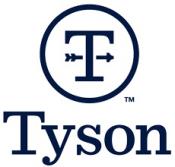 Resolutions by activist organizations to audit possible child-labor irregularities at Tyson Foods plants and to upgrade sustainability through packaging were both rejected by shareholders at the Annual Meeting on February 9th. Resolutions by activist organizations to audit possible child-labor irregularities at Tyson Foods plants and to upgrade sustainability through packaging were both rejected by shareholders at the Annual Meeting on February 9th.
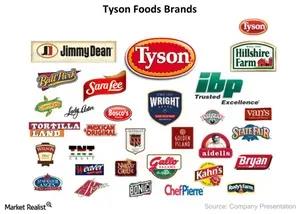
The Board of Directors was reelected and Kate B. Quinn was added to the Board. Among other accomplishments, Ms. Quinn was the Vice-chair and Chief Administration Officer at U.S. Bancorp.
|
Salmonella Reading Demonstrated to be Vertically Transmitted
|
02/19/2024 |
|
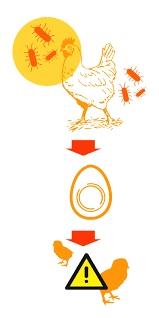
Following outbreaks of Salmonella Reading among consumers of ground turkey and related products, widespread distribution of the pathogen was confirmed within the turkey industry.
To ascertain whether S. Reading can be transmitted by the vertical route, investigations led by Dr. Li Zhang at Mississippi State University were conducted using either the S. Reading outbreak isolate or an uninvolved strain both modified to exhibit bioluminescence. For convenience in investigating transmission, broiler breeder hens were infected by the intravaginal route. Seventy percent of eggs were contaminated on the shell surface with the bioluminescent outbreak isolate and 35 percent using a non-implicated S. Reading strain. Four percent of internal egg contents yielded the outbreak strain and 2 percent the non-outbreak strain.
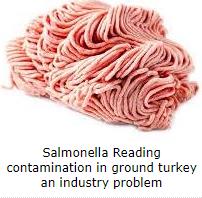
Of ten broiler breeder hens euthanized, 20 percent of ovaries, 70 percent of oviduct tissue and 70 percent of cecal samples were positive to S. Reading irrespective of whether an outbreak or non-outbreak strain was used as the infective agent.
The study clearly indicates that S. Reading in the turkey industry as an epornitic analog of S. Enteritidis in egg production. Accordingly similar approaches to detection and eradication will be necessary applying enhanced structural and operational biosecurity including precautions with insemination, elimination of infected shedders at all generations down to parent level, environmental testing and possibly either vaccination or phage suppression. The only effective post-harvest modality for ground turkey would be electron-beam treatment or bulk Cobalt60 irradiation-effective but limited by public acceptance.
The project was funded by the USPOULTRY Foundation as Project #729.

|
Cargill Settles on Violations of the Packers and Stockyards Act
|
02/19/2024 |
|
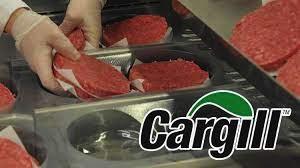
Cargill has reimbursed suppliers of cattle delivered from August 2021 through March 2022 for inaccurate yield grades. The assessed loss accruing to suppliers amounted to $12.5 million. In addition, Cargill Meat Solutions will pay a $155,000 civil penalty in a settlement agreement with USDA Agricultural Marketing Service.
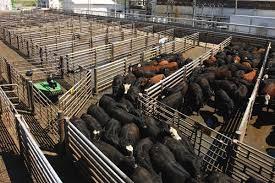 The consent decree enjoins Cargill from deviating from applicable installed camera-grading standards. The consent decree enjoins Cargill from deviating from applicable installed camera-grading standards.
Picture
|
Hall County, NE. Urging Environmental Compliance for JBS Plant
|
02/19/2024 |
|
 At a public meeting on January 30th the Commissioners of Hall County, NE. heard testimony from residents impacted by frequent air and water contamination emanating from the JBS, Grand Island plant. The meeting included testimony from the Nebraska Department of Environment and Energy with documentation of at least one wastewater violation each month over a prolonged period. At a public meeting on January 30th the Commissioners of Hall County, NE. heard testimony from residents impacted by frequent air and water contamination emanating from the JBS, Grand Island plant. The meeting included testimony from the Nebraska Department of Environment and Energy with documentation of at least one wastewater violation each month over a prolonged period.
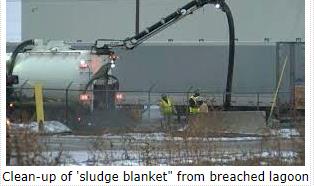 The Board is responding by addressing a letter to the company urging it to be “more accountable in policies and practices concerning air and water environmental issues.” The Board is responding by addressing a letter to the company urging it to be “more accountable in policies and practices concerning air and water environmental issues.”
The Head of Corporate Communications for JBS stated that the company is “working hard to address any potential impacts from the recent wastewater incident at our Grand Island beef production facility.” A full investigation is underway as to what caused the failure of a lagoon structure leading to the released of two million gallons of effluent into the Wood River, potentially affecting wells and groundwater.
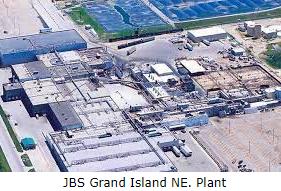
It is apparent that JBS Grand Island plant has a problem with waste disposal and accordingly appropriate investment will be required to prevent further environmental incidents. The action of Hall County Commissioners by simply writing a letter encouraging compliance would appear inadequate. This as with the 2020 COVID crisis is a further example of the power of a large company responsible for significant employment and contribution to the tax base of a rural county.

|
Theft of Rationed Chicken in Cuba by Plant Workers
|
02/19/2024 |
|
Press reports confirm that 30 workers at a plant processing chicken collectively stole 133 metric tons. The product was intended for distribution in accordance with a State rationing system. The accused were recorded removing packed chicken from a cold store by surveillance video. Sentences of up to 20 years in prison could be imposed for the crime.

During 2023, Cuba was the fourth ranked importer of U.S. broiler products, purchasing 260,582 metric tons, principally as leg quarters, valued at $286 million. Unit price was $1,098 per metric ton compared to an average for all exports amounting to $1,384 per metric ton.
|
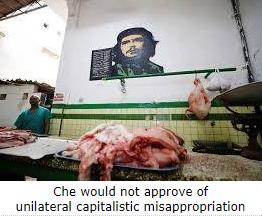 |
|
USAPEEC Actively Involved in Trade Issues
|
02/19/2024 |
|
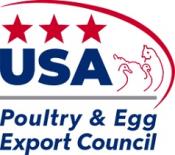 According to the February 19th edition of USAPEEC MondayLine, the Trade and Technical Services Team has been active in attempting to resolve recent trade issues. These include an unjustified closure of the market in Columbia, the Certificate of Conformity issued by the Republic of Congo and interpretation of changes in import regulations especially with respect to Mexico. According to the February 19th edition of USAPEEC MondayLine, the Trade and Technical Services Team has been active in attempting to resolve recent trade issues. These include an unjustified closure of the market in Columbia, the Certificate of Conformity issued by the Republic of Congo and interpretation of changes in import regulations especially with respect to Mexico.

USAPEEC is also active in arranging and hosting visits by officials of importing nations to evaluate health and food safety procedures in U.S. plants. A visit during early May is anticipated from the Republic of South Africa that recently rescinded some duties on imported chicken.
|
Upside Foods Cancels Illinois Project
|
02/19/2024 |
|
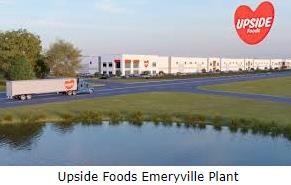 In late 2023, Upside Foods announced their intention of establishing a production facility in Glenview, IL. planned to produce 30 million pounds of cell-cultured meat annually. The plant extending over 187,000 square feet would have cost $140 million and employed 75 workers. Press reports indicate that since 2015 Upside Foods and its predecessor, Memphis Meats attracted $600 million in venture capital support. In late 2023, Upside Foods announced their intention of establishing a production facility in Glenview, IL. planned to produce 30 million pounds of cell-cultured meat annually. The plant extending over 187,000 square feet would have cost $140 million and employed 75 workers. Press reports indicate that since 2015 Upside Foods and its predecessor, Memphis Meats attracted $600 million in venture capital support.
Following the announcement of the intended production facility, Upside Foods was subject to negative publicity with disclosures that commercial production of cell-cultured meat could not be consistently achieved using large bioreactors installed in the Emeryville, CA plant. Allegations from existing and ex-employees confirmed failure to scale-up production from laboratory-level plastic roller bottles to bioreactors, in common with many potential producers of cell-cultured meat and poultry.
According to Wired, Upside Foods has apparently laid off workers that were to be involved in planning and construction of the Glenview facility and that expansion at Emeryville will now proceed. Upside Foods now claim that problems previously limiting commercial production have been resolved. Given previous hype and misleading 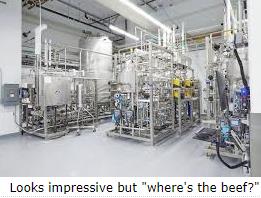 statements this will only be confirmed when cell-cultured product appears in supermarket display coolers. statements this will only be confirmed when cell-cultured product appears in supermarket display coolers.
Press reports suggest that investment in cell-cultured meat startups and existing operations has undergone a sharp reduction with growing disillusionment of their ability to produce on a commercial scale, in addition to regulatory hurdles, restrictive labeling legislation and indications of potential consumer rejection.

|
Metapneumovirus Emerges in the U.S.
|
02/18/2024 |
|
Recently Avian metapneumovirus (AMP) infection was diagnosed in turkeys and broilers in North Carolina. This virus is responsible for swollen head syndrome (SHS) in broilers and has been recognized as a clinical entity for over 45 years in various broiler production areas in the World. Although Koch’s postulates confirm that the AMP virus is pathogenic, clinical presentation and severity are influenced by intercurrent infection with other pathogens and environmental conditions.
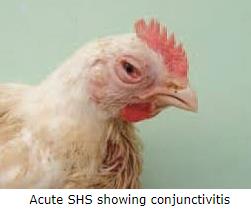
In the Republic of South Africa where SHS was first described, the condition is both seasonal and regional. Outbreaks were initially observed in broiler flocks on the highland (5,000-foot) inland plateau during the harsh winter characterized by cold and dry conditions. Outbreaks were associated with immunosuppression, at the time caused by emerging variants of infectious bursal disease. Metapneumovirus resulted in a transient upper respiratory infection with obvious conjunctivitis and involvement of the Harderian gland. Irritation caused mildly affected birds to scratch at their eyelids. This resulted in superficial abrasions and lacerations of the periorbital region with introduction of fecal material carrying STEC from litter into the ocular adnexa. Within days, a flock aged from 20 to 30 days of age would progress from mild respiratory signs to severe cellulitis of the periorbital and head region with symblepharon and death due to dehydration. In severe case mortality could rise to 30 percent of the flock through to harvest with severe runting of affected survivors.
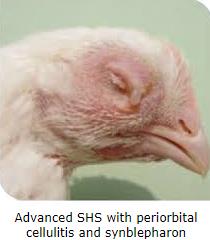
Fortunately, there are both serologic and antigen detection systems available in the U.S. at numerous laboratories to assist diagnosticians.
- The University of Georgia Poultry Disease Research Center (PDRC) offers an rt PCR assay for subtypes A, B and C of AMP. Virus isolations are also available to conduct virus characterization. The PDRC requests submission of whole heads, or tracheas, that must be collected at an initial stage of an outbreak to avoid secondary bacterial contamination. Specimens should be submitted by Express Next Day delivery on ice
- The BioChek ELISA and the IDEX ELISA will detect antibodies to subtypes A and B and both are available at diagnostic laboratories operated by the Universities of Delaware, Purdue, Minnesota and Iowa State.
- rt PCR is available from AviServe, Iowa State University, NVSL, PDRC, South Dakota State University, University of Minnesota, the Pennsylvania Diagnostic Laboratory and the University of Delaware.
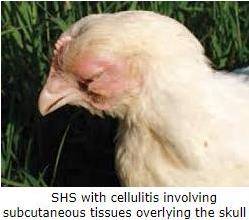
Practitioners involved in egg production should consider conducting serologic surveys on flocks to determine the extent of AMP exposure. The results would be especially instructive for flocks that have experienced high mortality due to avian coryza. This is predicated by observations that in the past two years, the mortality and impact on egg production due to avian coryza has become more severe, suggesting a concurrent pathogen exacerbating the impact of infection with the primary bacterial pathogen.
Dr. Jose Linares of CEVA Animal Health has prepared an overview with images of lesions associated with infection. This informative contribution can be accessed by clicking on to the link.
Avian Metapneumovirus – Diagnostic Labs that can test for aMPV
|
AviServe (Dr. Milos Markis)
|
In-house PCR (A,B,D); VI
|
|
ISU (Dr. Gazzar)
|
Idexx Elisa (A,B,C); qPCR; VI
|
|
NVSL (Dr. Torchetti)
|
In-house real-time RT-PCR (A,B,C); in-house ELISA (A,B,C); VI in support of control efforts, WGS for virus monitoring efforts
|
|
PDRC (Dr. Holly Sellars)
|
PCR (A,B); RT-PCR (A,B); VI
|
|
SDSU (Dr. Sunil Mor)
|
RT-PCR (A,B,C,D); NextGen; VI
|
|
UMN (Drs. Porter & Voss)
|
In-house PCR & Elisa (C); VI
|
|
Veterinary Diagnostic Pathology (Drs. Hoerr & Clontz)
|
Necropsy; Histopathology; Sample Collection & Distribution
|
|
USDA ARS (Dr. Kapczynski)
|
PCR (A,B); VI
|
|
Whitbeck Lab
|
Bio-Chek Elisa (A,B)
|
|
PA-DLS (Drs. Niel & Lighty)
|
Necropsy; Histopathology; Sample Collection & Distribution
|
|
Purdue ADDL SIPAC (Dr. Grant Burcham)
|
Idexx Elisa (A,B,C)
|
|
University Delaware ADDL (Dr. Ladman)
|
RT-PCR (A&B); rRT-PCR (A&B); VI
|
|
Georgia Poultry Lab Network
|
RT-PCR, ELISA
|

|
Batista Brothers to Join Pilgrim’s Pride Board
|
02/14/2024 |
|
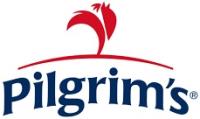 Pilgrim’s Pride Corp. has announced that brothers Wesley and Joesley Batista will join the Board of the company. Pilgrim’s Pride Corp. has announced that brothers Wesley and Joesley Batista will join the Board of the company.
 The move follows their acquittal on a charge of insider trading alleged by the CVN the authority in Brazil regulating the stock market. Concurrently the Supreme Court of Brazil has suspended a $2.0 billion fine imposed on the holding company J&F relating to a leniency agreement in 2017. The move follows their acquittal on a charge of insider trading alleged by the CVN the authority in Brazil regulating the stock market. Concurrently the Supreme Court of Brazil has suspended a $2.0 billion fine imposed on the holding company J&F relating to a leniency agreement in 2017.
It is the intent of J&F Investimentos, the controlling entity of JBS S.A. to seek a NYSE listing. This has engendered opposition in Congress and also from consumer and investment groups.
|
Boehringer-Ingelheim Launches Vaxxilive® Cocci 3 Vaccine
|
02/14/2024 |
|
 Boehringer-Ingelheim has announced that Vaxxilive® Cocci 3 will be available for broilers superseding Hatchpak® Cocci III. Boehringer-Ingelheim has announced that Vaxxilive® Cocci 3 will be available for broilers superseding Hatchpak® Cocci III.
The vaccine contains precocious Eimeria species that affect broilers. Precocious strains do not produce the same level of tissue damage as conventional strains as they only undergo one cycle of asexual reproduction (schizogony). Boehringer-Ingelheim has positioned the vaccine for year-ground use as an alternative to feed additive anticoccidial drugs.
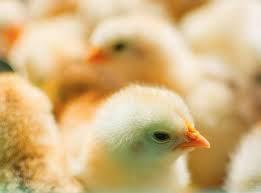
In announcing the launch, Dr. Rick Phillips, Director for Key Account Veterinarians stated, “As with any vaccination, choosing a product is only half the battle.” He added, “Our experienced and knowledgeable field team provides industry-leading support to producers, regularly visiting them to review vaccination protocols, and to create and maintain comprehensive poultry health programs.”
|
JBS Foods Settles Class Action Wage Lawsuit
|
02/13/2024 |
|
McDonald’s No Longer Just a “Burger Company”
|
02/13/2024 |
|
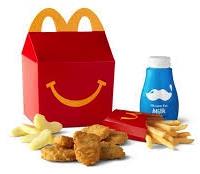 During an investors’ call following the release of FY 2023 financial results, CEO Christopher Kempczinski noted that chicken products including sandwiches and nuggets now exceed the sales value of beef burgers. During an investors’ call following the release of FY 2023 financial results, CEO Christopher Kempczinski noted that chicken products including sandwiches and nuggets now exceed the sales value of beef burgers.
The acceptance of chicken, based on nutritional value, taste and price together with negative perceptions of health and sustainability associated with beef are driving the trend.
The challenge for the broiler industry is to develop innovative products compatible with QSR menus and servings that can reduce cost to customers and generate demand.
|
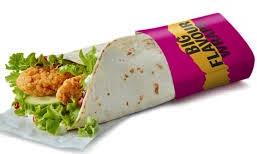
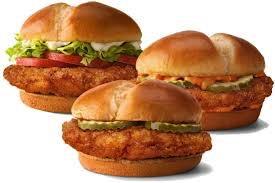 |
|
Louis Dreyfus Pea Protein Plant
|
02/13/2024 |
|
 Louie Dreyfus Company is constructing a plant to isolate pea protein in Yorktown, Saskatoon, Canada. Pea protein will be available for plant-based dairy and meat alternatives. The facility will be completed by the end of 2025. Louie Dreyfus Company is constructing a plant to isolate pea protein in Yorktown, Saskatoon, Canada. Pea protein will be available for plant-based dairy and meat alternatives. The facility will be completed by the end of 2025.
Michael Gelchie, CEO of Louis Dreyfus stated, “the investment announced today is an important step in the Group’s global growth strategy as part of our plans to diversify revenue through value-added products”.
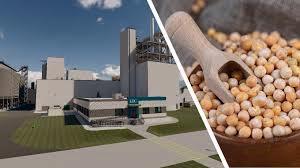
Previously, CHICK-NEWS reported on the application by a U.S. company to impose a dumping duty on pea protein produced in China. Investigations showed that companies involved in manufacture and export to the U.S. received subsidies from the state, creating unfair competition against producers in North America.
The short-term result of result of the dumping duty on approximately 150,000 metric tons of product from China will be to raise the cost of plant-based meat substitutes. This will further increase losses incurred by manufacturers of these products.
|
RSA Applies Rebates on Chicken Imports
|
02/13/2024 |
|
 On January 26th, the Department of Trade, Industry and Competition of the Republic of South Africa announced a rebate on both boneless and bone-in chicken imports. These will comprise a 25 percent rebate on bone-in cuts and 30 percent on boneless chicken. The decision follows applications made by the Association of Meat Importers and Exporters and reflects the disparity between supply and demand in the Nation. Predictably, the South African Poultry Association was opposed to the rebate claiming that there was no shortage of poultry meat over the Christmas period that is seasonally characterized by high demand. On January 26th, the Department of Trade, Industry and Competition of the Republic of South Africa announced a rebate on both boneless and bone-in chicken imports. These will comprise a 25 percent rebate on bone-in cuts and 30 percent on boneless chicken. The decision follows applications made by the Association of Meat Importers and Exporters and reflects the disparity between supply and demand in the Nation. Predictably, the South African Poultry Association was opposed to the rebate claiming that there was no shortage of poultry meat over the Christmas period that is seasonally characterized by high demand.
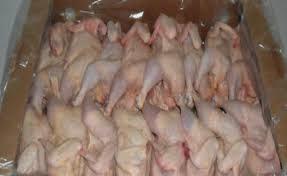 The decision to grant rebates was made by the Government to reduce the effect of inflation on a critical protein ingredient. The African National Congress Party that has ruled South Africa since the transition from apartheid is facing a general election with unprecedented opposition. This is a result of rampant corruption, the unfavorable economic situation, uncontrolled crime and an inability to provide services including power. The decision to grant rebates was made by the Government to reduce the effect of inflation on a critical protein ingredient. The African National Congress Party that has ruled South Africa since the transition from apartheid is facing a general election with unprecedented opposition. This is a result of rampant corruption, the unfavorable economic situation, uncontrolled crime and an inability to provide services including power.
According to USDA-FAS GAIN Report SF2024-0002 released on February 6th, “The cost of bone-in chicken meat in South Africa has increased by 28 percent over the past three years, attributed in part to anti-competitive prices due to protection from international competition.”
In March 2020, South Africa increased the most-favored-nation duties on bone-in chicken from 37 percent to 62 percent together with an increase from 12 percent to 42 percent for boneless portions. The U.S. and Brazil are subject to additional antidumping duties on bone-in chicken.
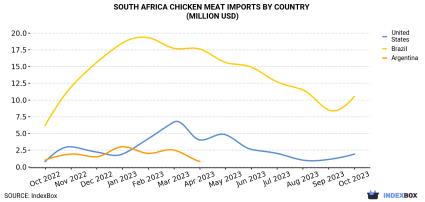
The volume of chicken meat subject to the rebate will be limited to 172,000 metric tons and the quota will be divided into quarterly increments.
During 2023 18th-ranked South Africa imported 44,324 metric tons of chicken products valued at $42.4 million with a unit cost of $957 per metric ton. Volume and value were down 20 percent compared to 2022

|
Aviagen Receives USPOULTRY Award for IPPE Participation
|
02/12/2024 |
|
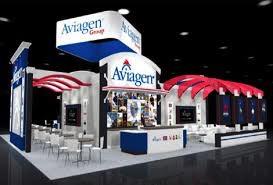
This year Aviagen received a special award for seventy years of continuous participation in the International Production and Processing Exhibition and its progenitors including the Southeast Poultry Show. Marla Robinson accepted the award from USPOULTRY chairman Mikell Fries.
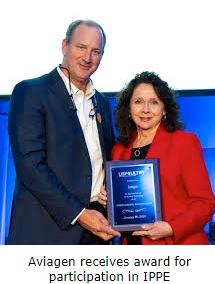 During the concurrent American Feed Industry Association meeting Anne-Marie Netson, Global Senior Advisor for Welfare Sustainability and Compliance addressed environmental and sustainability challenges including lifecycle analysis and establishing company-specific targets for change. During the concurrent American Feed Industry Association meeting Anne-Marie Netson, Global Senior Advisor for Welfare Sustainability and Compliance addressed environmental and sustainability challenges including lifecycle analysis and establishing company-specific targets for change.
In reviewing the Aviagen participation at the 2024 IPPE, CEO Jan Henriksen noted, “Our show theme and corporate philosophy of breeding success together was demonstrated. We were pleased to connect with our esteemed customers and industry stakeholders sharing ideas and best practices.”
|
Definition of Free and Pasture Raised Under Review
|
02/12/2024 |
|
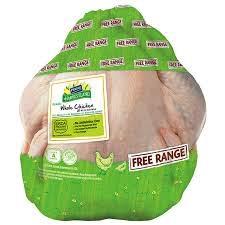 A bipartisan group of members of the House have requested USDA to expedite a review of the Perdue Farms petition filed in March 2023 regarding the definition of “free-range” and “pasture-raised” claims. At issue is whether the eventual definition will favor specific production systems and operators of farms or even result in unintended consequences. A bipartisan group of members of the House have requested USDA to expedite a review of the Perdue Farms petition filed in March 2023 regarding the definition of “free-range” and “pasture-raised” claims. At issue is whether the eventual definition will favor specific production systems and operators of farms or even result in unintended consequences.
A small-scale producer in Vermont noted that broilers “range outside houses in the morning and evening but are not naturally adventurous and will not explore very far beyond their shelters.” This observation is common to free-range egg 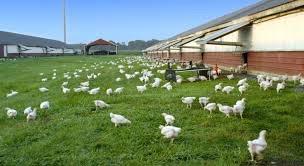 production flocks allowed access to pasture where they remain in proximity to their houses, cluster and demonstrate fear of predation. production flocks allowed access to pasture where they remain in proximity to their houses, cluster and demonstrate fear of predation.
It is generally accepted by both large and small-scale producers that clear definitions are required to obviate consumer confusion. Once standards are adopted, it will be necessary to ensure that label claims are consistent with actual production systems used.
|
Ahold Delhaize Withdraws from Meat Processing
|
02/11/2024 |
|
 In a February 7th announcement, Cargill will purchase two case-ready meat plants located in North Kingstown, RI. and Camp Hill, PA. from subsidiaries owned by Ahold-Delhaize, a multinational food retailer with an extensive presence in the U.S. In a February 7th announcement, Cargill will purchase two case-ready meat plants located in North Kingstown, RI. and Camp Hill, PA. from subsidiaries owned by Ahold-Delhaize, a multinational food retailer with an extensive presence in the U.S.
The plants are currently operated by Cargill and the divestment is logical based on the respective businesses of the two parties. Hans Kabat, president of Cargill. North American Protein Segment stated, “With this investment we look forward to our continued partnership with Ahold Delhaize USA while bringing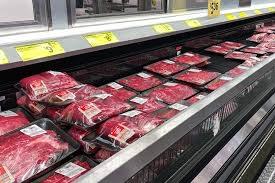 additional high-quality case-ready products to new retail customers. J. Fleeman CEO of Ahold-Delhaize USA stated, “By aligning these facilities with a company that specializes in meat production, we can continue to provide quality products to our brands’, quality products to our customers and increase our focus on being a leading omnichannel retailer.” additional high-quality case-ready products to new retail customers. J. Fleeman CEO of Ahold-Delhaize USA stated, “By aligning these facilities with a company that specializes in meat production, we can continue to provide quality products to our brands’, quality products to our customers and increase our focus on being a leading omnichannel retailer.”
|
K&N’s Wins Federation of Pakistan Chamber of Commerce Achievement Award
|
02/11/2024 |
|

K&N’s an integrated producer and processor has once again received an Achievement Award from the Federation of Pakistan Chamber of Commerce and Industry. This recognizes outstanding service to the poultry and frozen food industries of the Nation. Other considerations include meritorious service to the business community and contribution to the industry and to national economic development.
K&N’s is a second-generation enterprise founded 60 years ago. The company is integrated from parent stock multiplication, through production and sale of broilers, feed production and processing. The Company pioneered distribution of branded products in Pakistan with a wide range including whole chickens, premium cuts, further-processed breaded portions and ethnic dishes including kabobs and samosas.
|
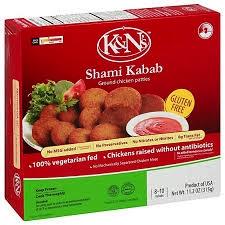
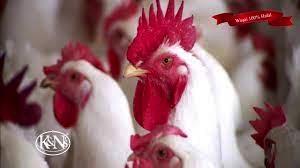 |
|
OSHA to Levy Fines on Case Farms, Winesburg, OH. Plant
|
02/11/2024 |
|
 Following an inspection on August 7th, 2023, the U.S. Department of Labor, Occupational Safety and Health Administration (OSHA) proposed fines of $400,000 on the Case Farms broiler processing plant in Winesburg, OH. The inspection was carried out under the Severe Violator Enforcement program based on a history of 450 citations since 1988 in plants operated by the company in North Carolina and Ohio. Major areas of concern included lack of machine guarding, trip-and-fall hazards, failure to use lockout procedures and inadequate training of workers. Case Farms employs 3,500 workers nationwide, including 575 at the Winesburg facility with a throughput of 150,000 birds per day. Following an inspection on August 7th, 2023, the U.S. Department of Labor, Occupational Safety and Health Administration (OSHA) proposed fines of $400,000 on the Case Farms broiler processing plant in Winesburg, OH. The inspection was carried out under the Severe Violator Enforcement program based on a history of 450 citations since 1988 in plants operated by the company in North Carolina and Ohio. Major areas of concern included lack of machine guarding, trip-and-fall hazards, failure to use lockout procedures and inadequate training of workers. Case Farms employs 3,500 workers nationwide, including 575 at the Winesburg facility with a throughput of 150,000 birds per day.
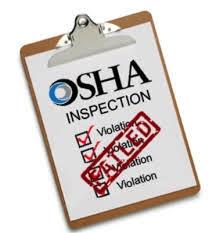
The categorization of Case Farms as a Severe Violator is in conflict with a number of awards received by the company for workplace safety. The Joint Industry Safety and Health Council (JISHC) recognized six facilities including two processing plants and four hatcheries for “outstanding performance in implementing innovative and effective employee safety and health programs”. Case Farms received the honors at the 2023 National Safety Conference for the poultry industry in mid-August.
Tyler Parlier, Regional Safety Manager for Case Farms, stated, “Safety is intertwined with everything we do at Case Farms, every location and every team member to be recognized for our safe working practices is simply outstanding. Several of our locations have received awards in safety for many consecutive years, proving that we are committed to working safely.” The Winesburg plant that was the subject of OSHA fines and previous violations received the Award of Honor.
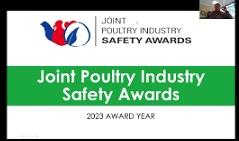
Recognition by the JISHC is based on Total Recordable Incident Rate, Days Away, and restricted or transferred employees, all in compliance with Occupational Safety and Health Administration safety metrics.
The concurrent awards to Case Farms for safety and the fines imposed by OSHA appear to be in conflict. An explanation either by the Company or the Federal agency is indicated.

|
YUM! Brands Reports on Q4 and FY 2023
|
02/08/2024 |
|
 On February 7th, YUM! Brands (YUM) reported on Q4 and FY 2023 ending December 31st. Results for the quarter were below Zach’s estimates of $2.12 billion for revenue and $1.39 for EPS. For the period, the Company posted net income of $463 million on an unexpectedly low revenue of $2,036 million, including company sales, franchise fees and advertising, generating a diluted EPS of $1.62. Comparative values for Q4 of fiscal 2022 were net earnings of $371 million on revenue of $2,019 million with a diluted EPS of $1.31. Operating margin increased from 28.6 percent to 29.9 percent for the most recent quarter. Digital sales were up 22 percent in FY 2023 approaching 45 percent of sales. On February 7th, YUM! Brands (YUM) reported on Q4 and FY 2023 ending December 31st. Results for the quarter were below Zach’s estimates of $2.12 billion for revenue and $1.39 for EPS. For the period, the Company posted net income of $463 million on an unexpectedly low revenue of $2,036 million, including company sales, franchise fees and advertising, generating a diluted EPS of $1.62. Comparative values for Q4 of fiscal 2022 were net earnings of $371 million on revenue of $2,019 million with a diluted EPS of $1.31. Operating margin increased from 28.6 percent to 29.9 percent for the most recent quarter. Digital sales were up 22 percent in FY 2023 approaching 45 percent of sales.
For FY 2023 the Company posted net income of $1,597 million on revenue of $7,076 million, with a diluted EPS of $5.68. Comparative values for FY 2022 were net earnings $1,325 million on revenue of $6,842 million with a diluted EPS of $4.63.
During Q4 the holding Company purchased 218 KFC restaurants in England and Ireland and opened 1,853 new units worldwide.
The KFC division comprising 29,900 restaurants posted a two percent growth in same-store sales The KFC division generated an operating profit of $329 million achieving an operating margin of 43.4 percent. Of total KFC sales expressed as a percentage, China attained 27; U.S.,15; Europe, 11 and the remainder from Asia.
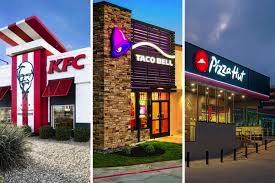 The Pizza Hut division comprising 19,866 restaurants posted 2 percent decline in same-store sales. The Pizza Hut division generated an operating profit of $99 million with an operating margin of 35 percent. Of total Pizza Hut sales expressed as a percentage, U.S. attained 41; China.,18; Europe and Asia, 13 each. The Pizza Hut division comprising 19,866 restaurants posted 2 percent decline in same-store sales. The Pizza Hut division generated an operating profit of $99 million with an operating margin of 35 percent. Of total Pizza Hut sales expressed as a percentage, U.S. attained 41; China.,18; Europe and Asia, 13 each.
The Taco Bell division comprising 8,564 restaurants posted a three percent increase in same-store sales with system with operating profit of $286 million attaining an operating margin of 34.9 percent. During Q4 201 restaurants were added.
In commenting on results David Gibbs, CEO stated, “2023 was another remarkable year for Yum! Brands as we crossed the $60 billion system sales threshold and exceeded all aspects of our long-term growth algorithm. We achieved 10 percent system sales growth with broad-based strength across the globe and another record year for development, opening over 4,700 new stores. We also made massive strides in scaling our proprietary digital and AI-driven ecosystem in partnership with our franchisees. Looking to 2024, this will be a year of major milestones as we cross 30,000 restaurants at KFC, 20,000 at Pizza Hut and well over 60,000 globally for Yum!"
Chris Turner, CFO, commented “Last year proved to be another great example of Yum!’s unique blend of growth and resilience. We delivered percent unit growth, one percent system sales growth, and 12 percent Core Operating profit growth. Simply put, there is no other retail business that is growing across 110 different countries and opening the equivalent of a new store roughly every two hours.
On December 31st 2023 Yum Brands posted total assets of $6,231 million including goodwill and intangibles of $1,019 million against long-term debt of $11,142 million and an accumulated shareholder’s deficit of $7,858 million. Yum Brands! had a market capitalization of $36,610 million on February 9th. The share has traded over 52 weeks in a range of $115.53 to $143.25 with a 50-day moving average of $125.91. On a trailing 12-month basis, operating margin was 31.9 percent, profit margin 22.6 percent with a return on assets of 24.5 percent. YUM! is held primarily by institutions that collectively hold 80.0 percent of equity.

|
Protectionism Theme of Poultry Market Intelligence Forum
|
02/07/2024 |
|
 Brian Earnest of CoBank addressing the domestic and global poultry market outlook for the poultry and egg industry noted that exporters will face increasing trade protectionism. Earnest observed that importing nations are maintaining tariffs and imposing additional restrictions. This may be reflected in the political rhetoric of the former president who has stated that if elected his administration would impose high tariffs on imports from China. Brian Earnest of CoBank addressing the domestic and global poultry market outlook for the poultry and egg industry noted that exporters will face increasing trade protectionism. Earnest observed that importing nations are maintaining tariffs and imposing additional restrictions. This may be reflected in the political rhetoric of the former president who has stated that if elected his administration would impose high tariffs on imports from China.
Dr. David Swayne reviewing the impact of highly pathogenic avian influenza considered control measures including unsuccessful attempts at eradication applying flock depopulation. Given that H5N1 clade 2.3.4.4b is now endemic in migratory waterfowl and marine birds, the disease is pandemic requiring reevaluation of barriers to international trade coupled with alternative control measures including vaccination.
Christian Richter of the Policy Group opined that despite current buoyant economic reports, global trade may be impacted by the world economic situation and the disparity between rich and poor nations. Richter noted that the outlook may be “ugly and unpredictable”. He pointed to failure to produce an acceptable farm bill that should have been concluded in 2023. Major issues of contention comprise the magnitude of SNAP funding and price supports for commodities. These concerns coupled with political considerations in an election year have impeded compromise and a bipartisan approach to compromise over farm legislation that has characterized all previous farm bills.

|
Tom Hensley USPOULTRY Workhorse of the Year
|
02/06/2024 |
|
 Tom Hensley president of Fieldale Farms was named as the 2024 USPOULTRY Workhorse of the Year. This prestigious honor is awarded annually in recognition of dedicated service and leadership extended to the association and the poultry industry. Tom Hensley president of Fieldale Farms was named as the 2024 USPOULTRY Workhorse of the Year. This prestigious honor is awarded annually in recognition of dedicated service and leadership extended to the association and the poultry industry.
Jarod Morrison outgoing Chair of USPOULTRY stated, “It is truly an honor to bestow this prestigious award on Tom for his long-time service to both the U.S. poultry and egg industry and to USPOULTRY. His contributions to the Association and the Foundation have help the organization to prosper and grow through his guidance and input.”
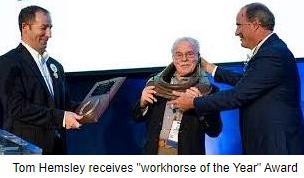
Hensley has been active in USPOULTRY serving as Chair of the Board of Directors in 2018 and of the Foundation in 2019. He has served on the Board for 13 years.
Nath Morris president of USPOULTRY stated, “Tom’s commitment to service and giving to others has greatly aided USPOULTRY and the Foundation.”
|
Contractor Files Lawsuit Against Case Farms
|
02/06/2024 |
|
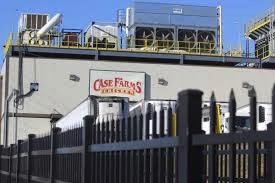 Randy Black a contractor to Case Farms in North Carolina has filed a federal lawsuit claiming that the company concealed information concerning the tournament system. Black alleges that Case Farms controls all aspects of grow-out including selection of broiler strains, nutrition and that the tournament system allows the Company to manipulate remuneration. Randy Black a contractor to Case Farms in North Carolina has filed a federal lawsuit claiming that the company concealed information concerning the tournament system. Black alleges that Case Farms controls all aspects of grow-out including selection of broiler strains, nutrition and that the tournament system allows the Company to manipulate remuneration.
To state that growers bear risks related to their operations is a misrepresentation of the contract system. Fluctuation in the cost of feed and market prices are borne by integrators. Differences in performance criteria that determine payment relate to the construction of houses including insulation, equipment and above all management of ventilation and other aspects of grow-out that are directly responsibilities of the contractor following Company guidance provided by servicepersons. At the end of the day both parties benefit from attaining high levels of performance.
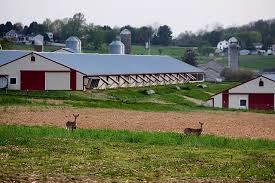
The lawsuit obviously relates to the proposed new rules under the Packers and Stockyards Act intended to create greater transparency in contracts and the elimination of the tournament system. If successful the case law established will lead to an avalanche of claims.

|
Kemin Introduces KemTRACE™ Chromium Supplement
|
02/06/2024 |
|
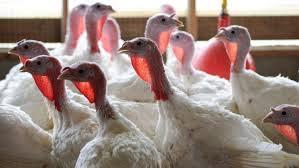 KemTRACE chromium supplement is now marketed by Kemin to provide an organic source of chromium for turkeys. KemTRACE chromium supplement is now marketed by Kemin to provide an organic source of chromium for turkeys.
Kristi Krafka, Vice President of Regulatory Affairs and Quality Assurance for Kemin Animal Nutrition and Health stated, “we are thrilled that the use of chromium propionate in animal diets continues to expand in the U.S. and beyond”. She added, “Kemin has devoted decades advancing the nutritional performance of livestock and poultry through novel feeding ingredients and is now able to offer safe and effective KemTRACE chromium to turkey producers, nutritionist and veterinarians”.

Studies have indicated that supplementing diets with chromium propionate improves growth of turkeys with a wide safety margin. For additional information on KemTRACE, click on to the Kemin logo on the right side of the Welcome page.
|
University of California, Davis Establishes Alternative Meat Center
|
02/05/2024 |
|
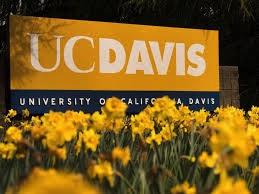 The University of California, Davis is using part of a California legislative grant of $1.7 million to establish the Integrative Center for Alternative Meat and Protein. The objective of the center will be to evaluate consumer attitudes concerning alternative proteins and to facilitate large-scale commercialization and technological advancement. The University of California, Davis is using part of a California legislative grant of $1.7 million to establish the Integrative Center for Alternative Meat and Protein. The objective of the center will be to evaluate consumer attitudes concerning alternative proteins and to facilitate large-scale commercialization and technological advancement.
In this venture UC Davis will collaborate with the University of Maryland, the Culinary Institute of America and various community c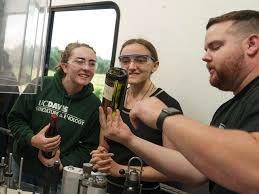 olleges. olleges.
It is ironic that a Land Grant university with departments dealing with dairy, ruminant and poultry production has established a Center that has the objective of displacing these segments of the livestock industry.
The California Legislature that embraces the need for enhanced sustainability is clearly opposed to intensive production. Their vision is contrary to the realities of providing nutritious and inexpensive protein to consumers. But that is what the Left Coast is about.
|
Tyson Foods Inc. Reports on Q1 of FY 2024
|
02/05/2024 |
|
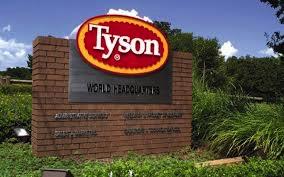 In a press release dated February 5th Tyson Foods Inc. (TSN) announced results for the 1st quarter of FY 2024 ending December 30th 2023. TSN posted lower revenue than the $13,457 anticipated but was higher on adjusted earnings ($0.69 vs. $0.40). In a press release dated February 5th Tyson Foods Inc. (TSN) announced results for the 1st quarter of FY 2024 ending December 30th 2023. TSN posted lower revenue than the $13,457 anticipated but was higher on adjusted earnings ($0.69 vs. $0.40).
The following table summarizes the results for the period compared with the values for the corresponding quarter of the previous fiscal year (Values expressed as US$ x 1,000 except EPS)
|
First Quarter Ending
|
Dec. 30th 2023
|
Dec. 31st 2022
|
Difference (%)
|
|
Sales:
|
$13,319,000
|
$13,260,000
|
+0.5
|
|
Gross profit:
|
$823,000
|
$968,000
|
-14.9
|
|
Operating income (loss):
|
$231,000
|
$467,000
|
-50.3
|
|
Pre-tax income (loss)
Net income (loss)
|
$161,000
$114,000
|
$434,000
$320,000
|
-62.9
-64.4
|
|
Diluted GAAP earnings per share
Adjusted earnings per share
|
$0.30
$0.69
|
$0.88
$0.85
|
-65.9
-18.8
|
|
Gross Margin (%)
|
6.2
|
10.0
|
-38.0
|
|
Operating Margin (%)
|
1.7
|
4.8
|
-64.6
|
|
Profit Margin (%)
|
0.9
|
3.3
|
-72.7
|
|
Long-term Debt and other liabilities:
|
$9,984,000
|
$9,189,000
|
+8.7
|
|
12 Months Trailing:
|
|
|
|
|
Return on Assets (%)
|
0.9
|
|
|
|
Return on Equity (%)
|
-3.4
|
|
|
|
Operating Margin (%)
|
-1.2
|
|
|
|
Profit Margin (%)
|
-1.2
|
|
|
|
Total Assets*: Dec. 30th ‘23/Dec. 31st 2022
|
$36,748,000
|
$36,251,000
|
+1.4
|
|
Intraday Market Capitalization Feb 5th 2024
|
$20,020,000
|
|
|
* Goodwill and intangibles 43.1 percent of total assets
52-Week Range in Share Price of TSN: $56.32 to $61.20. 50-day Moving average, $52.36
Market Close: Friday February 2nd $56.30. Monday February 5th post release, $60.47.
Forward P/E 27.5 Beta 0.8

The Chicken Segment attained sales of $4,033 million ($4,263 million in Q1 FY 2023) representing 30.2 percent of Company revenue. GAAP operating income attained $177 million in Q1 representing 76.7 percent of net Company operating income. Operating income in Q1 FY 2022 was $69 million representing 14.8 percent of net Company income. For the Chicken Segment the report stated:- “The USDA projects chicken production will be flat in FY 2024”. Anticipated adjusted operating income for the segment was forecast at $500 to $700 million for FY 2024.
For comparison among Tyson Foods’ business segments the adjusted operating income (loss) in Q1 2024 were respectively:- Pork, $39 million; Beef, $(206) million; Prepared Foods $243 million and International $(22) million.
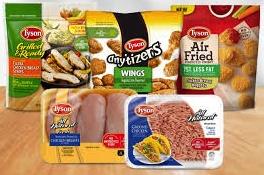 In commenting on results Donnie King, president and CEO stated “Our team executed well in the quarter and delivered tangible results, including our third sequential quarter of adjusted operating income growth," He added, "We saw the benefits of our diverse protein portfolio and realization of operational efficiencies from the strategic decisions we made in the past year." In commenting on results Donnie King, president and CEO stated “Our team executed well in the quarter and delivered tangible results, including our third sequential quarter of adjusted operating income growth," He added, "We saw the benefits of our diverse protein portfolio and realization of operational efficiencies from the strategic decisions we made in the past year."
King opined, "Although we still have work to do, I am pleased with our first quarter results and am confident we are on the right path to deliver long-term shareholder value," He concluded, "Going forward, we will continue to prioritize our liquidity and financial health, our focus on operational excellence, and our relentless pursuit to win with customers and consumers."
Guidance for FY 2024 included Revenue unchanged from FY 2023. Adjusted operating income for the Company was stated to be $1.0 to $1.5 billion. Capital expenditure was reduced to $1.0 to 1.5 billion. In the Q2 2013 report Tyson Foods projected $1 billion in savings from the “Productivity Program” by the end of 2024 although this prediction was not confirmed as a quantitative value in the most recent quarterly report but was alluded to.
Moody’s recently lowered the outlook for Tyson Foods but the credit rating was not changed at Baa2, slightly above ‘junk’ status. The Company has $1.25 billion maturing in August 2024. Net interest will amount to $400 million n FY 2024.

|
Family of Duvan Perez File Lawsuit Against Mar-Jac
|
02/05/2024 |
|
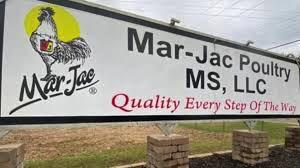 Edilma Ramirez, mother of 16-year-old Duvan Perez, has filed a wrongful death lawsuit against Mar-Jac Poultry and Onin Staffing following the death of her son. The lawsuit was filed in the Circuit Court of Forrest County, MS. alleging that the company was negligent in maintaining acceptable safety precautions to prevent death and injury of workers. The other issue relates to the employment of Perez, a minor, who was placed by the staffing contractor with false documentation, claiming that the minor decedent was 32 years of age. With respect to both allegations neither Mar-Jac nor Onin could present a credible defense for what is clearly res ipso loquitur. Negotiation and checkbook time! Edilma Ramirez, mother of 16-year-old Duvan Perez, has filed a wrongful death lawsuit against Mar-Jac Poultry and Onin Staffing following the death of her son. The lawsuit was filed in the Circuit Court of Forrest County, MS. alleging that the company was negligent in maintaining acceptable safety precautions to prevent death and injury of workers. The other issue relates to the employment of Perez, a minor, who was placed by the staffing contractor with false documentation, claiming that the minor decedent was 32 years of age. With respect to both allegations neither Mar-Jac nor Onin could present a credible defense for what is clearly res ipso loquitur. Negotiation and checkbook time!

It is a matter of record that the Department of Labor, Occupational Safety and Health Administration sanctioned Mar-Jac following the investigation of the accident. Previously, a worker at the same Mar-Jac plant was killed in a similar incident involving activation of equipment during cleaning. Both accidents can be attributed to deficiencies in training and supervision including failure to actively implement tag-out procedures to prevent accidental activation of dangerous mechanical equipment.

|
Wings Consumed During 2024 Super Bowl
|
02/05/2024 |
|
 The National Chicken Council (NCC) estimated that 1.45 billion wings were consumed during the 2024 Super Bowl LVIII weekend. The National Chicken Council (NCC) estimated that 1.45 billion wings were consumed during the 2024 Super Bowl LVIII weekend.
The NCC projection was unchanged from 2023 despite a recent decline in inventory of this category. According to the January 24th, 2024, USDA Cold Storage Report, the Wings category showed an 18.5 percent decrease from December 31st, 2022, to a stock of 67.1 million lbs. on December 31st 2023. Although there has been growth in consumption in this category, sales are impacted by competition from boneless wings. Increased demand during 2023 was however reflected in higher prices. It is apparent that grocery retailers are constraining margins to achieve higher sales possibly since a high volume of marinated and breaded wings are now available in bulk, catering and convenience packs from club stores, suitable for home football parties, tailgating and other sports-related events.

The popularity of wings is evidenced by the quarterly reports of Wingstop®, a franchisor of stores serving and delivering various forms of breaded and marinated wings. Some QSRs and casual dining restaurants have added wings to their menus increasing demand relative to availability.

|
Dr. Jim Perdue Receives NPFDA Lifetime Achievement Award
|
02/04/2024 |
|
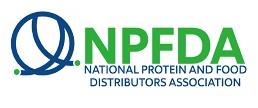 he National Protein and Food Distribution Association (NPFDA) awarded the 2024 Lifetime Achievement Award to Dr. Jim Perdue, the third-generation chairman of Perdue Farms. In receiving the award, Jim Perdue stated, “My grandfather Arthur W. Perdue built our business on quality, integrity and trust and my father transformed the industry”. He added, “I am proud to carry on the legacy into our companies second century. While the business may have changed over the years, our values continue to guide our decisions today”. he National Protein and Food Distribution Association (NPFDA) awarded the 2024 Lifetime Achievement Award to Dr. Jim Perdue, the third-generation chairman of Perdue Farms. In receiving the award, Jim Perdue stated, “My grandfather Arthur W. Perdue built our business on quality, integrity and trust and my father transformed the industry”. He added, “I am proud to carry on the legacy into our companies second century. While the business may have changed over the years, our values continue to guide our decisions today”.

He accepted the award on behalf of hard-working associates of Perdue Farms. Jim Perdue earned Masters and Doctoral degrees before joining the company in 1983 working his way up to become Chairman of the Board in 1991. Among many accomplishments during his tenure, Perdue Farms was the first to adopt a no-antibiotics-ever (NAE) protocol.
Jim Perdue is active in community organizations and industry associations including non-profits dedicated to preservation of the Chesapeake Bay.

|
Dissent in the E.U. Over Cell-Cultivated Meat
|
01/29/2024 |
|
 The E.U. Food Safety Authority has yet to make a decision on the acceptability of cell-cultured meat. There is clear division among nations of the E.U. with opposition based on narrow concerns supporting existing agricultural systems contrasted with environmental considerations. Twelve E.U. nations consider cultivated meat to “represent a threat to primary farm-based approaches and genuine food production methods that are the heart of the European farming model.” The E.U. Food Safety Authority has yet to make a decision on the acceptability of cell-cultured meat. There is clear division among nations of the E.U. with opposition based on narrow concerns supporting existing agricultural systems contrasted with environmental considerations. Twelve E.U. nations consider cultivated meat to “represent a threat to primary farm-based approaches and genuine food production methods that are the heart of the European farming model.”
This approach is exemplified by Italy and France among other nations that have enacted legislation banning the sale of cell-cultivated meat although of questionable acceptance by the E.U. Some nations including Germany, the Netherlands, Spain and the U.K. have promoted cell-cultivated meat based on environmental motives and promotion of technology.
The entire question of whether cell-cultivated meat should be banned or promoted may be moot. There is growing evidence that consumers may sample cell-cultivated meat provided it is available at a price that is competitive compared to the real product but there is evidence that potential buyers view the entire technology with suspicion. The second and most important restraint to extensive production and consumption of cell-cultivated meat is the fact that no company has 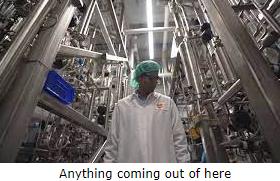 successfully transitioned from pilot scale to commercial production using bioreactors. The likelihood of companies producing sufficient quantities of product with the organoleptic qualities of pork, beef, chicken and lamb is unlikely even in the intermediate term. Cell-cultivated meat is not going to reverse deforestation to produce beef or reduce greenhouse gas emissions from animal waste despite the hype. Currently broilers and eggs have the smallest environmental footprint among animal products and contribute to the availability of inexpensive and nutritious protein. successfully transitioned from pilot scale to commercial production using bioreactors. The likelihood of companies producing sufficient quantities of product with the organoleptic qualities of pork, beef, chicken and lamb is unlikely even in the intermediate term. Cell-cultivated meat is not going to reverse deforestation to produce beef or reduce greenhouse gas emissions from animal waste despite the hype. Currently broilers and eggs have the smallest environmental footprint among animal products and contribute to the availability of inexpensive and nutritious protein.

|
Activist Organization Petitioning FSIS over Welfare Jurisdiction
|
01/29/2024 |
|
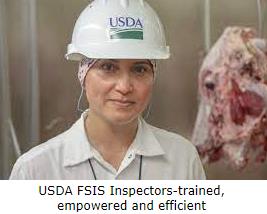 Animal Partisan has petitioned the Food Safety and Inspection Service to allow intervention by state personnel to enforce welfare in federally-inspected plants. Animal Partisan has petitioned the Food Safety and Inspection Service to allow intervention by state personnel to enforce welfare in federally-inspected plants.
The Animal Partisan petition filed in early September 2023 requires FSIS to “publish a notice clarifying that federal law does not necessarily prevent state government officials from bringing animal cruelty charges when farmed animals are abused in slaughter plants”.
Subsequent to the filing, the Animal Welfare Institute issued comments supporting the Animal Partisan petition noting that “it could significantly improve the welfare of animals at slaughter”.
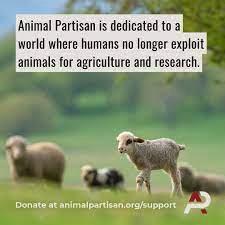
If granted, the petition would create a problem of divided jurisdiction and encourage activists in state agencies to intervene and bring legal action against processing plants that function under federal jurisdiction.
If there are deficiencies in handling live animals and poultry before slaughter, it is the responsibility of federal inspectors to enforce provisions of the Humane Methods of Slaughter Act and the Poultry Products Inspection Act.

|
MIT Designates Cell-Cultured Chicken as “Worst Technology”
|
01/29/2024 |
|
Citing Upside Foods, the MIT Technology Review ranked attempts at production of cell-cultivated chicken as an “epic failure” in technology. The company has now admitted that it is unable to produce a chicken substitute on a commercial scale using bioreactors. Currently the quantity produced by month using plastic roller bottles has attained quantities measured in low single digits of pounds. Whole chicken breasts can be purchased for less than $4 per lb. while a single small serving of cell-cultivated chicken at a gourmet restaurant, if available, costs in excess of $50. The laboratory-scale production by Upside Foods is energy intensive and generates a considerable volume of plastic waste.

CHICK-NEWS has previously opined on the failure of startups to produce commercial quantities of cell-cultivated meat, poultry or seafood. A number of companies including Upside Foods have raised millions from venture capital investors with little to show for installation of bioreactors and sophisticated installations intended to produce a food product lacking in texture and at a noncompetitive price compared to real meat products.
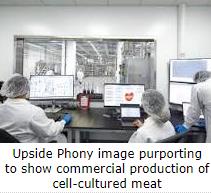
Failure to produce cell-cultivated meat of adequate quality in pilot plants should have restrained investment in larger facilities as in the case of Upside Foods that was following a “fake it ‘till you make it playbook.” The unjustified hype and hubris generated by companies operated by Josh Tetrick are an extreme example of misplaced optimism. According to lawsuits one or more of his subsidiaries ordered installations in anticipation of generating revenue and now is in default on payments to suppliers and contractors. The entire cell-cultivated meat segment has a whiff of Theranos about it.

|
Turkey Month
|
01/26/2024 |
|
Monthly Turkey Production and Prices, January 26th 2024
Poult Production and Placement:
The January 12th 2024 edition of the USDA Turkey Hatchery Report, issued monthly, documented 24.82 million eggs in incubators on January 1st 2024 compared to 27.28 million eggs on January 1st 2023* The January 2024 set was down 9.0 percent (2.46 million eggs) from January 2023 and 0.53 million eggs (2.1 percent) less than the previous month of December 2023.
A total of 21.48 million poults were hatched during December 2023 down 1.37 million poults (6.0 percent) compared to 22.85 million in December 2022*. The December 2023 hatch was down 0.20 million poults (0.9 percent) from the previous month of November 2023.
A total of 19.70 million poults were placed on farms in the U.S. in December 2023, compared to 21.00 million in December 2022*. The December 2023 placement was 6.0 percent, (1.25 million poults) less than the month of December 2022. This data confirms disposal of 1.79 million poults during the month. Approximately 8.3 percent of the December 2023 hatch was not placed.
For the twelve-month period January 2023 through December 2023 inclusive, 270.85 million poults were hatched and 252.92 million were placed. This confirms disposal of 17.93 million poults over the 12-month period, corresponding to 6.6 percent of all poults hatched.
* USDA revision from previous monthly report.
 
|
EPA Issues Proposed Stricter Wastewater Discharge Standards
|
01/25/2024 |
|
 The U.S. Environmental Protection Agency (EPA) published proposed wastewater discharge standards in the February Register on January 23rd. The intent of the upgraded standards will be to improve water quality and reduce pollutants discharges. The EPA is now soliciting comments that are due before March 25, 2024. The U.S. Environmental Protection Agency (EPA) published proposed wastewater discharge standards in the February Register on January 23rd. The intent of the upgraded standards will be to improve water quality and reduce pollutants discharges. The EPA is now soliciting comments that are due before March 25, 2024.
The standards would apply to egg-packing facilities, meat and poultry processing plants and would address levels of chlorides, phosphorus, nitrogen in waste streams. The rule will mandate pre-treatment and establish production thresholds.
In a statement following release of the Federal Register Julie Anna Potts president and CEO of the North American Meat Institute requested an extension. The Institute challenges the EPA the annual cost of $232 million for implementation. Knowledgeable experts affiliated to industry consider that EPA has underestimated compliance costs taking into account fixed costs associated with capital expenditure and variable expenses for operation.

It is considered ironic that the USDA in an attempt to create an alternative to large-scale efficient meat and poultry processing plants has funded small units with a collective give-away of $1 billion. The Meat Institute considers that many of these facilities will be forced to close based on non-compliance with the new standards.

|
Government of China Mandating Less Production of Pork
|
01/25/2024 |
|
As a result of injudicious expansion in hog production, and in the face of decreasing consumption producers are experienced losses of up to $10 per hog on average through 2023. Reuters has disclosed that the Ministry of Agriculture will “guide” (coerce?) lower production. Due to negative margins, hogs including breeding sows have been sent to processing in large numbers, further disrupting the relationship between supply and demand and reducing prices. The total herd at the end of 2023 was 434 million head, down 18 million from December 2022. The sow herd included in the total was down 5.7 percent or 2.5 million head from December 2022 to 41.4 million.
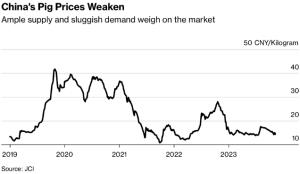
The Ministry of Agriculture has also mandated lower protein diets for hogs to restrict the need to import soybeans from both Brazil and the U.S. At this time, soybean meal is included at 13 percent on average in growing diets down 10 percent from 2022 fo equivalent to an annual reduction of 9 million metric tons of soybeans.
In 2023 China produced 58 million metric tons of pork and imported 2.7 million tons. By comparison in 2023, the U.S. industry produced 27,970 million pounds of pork, equivalent to 14.0 million metric tons or approximately 35 percent of the output in China.
|

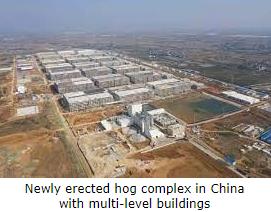
|
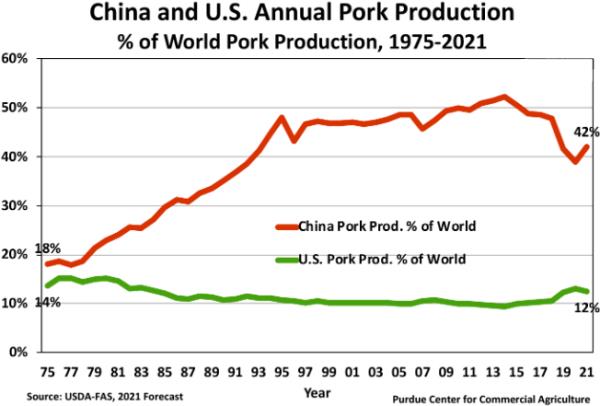 |

|
Türkiye to Restrict Transshipment from States With HPAI
|
01/25/2024 |
|
According to USDA-FAS GAIN report TU2024-002, Türkiye will not allow transshipment of poultry products from any U.S. state reporting commercial cases of HPAI. Authorities in Türkiye will allow discharge of unrestricted containers and transfer of containers between vessels in the same port.
This restriction has implications for transshipment of U.S. products from affected states to Iraq and Syria and to central Asia.
|

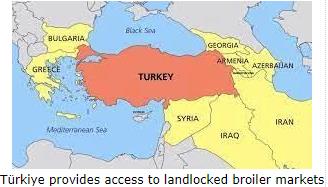
|
|
USDA-AMS Purchases of Chicken
|
01/22/2024 |
|
 The USDA Agricultural Marketing Service has announced purchase of 17.7 tons of non-breaded chicken breast fillets for child nutrition and related food assistance programs. Product was purchased at an average of $2.31 per pound with deliveries to be made during April through mid-June 2024. The USDA Agricultural Marketing Service has announced purchase of 17.7 tons of non-breaded chicken breast fillets for child nutrition and related food assistance programs. Product was purchased at an average of $2.31 per pound with deliveries to be made during April through mid-June 2024.

Concurrently the USDA Agricultural Marketing Service announced purchase of 78 tons of frozen chicken strips, also for child nutrition and related food assistance programs. Product was purchased for an average of $1.85 per pound with deliveries to be made over the same period.
The two purchases amounted to $379,000.
|
John Bean Technologies Offer for Marel Accepted Subject to Board Ratification
|
01/22/2024 |
|
 John Bean Technologies Corp. third offer to acquire the ownership of Marel was successfully received. Marel is a leading manufacturer of poultry and fish processing and packaging equipment based in Iceland. Eyrir Invest that holds a quarter of the shares of Marel has accepted the offer. Arnar Thor Masson, Chairmen of Marel, stated “Following a period of constructive discussions we have received a revised proposal from JBT to enter into a merger with Marel. He added, “The Board has carefully assessed the proposal and while it continues to believe in Marel stand-alone strategy, we consider there is compelling logic in the combination for Marel shareholders and its stakeholders.” The Board is working with JBT on due diligence and finalization of the offer subject to approval by the Boards of both companies and shareholder votes. John Bean Technologies Corp. third offer to acquire the ownership of Marel was successfully received. Marel is a leading manufacturer of poultry and fish processing and packaging equipment based in Iceland. Eyrir Invest that holds a quarter of the shares of Marel has accepted the offer. Arnar Thor Masson, Chairmen of Marel, stated “Following a period of constructive discussions we have received a revised proposal from JBT to enter into a merger with Marel. He added, “The Board has carefully assessed the proposal and while it continues to believe in Marel stand-alone strategy, we consider there is compelling logic in the combination for Marel shareholders and its stakeholders.” The Board is working with JBT on due diligence and finalization of the offer subject to approval by the Boards of both companies and shareholder votes.
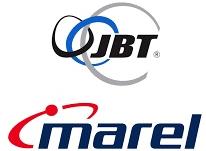
Brian Deck, CEO of JBT, stated “We look forward to working together on confirmatory due diligence and finalization of the formal voluntary takeover offer on the terms as agreed to. The enhanced global operating scale of a combined company is expected to generate meaningful operating costs synergies and we anticipate additional synergies from revenue to drive incremental and compelling value creation.”
JBT employs over 5,000 in 25 nations with 2023 revenue of $1.6 billion. Marel employs 8,000 in 30 nations with revenue exceeding $1.9 billion

|
USDA-FSIS Introduces Remote Grading Pilot for Beef
|
01/22/2024 |
|
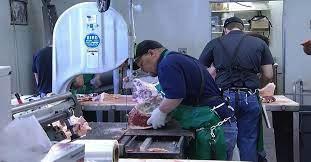 USDA has announced a pilot program intended to promote the financial viability of small-scale beef processing units. According to an announcement by USDA Secretary, Tom Vilsack, a remote assessment of quality using a video link would be applied to assign a U.S. grade standard. A limited feasibility study was conducted in 2023 leading to an extension for the present year. USDA has announced a pilot program intended to promote the financial viability of small-scale beef processing units. According to an announcement by USDA Secretary, Tom Vilsack, a remote assessment of quality using a video link would be applied to assign a U.S. grade standard. A limited feasibility study was conducted in 2023 leading to an extension for the present year.
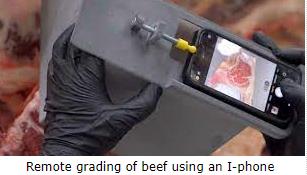
The initiative is part of the USDA intent to “broaden market access for cattle producers and meat processors since small producers can now offer USDA-graded carcasses that are of higher value”.
|
Rabobank Released from Involvement in Price Collusion Lawsuit
|
01/21/2024 |
|
 In 2023, Judge Thomas Durkin of the Federal District Court of the District of North Illinois dismissed Rabobank as a defendant in the class action lawsuit alleging collusion on pricing among broiler integrators. In 2023, Judge Thomas Durkin of the Federal District Court of the District of North Illinois dismissed Rabobank as a defendant in the class action lawsuit alleging collusion on pricing among broiler integrators.
Plaintiffs’ attorneys recognizing the loss of a deep-pocketed defendant in their shake-down litigation appealed to the Federal 7th Circuit Court of Appeals that upheld Durkin. Accordingly, the plaintiffs  appealed to SCOTUS. The Court justifiably denied certiorari resulting in the standing of the decision of 7th Circuit. appealed to SCOTUS. The Court justifiably denied certiorari resulting in the standing of the decision of 7th Circuit.
Evidence presented to the Illinois District Court failed to demonstrate that Rabobank had in any way participated in alleged acts of collusion or had any knowledge of any coordination among client companies.
|
Salmonella Outbreaks from Charcuterie Meats
|
01/20/2024 |
|
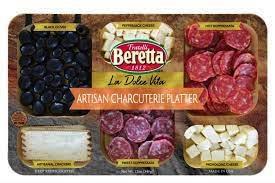 The Centers for Disease Control is currently investigating an outbreak of salmonellosis involving over 50 diagnosed cases through January 1, 2024, in 22 states. The vehicle of infection has been identified as charcuterie (dried, spiced cold cuts) under the Antipasto Gran Beretta brand produced by The Centers for Disease Control is currently investigating an outbreak of salmonellosis involving over 50 diagnosed cases through January 1, 2024, in 22 states. The vehicle of infection has been identified as charcuterie (dried, spiced cold cuts) under the Antipasto Gran Beretta brand produced by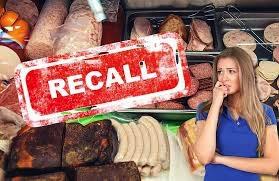 Fratelli Beretta Inc. sold at two major warehouse stores. The current outbreak has resulted in a 25 percent hospitalization rate, but fortunately with no fatalities recorded. Fratelli Beretta Inc. sold at two major warehouse stores. The current outbreak has resulted in a 25 percent hospitalization rate, but fortunately with no fatalities recorded.
The implicated products have been recalled and advisories have been issued to consumers issued to destroy any remaining product.
|
Smithfield Foods Plant Recognized by NC. DEQ
|
01/20/2024 |
|
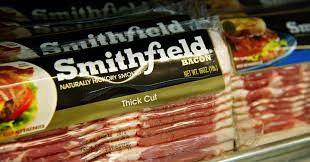 The Tarheel, NC. pork plant operated by Smithfield Foods has received recognition as a Rising Environmental Steward. The distinction was awarded by the North Carolina Department of Environmental Quality. The Tarheel, NC. pork plant operated by Smithfield Foods has received recognition as a Rising Environmental Steward. The distinction was awarded by the North Carolina Department of Environmental Quality.
It is heartening to read of a participant in the intensive livestock industry that is commended for environmental benefits. This stands in contrast to the criticism that Smithfield Foods has experienced relating to nuisance from hog waste lagoons.
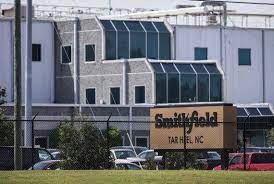 The Tarheel plant was commended for a commitment to exceed environmental regulations over a two-decade period and has been a consistent recipient of awards under the environmental stewardship initiative. Specific actions taken by Smithfield Foods include installation of a wastewater treatment system that produces renewable gas, powering 2,000 local homes. The reclaimed water system recirculates one million gallons of water per day and is used for wash-down and other approved ‘grey-water applications. The Tarheel plant was commended for a commitment to exceed environmental regulations over a two-decade period and has been a consistent recipient of awards under the environmental stewardship initiative. Specific actions taken by Smithfield Foods include installation of a wastewater treatment system that produces renewable gas, powering 2,000 local homes. The reclaimed water system recirculates one million gallons of water per day and is used for wash-down and other approved ‘grey-water applications.
Environmental stewardship extends beyond the Tarheel plant with facilities in Clinton and Wilson, NC., earning NCDEQ designation as Rising Environmental Stewards complying with standards that exceed legal requirements.

|
Albertsons Introduces SELECT® Mix + Prepared Meals
|
01/17/2024 |
|
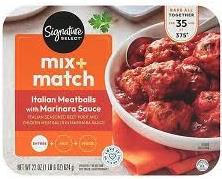 Albertsons has launched the Signature SELECT® Mix + range of prepared meals. The center of the plate and side dishes can be cooked together in an oven for about 40 minutes reducing time including vegetable preparation and subsequent clean up. The meal kits feed a family of four. Albertsons has launched the Signature SELECT® Mix + range of prepared meals. The center of the plate and side dishes can be cooked together in an oven for about 40 minutes reducing time including vegetable preparation and subsequent clean up. The meal kits feed a family of four.
The meals are available with the main course as chicken parmesan, chicken marsala, chicken meatloaf or Italian meatballs. Sides include a variety of pasta and mashed potatoes with a selection of vegetables.

The Mix + Match meals will be marketed under the Albertson’s Signature SELECT® owned-brand that was developed through a program of consolidation and rationalization in 2023.
|
Weather Impacts Production in Affected States
|
01/17/2024 |
|
 On January 15th, severe weather prevented USDA inspectors from reporting to the Tyson Foods pork plant in Madison, NE. Accordingly, the plant did not operate eliciting a complaint from Senator Mike Flood (R-NE) who expressed his concern to the USDA-FSIS Administration. It is self-evident that without USDA-FSIS inspectors, a plant is idle, impacting production, the labor force and affecting the supply chain. On January 15th, severe weather prevented USDA inspectors from reporting to the Tyson Foods pork plant in Madison, NE. Accordingly, the plant did not operate eliciting a complaint from Senator Mike Flood (R-NE) who expressed his concern to the USDA-FSIS Administration. It is self-evident that without USDA-FSIS inspectors, a plant is idle, impacting production, the labor force and affecting the supply chain.
 News reports also noted that Wayne-Sanderson Farms either suspended shifts or delayed startup in a number of facilities in Texas and Arkansas on January 16th. Individual shifts were cancelled in Mississippi due to problems encountered with access to the plant by employees under unsafe travel conditions. News reports also noted that Wayne-Sanderson Farms either suspended shifts or delayed startup in a number of facilities in Texas and Arkansas on January 16th. Individual shifts were cancelled in Mississippi due to problems encountered with access to the plant by employees under unsafe travel conditions.
It is evident that other processors were impacted by inclement weather, affecting catching, feed hauling and plant operations.
|
Proposed JBS SA Listing on NYSE Opposed
|
01/14/2024 |
|
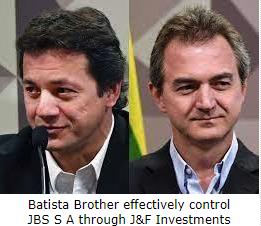 Fifteen Senators have expressed their opposition to a New York Stock Exchange listing by JBS SA. The bipartisan group including Democrats Elizabeth Warren and Cory Booker and Republicans Marco Rubio and Josh Hawley noted, “approval of the JBS proposed listing will subject U.S. investors to risk from a company with a history of blatant, systemic corruption, and further entrench its monopoly power and embolden its monopoly practices”. Fifteen Senators have expressed their opposition to a New York Stock Exchange listing by JBS SA. The bipartisan group including Democrats Elizabeth Warren and Cory Booker and Republicans Marco Rubio and Josh Hawley noted, “approval of the JBS proposed listing will subject U.S. investors to risk from a company with a history of blatant, systemic corruption, and further entrench its monopoly power and embolden its monopoly practices”.
The opposition expressed by U.S. legislators is mirrored by a group of Members of Parliament in the United Kingdom who oppose the listing based on “a well documented history of engaging in deforestation, violating human rights, seizing land from indigenous communities and engaging in monopolistic activities.”
At the heart of the opposition is the fact that JBS SA is controlled by J&F Investments owned by the Batista family. A previous proposal for a listing in 2017 was scuttled by a bribery scandal resulting in a $27 million fine by the SEC. More recently, the Batista brothers negotiated an agreement with judicial authorities in Brazil to renegotiate penalties imposed in response to a prior plea agreement.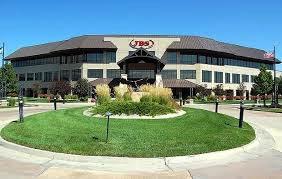
It appears that in the U.S., most opposition is based on past questionable business ethics. In the U.K. as well as the U.S. the proposed listing is now opposed on environmental and socioeconomic considerations.
JBS SA attained a dominant position in World meat and poultry processing through a program of acquisition that was based on sweetheart loans from the National Development Bank of Brazil facilitated by bribery. The Company considers that the listing on the NYSE would increase the ability of the company to legitimately raise funds for growth that would enable more branded and value-added production to increase returns for shareholders.
JBS SA faces considerable opposition to a listing and will obviously have to demonstrate how unethical practices in the past will not be repeated and that the company will function in accordance with SEC and NYSE regulations.

|
Cargill and PSSI Continue Separation
|
01/14/2024 |
|
 Following the revelations of child labor used by Packer Sanitation Services Inc. (PSSI) in October 2022, Cargill Inc. and other major packers elected to establish alternatives for cleaning including operating their own services. Following the revelations of child labor used by Packer Sanitation Services Inc. (PSSI) in October 2022, Cargill Inc. and other major packers elected to establish alternatives for cleaning including operating their own services.
Cargill is currently in the process of finding new vendors to replace PSSI in 14 facilities. In keeping with tradition, Cargill is tight lipped over the process declining to provide a timeline for the transition or whether vendors or an in-company solution will be implemented.
|
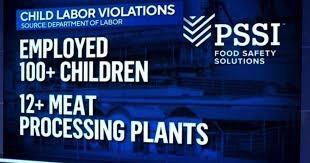
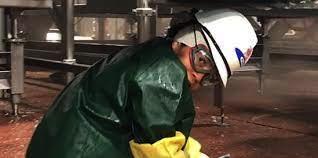 |
|
IPPE Guide
|
01/14/2024 |
|
CHICK-NEWS has prepared a Guide to the 2024 IPPE, listing the Booth numbers of exhibiting sponsors with links to their websites. The guide will be E-mailed again on Monday, January 29th. Some recipients of the January 15th mailing reported that the Guide was delivered to their spam boxes, based on security settings. Please check alternative boxes if it was not delivered to your incoming mail on either January 15th or 22nd.
|
Exports of Chicken by Brazil in 2023
|
01/11/2024 |
|
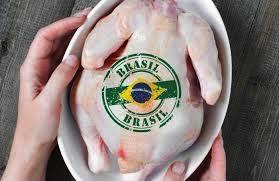 According to the Association of Meat exporters of Brazil (ABPA), during 2023 exports of chicken products attained 5.138 million metric tons valued at $9.79 billion with a unit value of $1,905 per metric ton. According to the Association of Meat exporters of Brazil (ABPA), during 2023 exports of chicken products attained 5.138 million metric tons valued at $9.79 billion with a unit value of $1,905 per metric ton.
Over the first ten months of 2023, the U.S. exported 3.04 million metric tons of broiler products comprising feet to China and leg quarters to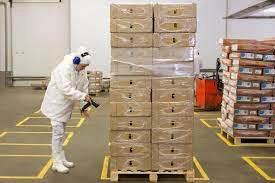 diverse nations valued at $3.968 billion with a unit value of $1,306 per metric ton on average. diverse nations valued at $3.968 billion with a unit value of $1,306 per metric ton on average.
|
SCOTUS Denies Certiorari in Washington Broiler Litigation
|
01/11/2024 |

 |
Defendants in the case involving alleged collusion in pricing applicable to Washington State established an agreement that would have reduced the quantum of damages by spreading liability. Plaintiffs including Target, Campbell Soup and others claimed that the agreement was unlawful. In May 2022 U.S. District Judge Thomas Durkin rejected the Plaintiff's challenge and ruled that the agreement did not diminish their ability to claim damages. Accordingly, Target and other plaintiffs appealed to the 7th Circuit to set aside the ruling. The appeal to consider the order by Judge Durkin was denied on jurisdictional grounds since litigation was ongoing. The most recent appeal to SCOTUS was denied certiorari presumably on similar grounds. aside the ruling. The appeal to consider the order by Judge Durkin was denied on jurisdictional grounds since litigation was ongoing. The most recent appeal to SCOTUS was denied certiorari presumably on similar grounds.
It is noted that the litigation is in part supported by a funder, Burford Capital, ensuring continued and intensive pressure on the Defendants to settle.
|
|
Kielbasa Sausage Recalled Over Bone Fragments
|
01/11/2024 |
|
 SALM Partners has recalled sixty-five tons of ready-to-eat turkey kielbasa sausage. The USDA FSIS initiated the recall as a result of a mild oral injury caused by a bone fragment together with two other consumer complaints. Affected product was produced during late October and marketed under the Park View brand Turkey Polska Kielbasa product. SALM Partners has recalled sixty-five tons of ready-to-eat turkey kielbasa sausage. The USDA FSIS initiated the recall as a result of a mild oral injury caused by a bone fragment together with two other consumer complaints. Affected product was produced during late October and marketed under the Park View brand Turkey Polska Kielbasa product.
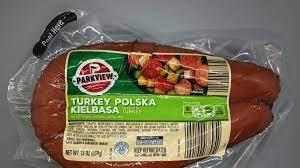
The value of sixty-five tons of product would have paid for effective radiographic bone fragment detection equipment. In addition, the quantity recalled may have been smaller with proportionally lower batch sizes.
|
2022 Poultry Imports by China Quantified
|
01/08/2024 |
|
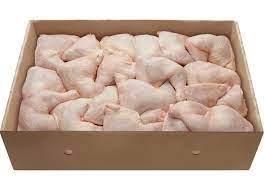 USDA-FAS Gain Report CH2023-0194 released on January 4th quantified the value of poultry imports into China during 2022 at $4.165 billion. According to the Report, China has removed restrictions relating to routine surveillance for COVID virus creating possible new market opportunities. USDA-FAS Gain Report CH2023-0194 released on January 4th quantified the value of poultry imports into China during 2022 at $4.165 billion. According to the Report, China has removed restrictions relating to routine surveillance for COVID virus creating possible new market opportunities.
For the first nine months of 2023, 338,309 tons of U.S. broiler products were shipped to China, valued at $576,346 with an average unit value of $1,704 per metric ton. Paws and feet represented 67.5 percent of volume and 73.2 percent of value with a unit price of $1,848 per metric ton.
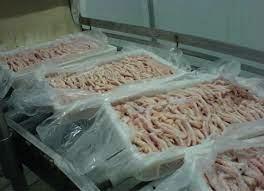
During January through October 2023, exports of all broiler products to China were second in volume among importers but 29.9 percent lower than the corresponding months in 2022 to 372,326 metric tons and 31.2 percent lower in value. Volume and value of exports to China represented 12.2 percent and 16.3 percent of U.S. exports respectively with an average unit price of $1,732 per metric ton. The U.S. average price for all exports during January through October 2023 excluding China was $1,246, demonstrating the weighting of the unit value of feet on average export price.

|
Upside Foods Failing to Deliver
|
01/08/2024 |
|
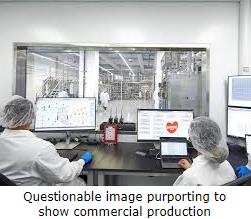  A recent article on Upside Foods by staff writers at Bloomberg Business Week noted that the company is absolutely failing to deliver on previously promised volume. Their existing plant was supposed to produce 50,000 lb. of product annually presuming the use of bioreactors. Since Upside Foods has not been able to effectively apply large-scale technology, it has no business in proceeding with a far larger factory. The company has raised in excess of $600 million in venture capital, has obtained U.S. Food and Drug Administration and USDA approval but can only produce one pound of faux chicken per month. A recent article on Upside Foods by staff writers at Bloomberg Business Week noted that the company is absolutely failing to deliver on previously promised volume. Their existing plant was supposed to produce 50,000 lb. of product annually presuming the use of bioreactors. Since Upside Foods has not been able to effectively apply large-scale technology, it has no business in proceeding with a far larger factory. The company has raised in excess of $600 million in venture capital, has obtained U.S. Food and Drug Administration and USDA approval but can only produce one pound of faux chicken per month.
In response to the critical article, Upside Foods admitted to “realities and complexities of doing something that has never been done before”. The situation with Upside Foods and the debacle at Just Eats should intensify scrutiny of 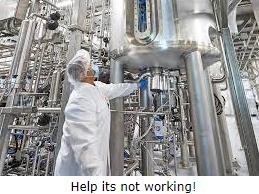 start-ups and established companies intending to produce cell cultured meat. Output of the various forms of beef, chicken and seafood has not apparently progressed beyond pilot plant and roller-bottle production. The concept of “faking it ‘til you make it” with a whiff of Theranos appears to be wearing thin with VC companies closing their collective purses. start-ups and established companies intending to produce cell cultured meat. Output of the various forms of beef, chicken and seafood has not apparently progressed beyond pilot plant and roller-bottle production. The concept of “faking it ‘til you make it” with a whiff of Theranos appears to be wearing thin with VC companies closing their collective purses.
The rush by states producing meat to impose label restrictions on cell-cultivated product appears to be premature and in the long run, unnecessary.

|
House of Raeford Agrees to Settle Lawsuit
|
01/07/2024 |
|
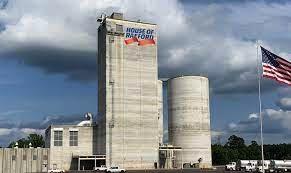 House of Raeford Farms has agreed to pay $460,000 to settle a lawsuit filed by the State of Washington alleging manipulation of prices, rigging of contracts and illegal exchange of information. House of Raeford is the 18th broiler integrator to settle, with the House of Raeford Farms has agreed to pay $460,000 to settle a lawsuit filed by the State of Washington alleging manipulation of prices, rigging of contracts and illegal exchange of information. House of Raeford is the 18th broiler integrator to settle, with the  total now $35.7 million and with individual settlements ranging from $290,000 to $11 million. Sanderson Farms, now a part of Wayne-Sanderson prevailed in a jury trial, although plaintiffs have requested a new trial. total now $35.7 million and with individual settlements ranging from $290,000 to $11 million. Sanderson Farms, now a part of Wayne-Sanderson prevailed in a jury trial, although plaintiffs have requested a new trial.
|
Brakebush Brothers Acquires Competitor
|
01/07/2024 |
|
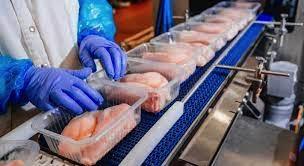 Brakebush Brothers, a food service processor located in Westfield, WI., has acquired Lake Foods of Heartwell, GA. The company produces marinated and ready-to-cook chicken products. Brakebush Brothers, a food service processor located in Westfield, WI., has acquired Lake Foods of Heartwell, GA. The company produces marinated and ready-to-cook chicken products.
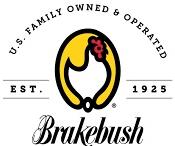
Gregory Huff, President and CEO of Brakebush stated, “we are very enthusiastic about this acquisition, the values, expertise and capabilities of Lake Foods places us in a good position to continue to grow our existing customer base”.
|
USDA-AMS Purchases
|
01/05/2024 |
|
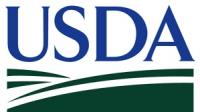 On January 5th, the USDA Agricultural Marketing Service announced purchase of 396 tons of chicken legs for child nutrition and related food assistance programs. Product was purchased at an average of 57 cents per pound with deliveries to be made during February 2024. On January 5th, the USDA Agricultural Marketing Service announced purchase of 396 tons of chicken legs for child nutrition and related food assistance programs. Product was purchased at an average of 57 cents per pound with deliveries to be made during February 2024.
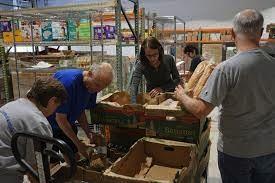
Concurrently the USDA Agricultural Marketing Service announced purchase of 8,334 tons of chilled large chicken in bulk for child nutrition and related food assistance programs. Product was purchased for an average of $1.44 per pound for whole birds with deliveries to be made during February 2024.
The two purchases amounted to $23.9 million.
|
Welfare Organizations Urge Implementation of Proposed Packers and Stockyard Rules
|
01/04/2024 |
|
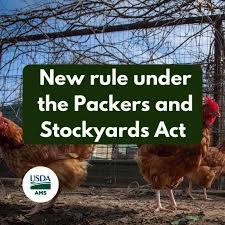 Approximately seventy organizations representing small-scale farmers, activists, trade unions and environmental groups have addressed a letter to the President urging implementation of “Rules to revitalize the Packers and Stockyards Act as a critical pro-competition law designed to protect family livestock producers from abuse in the marketplace”. Approximately seventy organizations representing small-scale farmers, activists, trade unions and environmental groups have addressed a letter to the President urging implementation of “Rules to revitalize the Packers and Stockyards Act as a critical pro-competition law designed to protect family livestock producers from abuse in the marketplace”.
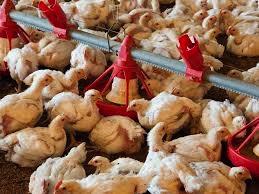
The collective groups urge stronger protection for individuals considered to be vulnerable in the marketplace. The letter supported other Administration anti-trust enforcement. The organizations expressed concern that the Fiscal Year 2024 Agriculture Rule Development and the FDA Appropriations Bill would delay or inhibit USDA action on proposed rules.
|
Rabobank Projections for 2024
|
01/04/2024 |
|
 Rabobank, with an extensive staff of analysts, has reviewed trends in the major broiler producing and consuming regions of the world. Although feed costs are expected to decline, efficiency will be necessary to maintain positive margins. Disease is the predominant risk along with geopolitical considerations including the ongoing war in Ukraine and uncertainty regarding the Middle East. Rabobank, with an extensive staff of analysts, has reviewed trends in the major broiler producing and consuming regions of the world. Although feed costs are expected to decline, efficiency will be necessary to maintain positive margins. Disease is the predominant risk along with geopolitical considerations including the ongoing war in Ukraine and uncertainty regarding the Middle East.

- Moderate expansion is anticipated in the U.S. with a continuing trend towards domestic consumption of wings and legs but with a proportional decline in breast meat resulting in accumulation of stock. Exports to Mexico and Cuba will continue but China will decline as a significant importer of U.S. products.
- Chicken production and consumption in the E.U. will persist with increased exports from Ukraine moderating prices.
- China will undergo fluctuation in demand based on the macroeconomic situation. Disease and domestic demand will be important considerations in China.
- Brazil will see a 4 to 5 percent increase in output with strong exports to China and new markets in Africa as occasioned by HPAI. Producers will benefit from lower feed costs associated with bountiful harvests of both corn and soybeans due to favorable weather conditions.
- Thailand will experience over production despite high exports.
- Japan will undergo a contraction in consumption, especially in the food service sector. Rabobank considers that demand will be influenced by price, again a result of a persistently weak Yen limiting imports.

|
KFC Resumes Sale of Chicken Wraps
|
01/04/2024 |
|
 Kentucky Fried Chicken has introduced Honey BBQ and Spicy Mac ‘n Cheese wraps offered at 2-for-$5 in January. Kentucky Fried Chicken has introduced Honey BBQ and Spicy Mac ‘n Cheese wraps offered at 2-for-$5 in January. 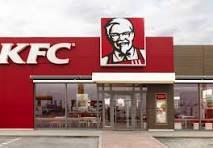 The offer is subject to a downloaded coupon through the KFC app. Most KFC locations now offer Quick Pick Up using KFC.com or the KFC app to order ahead. The offer is subject to a downloaded coupon through the KFC app. Most KFC locations now offer Quick Pick Up using KFC.com or the KFC app to order ahead.
|
Marfrig Global Foods S.A. Acquires Majority Equity in BRF S.A.
|
01/04/2024 |
|
 Following the purchase of a quarter of the equity of BRF in May 2021, Marfrig has increased its stake in the company successfully through share purchases since 2021 with a 20 percent holding in September 2023 raising the stake to 40 percent and with the latest round attaining 50.1 percent. Following the purchase of a quarter of the equity of BRF in May 2021, Marfrig has increased its stake in the company successfully through share purchases since 2021 with a 20 percent holding in September 2023 raising the stake to 40 percent and with the latest round attaining 50.1 percent.
 This action in large measure establishes the intended, but never concluded, merger that was negotiated in 2019. Currently Marcos Antonio Molina dos Santos serves as Chairman of both companies. The extent of integration going forward has not been defined but the Marfrig stated intent for the companies to operate separately sacrifices the benefits of synergy. This action in large measure establishes the intended, but never concluded, merger that was negotiated in 2019. Currently Marcos Antonio Molina dos Santos serves as Chairman of both companies. The extent of integration going forward has not been defined but the Marfrig stated intent for the companies to operate separately sacrifices the benefits of synergy.
|
Trucking Issues to be Resolved in 2024
|
01/01/2024 |
|
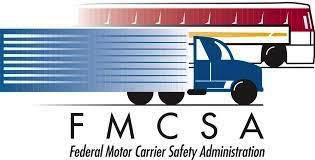 The poultry meat industry is heavily dependent on road transport for ingredients and finished product. Although some companies operate their own fleets, there is considerable reliance on the trucking industry for inputs and distribution. The poultry meat industry is heavily dependent on road transport for ingredients and finished product. Although some companies operate their own fleets, there is considerable reliance on the trucking industry for inputs and distribution.
Government regulations impact both efficiency and profitability and the important issues to be confronted in 2024 include:
- A proposed rule requiring a distinction between independent contractors and employees. Trucking companies will be required to prove that drivers are in fact independent contractors and not functioning as workers but under a differential designation.
- The Environmental Protection Agency is expected to issue upgraded emission standards for heavy-duty vehicles beginning in 2027. The Administration tilt is towards electric- powered semis that will add to capital cost.
- It is evident that there is a shortage of truck parking. The Administration intends spending $755 million in grants for this purpose although appropriations are currently in limbo in Congress.
- The Federal Motor Carrier Safety Administration is delaying action on broker transparency. Despite petitions for a rule filed in 2020 by the Owner-Operator Independent Drivers Association, the FMCSA has yet to deliver on a promise of a rule by June of 2023 and has pushed back the agenda to October 2024. This has resulted in considerable frustration and financial loss among independent owner-operators.
- The proposed compliance, safety and accountability (CSA) measurements system has yet to be finalized by the FMCSA. The final CSA will include crash preventability determination and a database. Other aspects of safety include speed limits, automatic emergency braking and the possible introduction of automated driving systems.
- Guidelines have yet to be established for the use of drugs including hair sampling as an alternative to body fluids.
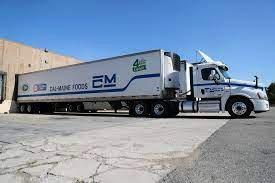
It is evident that rulemaking moves at a slow pace especially with contention among the stakeholders, intense lobbying, inactivity by Congress and the approaching General Election.

|
USDA Funds Halal Meat Cooperative in Maine
|
01/01/2024 |
|
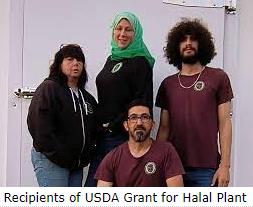 A cooperative in Maine will receive a $65,000 rural business development grant from the USDA. The intent is to conduct a market and feasibility study, provide training and technical assistance and assist producers to meet processing schedules. The grant will also provide business advice on pricing and marketing. A cooperative in Maine will receive a $65,000 rural business development grant from the USDA. The intent is to conduct a market and feasibility study, provide training and technical assistance and assist producers to meet processing schedules. The grant will also provide business advice on pricing and marketing.
The cooperative will be centered on Five Pillars Butchery a family-owned company providing halal meat in Unity, ME. The project will involve fifteen farmers many of whom comprise “indigenous and other people of color, new farmers and a cooperative of Somali women.”
If the funds are applied in accordance with sound 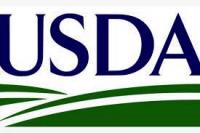 business principles the $65,000 rural business development grant will represent seed money. Future financing for this project should be provided by commercial lending institutions that will apply conventional criteria to establish the ability of the enterprise to service loans. business principles the $65,000 rural business development grant will represent seed money. Future financing for this project should be provided by commercial lending institutions that will apply conventional criteria to establish the ability of the enterprise to service loans.
Would it be too much to expect that USDA will provide a subsequent accounting of the grant and progress of the proposed cooperative to achieve financial viability.

|
Chicken Run Sequel Movie Demonizes Broiler Production
|
12/31/2023 |
|
 Twenty-two years ago, producers in the U.K. released Chicken Run. This anthropomorphic full-length cartoon was extensively viewed and became a cult classic. The influence of the movie in degrading the image of commercial poultry production was evident. The reviewer of the newly-released sequel, Chicken Run: Dawn of the Nugget admits that the movie was a factor in becoming a vegan. Obviously, a movie such as Chicken Run with images of shackles, and a rotary knife (but no stunning), will make an impression on a young mind and generate negative attitudes towards consumption of red meat and poultry. Twenty-two years ago, producers in the U.K. released Chicken Run. This anthropomorphic full-length cartoon was extensively viewed and became a cult classic. The influence of the movie in degrading the image of commercial poultry production was evident. The reviewer of the newly-released sequel, Chicken Run: Dawn of the Nugget admits that the movie was a factor in becoming a vegan. Obviously, a movie such as Chicken Run with images of shackles, and a rotary knife (but no stunning), will make an impression on a young mind and generate negative attitudes towards consumption of red meat and poultry.
The successor movie is also heavy on sentiment and provides an unrealistic and negative image of the industry in addition to the theme that indirectly encourages violent opposition to production in the style of Direct Action Everywhere. The dialogue deviates into pre-slaughter fear and its effect on meat quality.
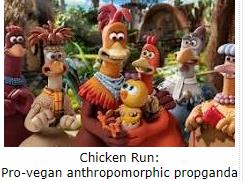
The Chicken Run movies are less entertainment than they are pro-vegan propaganda. In the opinion of the reviewer of the movie, those involved in writing the script included too many subplots that serve as a distraction. Despite the vegan proclivities of the reviewer, the movie “leaves a lot to be desired”. Hopefully, Chicken Run: Dawn of the Nugget will have a short run and will be soon forgotten.

|